After Rebasing, NBS Puts






LAUNCH OF MOMAH’S BOOKS...
and Director-General, Centre for
and
NNPC Recorded N905bn Profit in June, Federation Remittances Hit N6.96tn in 5 Months
Says review of Port Harcourt, Warri, Kaduna refineries still in progress
Emmanuel Addeh in Abuja
The Nigerian National Petroleum Company Limited (NNPC) yesterday announced a Profit After Tax (PAT) of N905 billion for its June operations, a drop from the N1.054 trillion recorded in the previous month of May.
However, the national oil company posted statutory payments of N6.961 trillion to the federation between January and May 2025, up from the N5.583 trillion it remitted from January to April this year.
Besides, the NNPC, in its Monthly Report Summary for June released last night, announced a total revenue of N4.571 trillion in June, down from the N6.008 trillion earnings which it made in the May 2025 reporting circle.
But crude oil and condensate production rose from 1.629 million barrels per day in May to 1.68 million during the period under consideration, showing an increase of 51,000 bpd between May and June this year.
In the same vein, natural gas production was 7.581 billion
standard cubic feet per day (scf/d) in June, up from 7.352 billion scf/d in May and 6.615 billion scf/d in February, indicating a steady rebound in output.
Petrol availability in NNPC stations was 71 per cent in June, up from 62 per cent in May, while the critical gas infrastructure, OB3 remained at 96 per cent completion, unmoved from the preceding month and AKK pipeline hit 83 per cent completion from 81 per cent reported previously.
Upstream pipeline availability was down a notch from 98 per cent in May to 97 per cent in June.
In terms of current strategic efforts, it said: “Ongoing industrywide collaborations are increasingly improving synergies to achieve production improvement and cost optimisation.
“AKK successfully completed the AKK River Niger Crossing which significantly derisked the completion of the mainline.
Additional intervention is being put in place to ensure earliest completion.
“(We) commenced technical
review of OB3 River Niger crossing to replicate learnings from AKK River Niger crossing success.”
However, on the status of the refineries, it stated that review
of the Port Harcourt, Warri and Kaduna refineries was still in progress.
On its Corporate Social Responsibility (CSR) activities, the
NNPC added: “The Financial Literacy Programme for Batch A, Stream 2 NYSC corps members was successfully conducted on Sunday, 15th June 2025 via
online streaming, reaching 67, 544 participants across the 36 states and the FCT, bringing the cumulative number of corps members trained under the programme to 870,383.”
Wale Edun to Deliver Keynote Address at Agora Policy Dialogue on LG Reforms
Ndubuisi Francis in Abuja
Minister of Finance and Coordinating Minister of the Economy, Mr. Wale Edun, will today deliver the keynote address as top policymakers, academics, and members of civil society gather in Abuja to deliberate on how to improve the performance and relevance of Nigeria’s 774 local councils.
Convened by Agora Policy, a Nigerian think-tank, the policy conversation was designed to review the implementation of the Supreme Court judgement on financial autonomy of the local government
US Threatens Life Ban for Visa Fraudsters
Michael Olugbode in Abuja
In a stern warning issued by the US Mission Nigeria on its X page, the United States has threatened to ban for life anyone caught committing visa fraud.
The message read: “US government interagency efforts combat fraud and will end illegal immigration. Those who commit visa fraud will be banned from the United States for life.
“A nation without borders is not a nation. We will pursue criminal charges against those who engage in visa fraud and those who bring in and harbor illegal aliens.”
The latest is part of ongoing clampdown on immigrants and intending migrants to US. The US government had earlier threatened to impose tariffs on “Any country aligning themselves with the Anti-American policies of BRICS” Trump made the statement while
BRICS leaders and associates met in Rio de Janeiro, Brazil for the 2025 summit.
The US government had also made public reduction in visa validity for most nonimmigrant U.S. visas in Nigeria and other countries, stating that: “The reduction in validity is part of an ongoing global review of the use of U.S. visas by other countries using technical and security benchmarks to safeguard U.S. immigration systems.
councils one year after the ruling. The landmark judgement, which also mandated that the councils be run by elected officials, was delivered by the Supreme Court on July 11, 2024, in a case instituted by the federal government.
According to the founder of Agora Policy, Waziri Audio, “One year is a good time to take stock and to start thinking about far-reaching reforms aimed at ensuring that our local councils are well positioned to discharged their constitutional responsibilities and meet the expectations and needs of our citizens.”
The policy conversation is supported by MacArthur Foundation and is organised by Agora Policy in partnership with the African Cities Research Consortium (ACRC), The Cable Newspapers, and Centre for Fiscal Transparency and Public Integrity (CFTPI).
Apart from Edun, other guest speakers expected at the event include Dr. Kole Shettima of MacArthur Foundation, Professor Diana Mitlin, the CEO of ACRC; Professor Remi Aiyede of the University of Ibadan; Ms. Deborah Isser of the World Bank; Ms. Cynthia Rowe of the British High Commission; and Ms. Ojobo Atuluku, Chair of Agora Policy.
The event will also feature a panel session to dissect the progress and challenges with the implementation of the Supreme Court ruling and to provide pathways for more effective, responsive and accountable local administration in the country.
The panellists are National President of the Association of Local Governments of Nigeria (ALGON); Chairman of the Forum of Finance Commissioners and Commissioner for Finance and Economic Development in Ekiti State, Mr. Akintunde Oyebode; Secretary General of Women’s Rights Advancement and Protection Alternative (WRAPA), Hajia Saudatu Mahdi; Executive Director of Yiaga Africa, Mr. Samson Itodo; and Executive Director of CFTPI, Dr. Umar Yakubu.
The panel will be moderated by Ms. Nancy Illoh-Nnaji, host of “Moneyline with Nancy,” a television programme.
A statement issued by the organisers said the overall goal of the dialogue was to get critical stakeholders to focus on the imperative of roots and branch reforms at the local level and how to make them happen.
The statement added, “This is the second policy conversation by
Agora Policy on local government reforms. Supported by MacArthur Foundation and organised in partnership with five other civil society organisations, the first conversation was held on 5th August 2024, less than a month after the Supreme Court ruling.
“The theme of the event was: ‘Enthroning Accountability in Local Governance in Nigeria.’” Agora Policy had also commissioned and published two policy papers on how to deepen local governance and local democracy in the country. The papers were:
“Beyond Financial Autonomy—the Imperative of Moving from Local Government to Local Governance in Nigeria,” published on August 9, 2024; and “Why Credible Elections Matter for the Revival of Local Democracy in Nigeria,” published on April 27, 2025. Both papers were written by Remi Aiyede, a professor of political institutions, governance and public policy at the Department of Political Science, University of Ibadan.
During the Tuesday event, Aiyede will set the scene for the event and the panel session. He will speak on “Reflections on Five Decades of Local Government Reforms in Nigeria.”
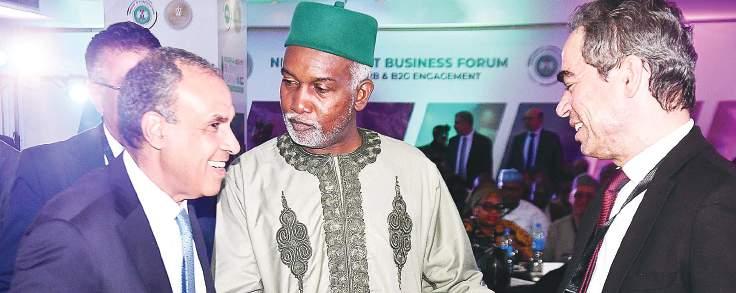
NIGERIA-EGYPT BUSINESS FORUM...
Minister of Foreign Affairs, Arab Republic of Egypt, Badr
Foreign
Abdul Samad Rabiu Predicts Improved Stability in Foreign Exchange Amid N92 Billion Loss
Reiterates commitment to lower cement prices Commends Cardoso over FX reforms
James Emejo in Abuja
Chairman, BUA Cement Plc, Abdul Samad Rabiu, yesterday, disclosed that the company recorded N92 billion in Foreign Exchange (FX) losses in the 2024 financial year. Rabiu said the losses arose from its expansion drive amid major Naira devaluation, when the exchange rate hovered between N450 and N600 per dollar.
During the firm’s expansion efforts, there was need to import its equipment from various parts of the world, a move that exposed it to volatility in the sector, he said.
Speaking at the company’s 2024
Annual General Meeting (AGM) in Abuja, the BUA chairman, however, expressed optimism that current policy reforms in the FX segment would limit the deficit in 2025.
He said, “In 2023, we had to account for N69 billion in FX losses. In 2024, it was N92 billion. But I don’t think 2025 will be as high, and that’s one of the reasons our results going forward will be better.
“I must commend management—they’ve done very well. Many companies in Nigeria posted losses, but BUA still posted a profit, albeit marginal - N69 billion to N70 billion.”
He specifically commended
Governor of the Central Bank of Nigeria (CBN), Mr. Olayemi Cardoso, for sanitising the FX market and allowing the Naira to be determined by forces of demand and supply, thereby, addressing issues around arbitrage and others underhand dealings that impacted the real value of the local currency.
Rabiu said, “If you’re starting a $5 million project, for example, suppliers—mostly from China— usually require a Letter of Credit (LC) or some financial guarantee to ensure payment. So, what we did was open LCs. At the time, the exchange rate was N400–N500 to the dollar.
“But these projects often take two to three years, and by the time the LCs matured, FX unification had occurred, and the rate had shot up. That’s why we incurred FX losses—we had to pay in dollars, but at a higher rate than when the LC was originally opened.
“We’ve addressed most of the FX exposure, and operationally we’re improving. This year will definitely be better. As the MD mentioned earlier, our Q1 2025 result showed a post-tax profit of N81 billion—more than our total profit for all of last year.
“We expect the Q2 result to be similar. If we annualise that, we’re
Oyedele: With Current Tax Reforms, Nigeria Would Have Achieved $1trn Economy 10 Years Ago
Chairman, Presidential Fiscal Policy and Tax Reforms Committee, Mr. Tayo Oyedele, yesterday said if Nigeria had adopted the current reforms 10 years ago, it would have achieved the $1 trillion economy.
Speaking at PwC’s “Executive Summit on Nigeria’s Tax Reform” in Lagos, Oyedele stated that Nigeria before May 2023 had problems with the exchange rate management. He maintained that if the federal government had sustained fuel subsidy payment, Nigerians could have found it difficult to buy a litre of Premium Motor Spirit. (PMS) with N10,000, and the system could have collapsed.
Oyedele said the Nigerian economy was on the road to joining the likes of Zimbabwe and Venezuela if some of the reforms by President Bola Tinubu were not done in the past two years.
He stated, “If some of these reforms done in the past two years ago were implemented, I tell you authoritatively that Nigeria’s $1 trillion economy is guaranteed and the price of PMS will be under N300 per litre because the foreign rate will be under N300 against the dollar.
“We’ve done this analysis over the last 10 years, comparable balance of payment between Nigeria, Kenya and South Africa. Yet, Naira has lost six and half times more value than Kenya’s Shilling and South
Africa’s Ryan.
“If only we had maintained that level of stability as those two other countries, Nigeria will be a $1 trillion economy. What that means is that the size of the middle class will probably be 10 times what it is and every single investor will take us seriously.”
Oyedele stated that 97 per cent of the federal government’s revenue went into debt service, as tax-to-GDP ratio was under 10 per cent.
He said the tax reforms by Tinubu became most significant and consequential since Nigeria’s independence, stressing that South Africa and Rwanda have gone ahead of Nigeria in revenue generation.
“In Nigeria, we have what it takes in terms of human capacity, knowledge and skills. We’re missing the political will, until we found it. The reforms have been painful but they’re beginning to yield positive micro results,” he said.
According to him, with the declining budget deficit, Nigeria is now spending more on infrastructure and the tax-to-GDP ratio has moved from under 10 per cent to 13.5 per cent in two years of Tinubu’s administration.
Oyedele further disclosed that service debt was now under 50 per cent in two years, from 97 per cent.
“We no longer print money to spend. Rather we pay down half of the Ways & Means the past administration printed,” he said.
He argued that the tax reform
was not about the government generating more revenue, stressing that tax reforms are the consequence of economic activities.
On the higher exemption threshold for small businesses, he said, “We have been told this story for so long. It turns out that story is not valid. What you see around most countries, particularly where you have inequality, like Nigeria, you will find out that the top 12 per cent pay more than the 99 per cent at the top.”
He added that the tax reforms expected to commence January 2026 aimed at propelling further and faster economic activities.
“Businesses, households and individuals will benefit. The government will benefit also. We can build a prosperous Nigeria together. I can tell you, from what I have seen, that better days are ahead of us,” he added.
Speaking earlier, Regional Senior Partner, PwC West Market Area, Mr. Sam Adu, said the 2025 Tax Act introduced significant reforms to the tax ecosystem.
Adu stated, “In fact, Nigeria has just completed the most ambitious overhaul of its tax system in decades. In our history, perhaps this is the most ambitious overhaul of any tax system anywhere in the world.
“So, this is significant, not just about compliance, it’s about creating a fairer, more transparent and more growth-oriented tax system for
businesses and individuals.”
He added, “Across the world, we are seeing smarter taxation and this shift is driven largely by technology, sustainability, cross border cooperation and geopolitics.”
looking at around ₦250 billion after tax this year. That improvement is largely because we no longer have substantial FX losses, and management is working hard to reduce operational costs.”
On the rising prices of cement in the country, despite assurance from manufacturers to consumers, Rabiu said in spite of higher production costs, the product was still sold at reasonable prices.
The average retail price of a bag of cement is currently N10,000.
He said, “We’re trying to maintain a price per ton that’s reasonable—around $100–$110. Globally, that’s not considered high. A decade ago, cement in Nigeria was over $250 per ton.
but we’ve also had currency devaluation—or what I’d prefer to call FX unification. So, despite all that, cement prices here haven’t risen disproportionately.
“People focus on the naira price, but we’ve also had currency devaluation—or what I’d prefer to call FX unification. So, despite all that, cement prices here haven’t risen disproportionately.
“It comes down to the cost of production. If your production cost
is high, there’s no way to maintain low retail prices. Consider what we face—FX, energy costs (which are paid in dollars) among others.
“The good news is that the exchange rate is stabilising. Today, it’s around N1,529. At one point, it was nearly N3,000. Let me take a moment to commend the government.
“The exchange rates we had in the past—N500 or N600—were artificial. Very few companies could access that rate. In reality, you’d often end up paying close to N1,000.
“Things are different now. I joke that I’ve only met the current CBN Governor twice since his appointment—because I no longer need to lobby the Central Bank every two weeks for FX, unlike before. Now, banks have FX and the rate is the same for everyone.
“That’s a real market, and as FX rates continue to drop—hopefully to N1,200 or lower—you’ll see prices for cement and other commodities drop too. Food prices are already coming down: rice has gone from N100,000 to N60,000 per bag.”
NiDCOM to Launch Housing Platform to Attract Nigerians in Diaspora to Invest in Property
Michael Olugbode in Abuja
Nigerians in Diaspora Commission (NiDCOM) has concluded arrangements to launch the Diaspora Home and Abroad Platform to help Nigerians abroad to seamlessly invest in property in the country.
Chairman/CEO of NiDCOM, Hon. Abike Dabiri-Erewa, said the platform will be launched during the sixth edition of National Diaspora Day, holding on July 25 and 26 in Abuja.
Dabiri-Erewa revealed that no fewer than 1,200 physical participants and thousands of virtual attendees from around the world were expected to participate in the 2025 NDD.
She said the platform was designed to provide Nigerians living abroad with safe, reliable, and accessible housing options.
The NiDCOM chairman said this year’s celebration was geared
towards real, practical engagement with Nigerians abroad.
She said, “In 2024 alone, Nigerians in the diaspora sent home over $20 billion, more than the country’s foreign direct investment.”
Dabiri-Erewa stated, “But beyond the numbers is a wealth of knowledge, skills, and global exposure that we must now channel into nation-building.”
She added that this year’s theme, “Optimising Formidable Diaspora Potentials for National Development and Growth,” reflected the need for action, not just talk, in harnessing diaspora contributions.
She revealed that in a show of growing global interest, a group of 25 African American visitors will also join the Abuja celebration, highlighting renewed connections between Nigeria and the historic African diaspora.
Dabiri-Erewa stated that NiDCOM’s focus in recent years
had been to deepen structured diaspora engagement through initiatives, such as Diaspora Focal Point Officers in states, National Diaspora Policy, Nigeria Diaspora Investment Summit (NDIS), and the ongoing Diaspora Data Mapping, as well as constant engagements. She said as part of the celebration, a Youth Empowerment Summit will also take place, focusing on STEM (Science, Technology, Engineering, and Mathematics) as a key driver of development. Students from 14 schools across Abuja will participate.
Chairman of the Local Organising Committee, Mr. Abiodun Akanbi, confirmed that over 500 young people will attend the STEM summit, which formed a key part of the overall programme. Other highlights of the two-day hybrid event included plenary sessions, investment fora, and strategic networking.

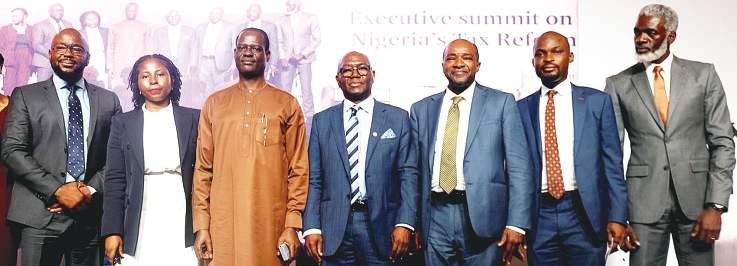
PWC EXECUTIVE SUMMIT ON TAX REFORM...
L-R: Partner, Tax and Regulatory Services Leader, PwC
Uwaegbute; Partner, PwC Nigeria, Ms. Esiri Agbeyi; Chairman, Presidential Fiscal Policy and Tax Reforms Committee, Mr. Taiwo Oyedele; Executive Chairman, Lagos State Internal Revenue Service, Mr. Ayodele Subair; Chairman, Nigerian Economic Summit Group (NESG), Mr. Olaniyi Yusuf; Managing Director/CEO, Ardova, Mr. Moshood Olajide; and Country Senior Partner, PwC Nigeria, Mr. Sam Abu, at the PwC Executive Summit on Nigeria’s tax reform held in Lagos, yesterday
Bilateral Trade: Nigeria Partners Egypt, Eyes
$500bn Target of D-8 Leaders by 2030
As 30 top Egyptian company executives visit Nigeria for investment opportunities
As the only two African members of the Developing-8 Organisation for Economic Co-operation (D-8), Nigeria and Egypt have concluded plans to contribute actively to the D-8 Leaders’ ambitious target of increasing intra-D-8 trade to $500 billion by 2030.
Areas of focus will include solid minerals and renewable energy, agriculture and water management, ICT, aviation, pharmaceuticals, manufacturing, garment industry and leather, as well as tourism.
Minister of Foreign Affairs, Yusuf Tuggar, stated this yesterday in Abuja during his keynote address at the second edition of Nigeria-Egypt Business Forum.
Relatedly, Nigeria’s foreign investment drive received a boost, as executives of 30 biggest companies in Egypt were currently in the country searching for areas they could invest.
The Egyptian Minister of Foreign Affairs, Immigration and Expatriates, Badr Abdel Aaty, gave the information in Abuja on Monday after a meeting with his Nigerian counterpart, Tuggar.
Tuggar said both countries were witnessing dynamic shifts in industrialisation, infrastructure development, digital innovation, and human capital growth, and
the forum presented a golden opportunity to align their respective strengths with shared needs across the various sectors of the economy.
He raised concerns that despite the significant potential, bilateral trade between Nigeria and Egypt within the framework remained notably low, with total trade volume at approximately $211.2 million in 2023.
According to him, “Egypt’s exports to Nigeria were estimated to be $199 million, while Nigeria’s exports to Egypt were only about $12.2 million. Given this vast, under-utilised market and the current trade imbalance, Nigeria and Egypt must actively contribute to the D-8 Leaders’ ambitious target of increasing intra-D-8 trade to $500 billion by 2030.
“With a combined population of over 1.2 billion people (approximately 15 per cent of the world’s population) and a total nominal GDP estimated at over $5 trillion as of 2024, the group holds immense market potential.
“Nigeria and Egypt are the only African members of the Developing-8 Organisation for Economic Co-operation (D-8), with membership spanning three continents.”
Abdel Aaty said, “The D-8 is a unique intergovernmental organisation whose objective is to improve its members’ positions in
the global economy, create new opportunities in trade relations and provide a better standard of living for its people”
He stated that Nigeria and Egypt shared a history of diplomatic relations rooted in mutual respect, African solidarity, and common aspirations for economic advancement and regional stability.
He said the recent elevation of the relationship between the two countries to a “comprehensive partnership also signifies our continued commitment to intensifying
cooperation along the same lines.”
Abdel Aaty stated that as two of Africa’s most influential nations, the partnership had the potential to shape the future of intra-African trade and cooperation as already, “We have a combined population of 345 million or about a quarter of the continent’s population.”
He said, “Today’s forum should therefore not be regarded as a ceremonial event; rather, it is a strategic platform to unlock the vast potential within our countries.”
The D-8 comprises Bangladesh,
Egypt, Indonesia, Iran, Malaysia, Nigeria, Pakistan, and Türkiye.
Abdel Aaty, who led the delegation of investors to Nigeria, listed agriculture, pharmaceuticals, industry, energy, mineral, oil and gas as some of the areas of interest to the investors.
He stressed that there were a lot of opportunities, with a conducive environment for investment.
Abdel Aaty, who was in Nigeria for the second time in his short spell as minister, also assured Nigeria of their seriousness to invest and
do business in the country to the mutual benefits of both countries.
He said, “For me, I’m heading a big delegation. We have more than 30 giant companies in Egypt, in different sectors, in agriculture, in pharmaceuticals, in industry, in energy, in mineral, oil and gas, you name it.
“They are here because there are a lot of opportunities, a conducive environment for investment and we are committed to come, to invest, to do business here based on a win-win situation.”
Oil, Gas Suppliers Reject Direct Distribution of Petroleum Products to End Users
Say it threatens oil industry jobs
Emmanuel Addeh in Abuja
The Natural Oil & Gas Suppliers Association of Nigeria (NOGASA) yesterday raised strong objections to the recent plan announced by the Dangote Refinery to supply petroleum products directly to end users and bypass the traditional distribution chain.
In a statement in Abuja, NOGASA’s President, Benneth Korie, voiced concerns that the move could
National Assembly Denies Receiving Petition Against UBEC Executive Secretary
House of Representatives Committee on Basic Education and Services, and its Senate counterpart have denied receiving any report of infraction against Executive Secretary of the Universal Basic Education Commission (UBEC), Aisha Garba. The denial came on the heels of a recent publications in some sections of the media purporting that the committee was investigating reports of violation of the UBEC Act brought against the executive secretary.
Reacting to the report in a press release made available to THISDAY, Chairman of the House Committee on Basis Education and Services, Hon. Mark Useni, described the report as false and misleading.
Useni stated that the media report was a deliberate act of misinforming Nigerians and the world at large about the activities of the National Assembly, and the education committee, in particular. He maintained that the National Assembly had not received any report of alleged acts of infraction of the UBEC Act or maladministration by the executive secretary of the commission.
A member of the House Committee on Universal Basic Education and Services, Hon. Philip Agbese, representing Ado/Okpokwu/ Ogbadibo Federal Constituency of Benue State, while speaking on the side-lines of a joint legislative retreat on the UBE Act Amendment Bill 2025 in Lagos last Thursday, was reported to have said that key
provisions of the UBEC Act were being violated through unilateral decisions.
But Useni stressed that the headline of the story was intended to mislead the public into believing that Agbese’s remarks were the official position of the National Assembly Committee on Basic Education.
Useni explained, “The committee, together with its Senate counterpart, was in Lagos from Thursday, 17th to Sunday, 20th July, 2025, for a joint legislative retreat which strictly focused on the clause-by-clause consideration of the reports on the proposed amendment to the UBE Act.
“The retreat was collaborative, constructive, and centred on strengthening the legal framework for basic education in Nigeria.
significantly disrupt the oil and gas industry, putting thousands of jobs at risk and jeopardising the existing business models of suppliers nationwide.
The Dangote Refinery had announced plans to begin direct supply of petroleum products to end users effective August 15, 2025, revealing that it would deploy 4,000 new Compressed Natural Gas (CNG)-powered tankers.
The management of the refinery added that this will ensure the nationwide distribution of Premium Motor Spirit (PMS) or petrol and diesel directly to marketers, petrol dealers, manufacturers, telecom firms, aviation companies, and other large consumers, bypassing traditional
depots and intermediaries.
However, Korie argued that Dangote’s decision to supply products directly to large organisations such as telecommunications giants and hotels, will mark a notable shift in the sector.
He stated that members of NOGASA, who serve as intermediaries between refineries and final consumers, fear that this new distribution model will render their roles obsolete.
“This is the new trend in the oil and gas industry, where Dangote is now supplying products directly to end users, especially MTN, companies, hotels, and all the rest of them.
Korie elaborated on the potential consequences, highlighting that many NOGASA members and their employees could lose their jobs. The redundancy of trucks, drivers, and other logistical staff, he said, looms as a direct result of the bypassed supply chain. This, according to the association, would have a ripple effect not just on the livelihoods of their members, but also on the Nigerian economy in general.
“It will remove jobs from a lot of them and some of our staff will be redundant, some of our trucks will be redundant,” Korie warned.
Members of NOGASA are suppliers of petroleum products. By doing so, a lot of jobs are at stake and we are kicking against this new way of supplying products to end users,” Korie stated.
Build Internal Capacity for Adoption, Implementation of NSIB Safety Recommendations, Badeh Tells Agencies
Kasim Sumaina in Abuja
The Director General/CEO, Nigerian Safety Investigation Bureau (NSIB), Capt. Alex Badeh Jnr, yesterday urged the Nigerian Maritime Administration and Safety Agency (NIMASA), Nigerian Ports Authority (NPA), Nigerian Shippers Council, National Inland Waterways Authority (NIWA), National Oil Spill Detection and Response Agency (NOSDRA), and the Nigerian Railway Corporation (NRC) to begin proactively building
internal capacity for the adoption and implementation of NSIB safety recommendations.
He also reaffirmed the Bureau’s commitment to improving transportation safety across all modes in Nigeria, including air, marine, rail, and land transport.
He added the Bureau is working towards creating a unified culture of safety through a standardised, independent, and forward-looking investigative approach.
Badeh Jnr., in a statement Monday by the Director, Public Affairs and
Family Assistance, NSIB, Mrs. Bimbo Olawumi Oladeji, stressed the goal is not merely to investigate accidents, but to ensure that every finding and every safety recommendation becomes a cornerstone for safer transportation in Nigeria.
“With its expanded mandate as enshrined in the NSIB Act 2022, the Bureau is pioneering a new era of multimodal safety oversight, underpinned by globally recognised investigative practices and a clear mission: to prevent accidents by learning from them.
Mohammed Babangida: I Have Agreed to Serve as BOA Board Chairman
Deji Elumoloye and Laleye Dipo in Minna Mohammed Babangida, son of ex-military president, General Ibrahim Badamasi Babangida (rtd.), said he had decided to serve as Chairman, Board of Directors of Bank of Agriculture.
President Bola Ahmed Tinubu had appointed Babangida into the position last week.
Reacting to a currently circulating letter that he had
A FT er r eb ASI n G
James Emejo in Abuja
National Bureau of Statistics (NBS) yesterday released the much-awaited rebased Gross Domestic Product (GDP) estimates, pegging nominal GDP at N372.82 trillion (about $243 billion) as at 2024, reflecting a yearon-year increase of 18.30 per cent in nominal terms.
Nigeria is now Africa’s fourth largest economy after South Africa, $410.34 billion, Egypt $347.34 billion, and Algeria $268.89 billion.
NBS also disclosed that the economy grew by 3.13 per cent in the first quarter of the year (Q1 2025).
Addressing journalists at the public release of the results of the rebasing exercise in Abuja, Statistician General of the Federation (SGF)/Chief Executive, NBS, Prince Adeyemi Adeniran,
Enugu Electricity Regulatory Commission (EERC) to its customers after it slashed tariff from N209 to N160 per kilowatt hour.
The Gencos expressed concern that this tariff issued by EERC has set a precedent for all other states, explaining that from their tariff order, only N45 naira is captured for generation cost out of N112, portending a bigger issue in the decentralisation of power or electricity to the subnational governments.
Stressing that there is no federal government policy on subsidies, the Gencos described it as debt accumulation, stressing that although the Gencos’ monthly generation invoices average about N250 billion, the federal government budgeted only N900 billion for the whole of 2025, which is not even cash-backed until now.
“This is a huge contagion that needs to be dealt with but at the presidency level. Recall that Gencos are currently owed about N4 trillion (N2 trillion for 2024 and N1.9 trillion in legacy debts, that is, 2015-2024,
N324.47 billion on Wednesday July 16th, 2025, has brazenly affronted Laws and Regulations of the Federal Republic of Nigeria put in place for good governance and transparency as follows:
*The Nigerian Exchange Limited (NGX)*
Disclosure of Beneficial Ownership
• Any person acquiring 5% or more of a listed company’s shares (directly or indirectly) must be disclosed. Disclosure must include: identity of the beneficial owner; shareholding category (e.g., director, substantial shareholder, insider); and whether the holding is direct or via a trustee/nominee.
Material Transaction Disclosures
• The NGX requires timely and comprehensive disclosure of any transaction that involves a significant volume of shares or may materially impact investor perception or market price. Partial or delayed disclosure violates the principles of fair, orderly, and efficient markets.
*Securities and Exchange Commission (SEC)*
Rule on Issuers’ Disclosure Obligations
• Listed companies must disclose
turned down the appointment, Babangida, through one of his media aides, Alhaji Mahmud Abdullahi, said the letter in circulation “is a concocted letter from disgruntled elements”.
He stated, “I have accepted the appointment. I am ready to serve as the chairman of the Board of Directors of the Bank of Agriculture.”
He expressed gratitude to Tinubu for deeming him worthy of the position and promised to put in his best
said the outcomes reflected changes in economic reality.
Adeniran cautioned against politicising the new figures.
Essentially, the exercise changed the base year used for calculating economic activities to 2019 from 2010.
As a result, post-rebasing, GDP at market prices increased by 41.7 per cent to N205.09 per cent in 2019, from N54.2 trillion (prior to rebasing), and rose to N213.64 trillion in 2020; N243.30 trillion in 2021; N247.23 trillion in 2022; N314.02 trillion in 2023; and N372.82 trillion in 2024.
In real terms, GDP grew -6.96 per cent in 2020 (COVID-19 year); 0.95 per cent in 2021; 4.32 per cent in 2022; 3.04 per cent in 2023; and 3.38 per cent in 2024, Adeniran stated.
According to the results, the informal sector contributed N86.85
with an accumulated debt of N1.2 trillion for first half of 2025 alone.
“ There are no workable solutions, including cash payments, financial instruments, and debt swaps in sight at the moment. The 2025 government budget allocates only N900 billion, raising concerns about its adequacy to cover arrears and future deficits.
“The power generated by Gencos has continued to be consumed in full without corresponding full payment,” said Ogaji, who is the Executive Secretary of the Association of Power Generation Companies (APGC).
According to Ogaji, despite meeting and exceeding its available generation capacity requirement, Gencos have never received 100 per cent payment, never had sufficient and guaranteed gas supply by the offtaker; has never been paid as and when due and has never been protected from grid inefficiencies.
Besides, the Gencos argued that they are not protected from forex volatility notwithstanding the aggravated effects of inefficient grid
material facts fully, frankly, and without omission. The SEC holds issuers accountable for any attempt to suppress, misrepresent, or under-report major transactions.
The use of indirect vehicles (e.g., trustees, bridge holders) does not exempt issuers from disclosure obligations.
*Bank and Other Financial Institutions Act (BOFIA) 2020*
Section 7 – Acquisition of Significant Shareholding
• Any person or entity acquiring 5% or more of the shares in a bank or bank holding company must obtain prior written approval from the Central Bank of Nigeria (CBN). Approval is required again at higher thresholds: 10%, 20%, 25%, 50%, and 75%. Acquisitions made through nominees, proxies, trustees, or other indirect structures (such as a ‘Bridge Holder’) fall under this provision. So far, First Holdco plc has not demonstrated compliance with this provision to the NGX
Section 9 – Notification of Shareholding
• Once a 5% stake is acquired, both the acquiring party and the institution (FirstHoldCo) must formally notify the CBN of the
to transform the organisation for the overall interest of the nation.
In the “fake letter”, titled, “Declining Appointment As Chairman Bank of Agriculture,” it was claimed that Babangida, “After careful reflection and consultations” had “decided with utmost respect to decline the appointment”.
The false communication continued, “The decision was not made lightly; it stems from a convergence of personal and
trillion or 42.5 per cent to overall economy.
Adeniran said the economy was dominated by the services sector, which accounted for 53.09.per cent post-rebasing, compared to 52.60 per cent prior to the exercise.
However, it is unclear if the new GDP numbers reaffirmed Nigeria as Africa’s leading economy, as NBS does not rank countries.
Following the rebasing of GDP using 2019 as the base year, the economy grew by 3.13 per cent year-on-year in real terms in Q1, compared to 2.27 per cent in Q1 2024.
According to GDP estimates for Q1, 2025, aggregate GDP at basic price stood at N94.05 trillion in nominal terms, compared to N79.51 trillion in Q1 2024, representing a nominal growth of 18.30 per cent. Real GDP
operations which have increased their machine maintenance costs with over 90 per cent of their operational cost in dollars.
As of today, the power generation companies stated that over 50 per cent of their capacity is not being enjoyed by consumers due to constraints at the transmission and distribution subsector, hampering Gencos’ operations.
“At the inception of the Transitional Electricity Market (TEM) in 2015, commitments were made to ‘guarantee’ Gencos’ full payment of their invoices, underpinned by security deposits which the Distribution Companies (Discos) were meant to provide, to cover monthly shortfall in payments.
“Gencos relied on this supposed guarantee and payment assurance to increase their investment in additional capacity. Sadly, as of today, the payment assurances and supposed guarantees, whether from Nigerian Bulk Electricity Plc (NBET) or Discos are not in place with resultant dire consequences for Gencos, the entire power sector
change in shareholding structure. Again, First Holdco plc has not demonstrated this compliance to the markets
Section 27 – Disclosure and Transparency
• Financial institutions must disclose: their beneficial ownership structure; all related-party transactions; and any information that may materially affect stakeholders. Failure to provide full and frank disclosure is considered a violation of the Act.
Section 45 – Insider Lending and Conflicts of Interest
• Requires disclosure and regulatory approval for any transaction involving directors, officers, or related parties, especially if it affects control or ownership.
Section 65 – Prohibition on Lending Against Own Shares
• Explicitly prohibits any bank granting loans or advances secured by its own shares. Any funding or financing arrangement involving the purchase of FirstHoldCo shares using credit from FirstBank would violate this section. In line with the constitutional rights of the Nigerian media to ask questions , report facts and seek clarity where matters involving
professional considerations which at this time would not allow me to serve with the level of focus and commitment the position demands.
“Your Excellency I remain fully committed to the vision of a prosperous and self-sufficient Nigeria under your leadership.
“I continue to hold your administration in the highest regard and stand ready to support national development in other ways where my expertise may be of service.”
stood at N49.34 trillion.
In the quarter under review, the economy was driven mainly by the services sector, which recorded a growth of 4.33 per cent and contributed 57.50 per cent to the aggregate GDP.
The non-oil sector grew by 3.19 per cent in real terms, and contributed 96.03 per cent to GDP in Q1, compared to 97.20 per cent in the preceding quarter and 95.98 per cent in Q1 2024.
On the other hand, the oil sector’s contribution to real GDP rose to 3.97 per cent in Q1 from 2.80 per cent in Q4 2024, but lower than 4.02 per cent in Q1 2024.
The country’s average daily oil production increased to 1.62 million barrels per day (mbpd), compared to 1.54 mbpd in the preceding quarter,
and the Nigerian economy,” the statement said.
As good corporate citizens, Ogaji stated that Gencos have made large-scale investments in the power sector with associated business risks while fulfilling their obligations as stipulated in the terms and conditions and guidelines contained in the various industry agreements and have continued to add capacity, despite the difficulties being faced by them.
The statements added that Gencos continue to bear all the sector risks, including: Unutilised capacity, as even the declared capacity is ignored and not fully utilised; non-adherence to the contract and conditions of services as well as grid instability and high-frequency challenges.
Besides, they listed risks of lenders and banks’ pressure, including host community restiveness as well as instances of overloaded lines, noting that due to aged and weak transmission and distribution system, generated power is rejected or forced to be reduced to match distribution infrastructure.
shareholders are opaque, other Nigerian media outlets have reported the following by FirstHoldCo Plc in its lack of transparency and full disclosure of it recent share sale to a trustee it described as a “Bridge Holder“ of FirstHoldCo Plc.
1. The Guardian: “Otedola Tightens Grip on First Bank with 40% Stake Acquisition”
2. BusinessDay: “Otedola Buys Out Otudeko, Increases Stake in First Bank to 36.7%.”
3. MoneyCentral: “Otedola Increases FirstHoldCo Stake to 40% with Buyout of Otudeko.
4. Punch: “ First Holdco’s N323.4bn Share Transaction Sparks Speculation over Otedola’s Stake”
5. Daily Independent: “First Holdco N1 Trillion NPLs Cast Shadow Over Otedola’s Takeover
In a July 18th letter written to the Chief Executive Officer of the NGX Regulation Ltd, FirstHoldco Plc referenced BusinessDay Newspaper’s reporting of the opaque off-market transaction.
So, why is First Holdco Plc singling out ARISE/THISDAY media group for such intimidation in an attempting to gag the press and evade accountability?
The Nigeria media has only asked
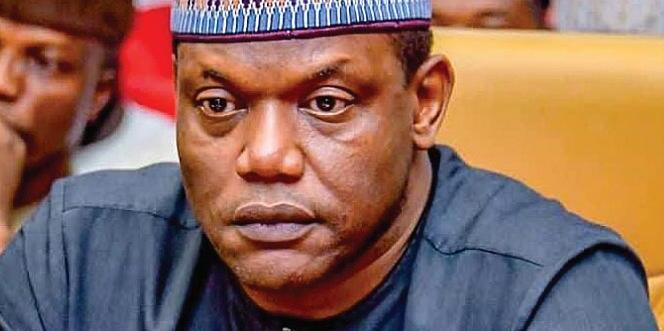
and 1.57 mbpd recorded in same quarter of 2024.
NBS said the real growth of the oil sector stood at 1.87 per cent year-on-year in Q1, compared to 4.71 per cent in the corresponding quarter of 2024.
Agriculture recorded modest growth of 0.07 per cent in Q1 2025, improving from a 1.79 per cent contraction in Q1 2024.
The sector contributed 23.33 per cent to aggregate GDP in real terms in Q1, lower than 28.68 per cent in the preceding quarter and 24.04 per cent in Q1 2024.
Manufacturing’s contribution to real GDP stood at 9.62 per cent in Q1, compared to 7.62 per cent in 2024 and 9.76 per cent in Q1 2024.
Overall, the results of the rebasing from 2019 to 2024 and estimates for Q1 2025, reflected the evolving economic structure.
The contribution of crop production stood at 17.58 per cent, ranked highest, followed by trade 17.42 per cent, real estate 10.78 per cent, overtaking crude oil (5.85 per cent).
Services led broad sector classification at 53.09 per cent, followed by agriculture 25.83 per cent.
Adeniran stressed that the rebasing of the economy was largely necessitated by economic dynamics, which changed continually with innovation and new technologies that altered the production and consumption patterns of individuals, households, firms, and government.
He said given those changes, it was only right that the parameters used to estimate the size, structure, and movements in the economy were updated periodically, to ensure an accurate and realistic picture of the economy.
Adeniran stated, “This is why statistical offices worldwide undertake the process of rebasing. This is not a Nigerian affair; it is a global practice, conventionally done every five years, of course, depending on resource availability and the technical capacity of the statistical office.
these questions because First Bank has not complied with Nigerian laws regarding full disclosure.
For instance, it has reported a N324.47 billion share acquisition of 10.4bn shares off market, but when it came to disclosure, it disclosed only N195 billion on the stock exchange contrary to Nigerian stock exchange rules that requires frank and full disclosures and no omission of facts that could disadvantage investors.
In asking these questions, First Bank has disclosed that there is a “Bridge Holder” confirming ARISE and THISDAY reports that the share acquisition was held by a trustee.
A bridge holder, as described by First Bank, in simple language, is a trustee which was confirmed by the Attorney General to be Stanbic IBTC Bank.
So who is this bridge holder?
How much are they holding? Who provided the funds which markets are claiming to be First Bank. Can they deny or confirm this?
Especially under the BOFIA Act, which says no bank shall grant any loans or advances on the security of its own shares. There are also Prudential Regulations on credit facilities granted by any bank to single borrowers or groups of related borrowers.
“It is also essential to state that the conduct of this exercise is not instituted or directed by the government to fulfil any set target or objectives.
“This is merely a routine activity, as I mentioned earlier, one that NBS undertakes in fulfilment of our mandate and as a responsible producer and manager of official statistics in Nigeria.”
He said, “The process of conducting this rebasing exercise, just like any other, requires a massive amount of granular data, and I am proud to say that this one is by far the most comprehensive of any rebasing exercise conducted by the bureau.
“For those who can recall, when presenting the results of the 2014 rebasing exercise, with a base year of 2010, the bureau mentioned that two major activities were missing: the Business Sample Census and the Agriculture Sample Census.
“Under this round, however, not only have both censuses been conducted, but other notable data collection activities have also been carried out. This includes the Nigerian Living Standards Survey, which provided data on Households operating non-farming enterprises.
“Other data collection activities include the National Agricultural Sample Survey, the Annual Business Establishment Survey, the Revised Nigerian Labour Force Survey, and a range of administratively sourced data from Ministries, Departments, and Agencies of the government.” He said the rebasing exercise, not only involved the change in the base year, from 2010 to 2019, but also included methodological updates based on best practice and official statistical guidelines.
Adeniran said, “It is only by undertaking this rigorous process in our national accounts’ compilations that NBS, as the authoritative source of official statistics in Nigeria, can confidently say that our numbers represent the best estimates of the actual size and structure of the Nigerian economy.”
First Bank is also required by law to follow both CBN regulations and FCCPC rules. So far, these transactions have not demonstrated compliance with these rules.
And it is the constitutional duty of the media to ask questions. And that is what we are asking. So instead of hiding and trying to intimidate the press and bully its practitioners, what we require is full disclosure from First Bank in line with Nigerian laws for market confidence. This especially at this time when the CBN has gone above and beyond to return the financial markets to orthodoxy and ended forbearance Finally, FirstHoldCo refers to an unrelated transaction by a related entity: General Hydrocarbons Ltd claiming falsely that it’s being owed. First Bank used GHL assets to secure its loan of $400m from AMCON and has not paid nor has it met FBN’s commitments to GHL. FBN went to court 3 times before Justice Alagoa, Justice Dipeolu and Justice Obile, all of the Federal High Court and lost all three cases to GHL. The case now in arbitration.
Signed: The Boards of Editors THISDAY & ARISE Media Group Lagos Nigeria
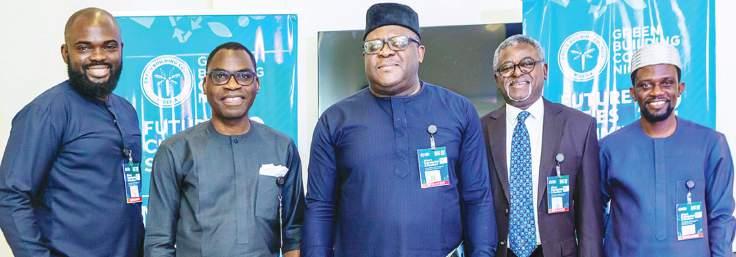
THIRD EDITION OF FUTURE CITIES SUMMIT...
L-R:
Food Basket: Lagos Launches N500bn Agric Initiative on Food Sufficiency
Segun James
As part of efforts to ensure food sufficiency in the state, the Lagos State government will launch a N500 billion “Produce for Lagos” flagship agricultural programme designed to reshape the country’s food distribution and security landscape. The Commissioner for Agriculture and Food System, Ms. Abisola Olusanya, who revealed the initiative
during a press briefing at Alausa, Ikeja, yesterday, said the programme, slated for launch on Wednesday, July 23, was aimed to connect agricultural producers from across Nigeria with Lagos – one of Africa’s largest and
most dynamic food markets.
The programme, being implemented in collaboration with some states and private sector organisations, would help to block loopholes causing increments in food prices.
FG Moves to Improve Capacity of Gynaecological Health Workers
Expand training to six states
Onyebuchi
The federal government said it is collaborating with development partners to implement a health workforce training initiative aimed at scaling up the quality of gynaecological care across Nigeria.
It said the Gynaecological Health programme which began as a pilot initiative in two states - Kano and Abuja - is now being expanded to cover six states, one in each of the six geographic zones of the country.
Addressing participants at the commencement of the One Day Essential Gynecological Skills (EGS) Dissemination Workshop in Abuja, the Head of Safe Motherhood, Federal Ministry of Health and Social Welfare, Dr. Saidu Abdulhadi, said the event was meant to disseminate information on the document titled ‘Essential Gynecological Skills”, which was developed by the Federal Ministry of Health in collaboration with other stakeholders.
Among the stakeholders involved in the implementation of the training initiative funded by the UK government are the Royal College of Obstetricians and Gynaecologists, London, the Society of Gynaecology and Obstetrics of Nigeria (SOGON), ACEPHAP and the Government of United Kingdom.
Saidu Abdulhadi said the federal government is seeking to take the health workforce training programme down to the local levels so there will be maximum impact.
“This is part of efforts to strengthen skills of our health workers, especially at the secondary and primary health care level, so that they can provide skill sets.
“We focus on usually obstetrics, but this is the first time we’re developing a document targeting gynecological skills, to be precise,” he said.
Under the programme, various expert trainers were made to acquire to more gynaecological skills from
each of the three pilot states.
Speaking on the objectives and progress made at the implementation of the initiative, a Professor in Obstetrics and Gynecology at Aminu Kano Teaching Hospital and Director of African Center of Excellence for Population Health and Policy - a research centre at Bayero University in Kano, Prof. Hadiza Galdanci, said the programme is targeted at training multidisciplinary frontline healthcare providers including; nurses, midwives and community health workers.
She said gynecological cases were usually neglected, adding that cases such as vaginal fistula are often not attended to.
“We have about 2 million people across mainly Asia and Africa. Majority of them are in African countries like Nigeria, as well as cervical cancer. 90 percent of cervical cancer cases are in low middle-income countries like Nigeria. And 90 percent of them come at a very late stage that we
FG to Launch National Policy to Plug Revenue Leakages, Boost Transparency
Sunday Aborisade in Abuja
In a move to enhance transparency, block revenue leakages, and improve trade efficiency, the federal government has reaffirmed its commitment to the immediate implementation of the National Single Window (NSW) initiative, a flagship policy of President Bola Tinubu’s administration.
The Minister of Finance and Coordinating Minister of the Economy, Mr. Wale Edun, disclosed this yesterday during an appearance before the National Assembly Joint Committee on Customs and Tariffs.
He stated that the government was determined to modernise trade operations, improve customs revenue, and bring informal transactions into the formal economy.
Edun said, “We will soon implement one of the legacy projects of His Excellency, Mr. President, and that is the National Single Window. It will address trade facilitation, port community systems, and block leakages in revenue. This system will bring speed and efficiency to international trade transactions and complement other economic reforms.
“The National Single Window is
a digital trade facilitation platform that aims to integrate all government agencies involved in the trade process. When fully operational, it is expected to significantly reduce processing time for cargo clearance, enhance transparency, and increase government revenue.”
According to the minister, improving customs efficiency is critical to shoring up non-oil revenue.
He noted that the Nigerian Customs Service (NCS) remains a vital contributor to the Federation Account, and increasing its performance is a national priority.
can’t do anything about it.
“So, because of these conditions, we decided that a lot of skills we have in identifying these gynecological cases and treating them and therefore we decided to train healthcare workers across Nigeria.”
According to her, the training programme was first rolled out in Kano and Abuja as a pilot scheme and later Enugu State.
Galdanci said that due to the success rate recorded by the training programme whose manual has been endorsed by the federal government for similar capacity building training nationwide.
Olusanya said since the last six years the plan to have a Lagos that was food-secured, as the largest market for sub-Sahara Africa, had been in the pipeline.
To achieve the goal, the commissioner explained there were two approaches: Produce in Lagos and Produce for Lagos.
As regards “Produce in Lagos”, she highlighted a number of agricultural initiatives already in place to address food shortages, such as Ounje Eko, trader money, and food hubs, among others.
She said the “Produce for Lagos” initiative was tailored towards collaboration, as the state was disadvantaged with regard to landmass.
Olusanya explained that “Produce for Lagos” focused on external partnership.
She stated, “We need states, like Niger, that has largest arable land in the country, as well as Kebbi. We want to have continuous food supply.
The partnership will dovetail to all the agricultural food chains.”
She added that the launch would address the production, marketing, distribution and logistics challenges.
Olusanya said, “It is going to be a legacy for us; we want to minimize post harvesting losses.
“By bridging the gap between supply and demand, the initiative promises to usher in smarter logistics,
inclusive economic growth, and a more resilient food value chain.
“A collaborative effort between the Lagos State Government and the Lagos Food Systems Infrastructure Company, ‘Produce for Lagos’ is being positioned as a model for public-private partnerships in addressing systemic food challenges and driving sustainable development at scale.”
The commissioner cited a situation where almost half truckloads of tomatoes got rotten before landing in Lagos, which, according to her, contributed to food shortages and eventual exorbitant prices.
Olusanya said, “It is about addressing logistics. It has effect on prices. Or goal is to continue to create jobs. We want food inflow into the state. Though food is coming into Lagos but the system is flawed. We have a lot of loopholes in the system and so the investors cannot connect properly.
“The programme will not only streamline agricultural supply but also unlock investment opportunities, support rural farmers, and ensure Lagos residents have access to fresh and affordable produce.
“As the countdown continues, citizens, producers, and investors alike are being called to join the movement and become part of a transformative shift in Nigeria’s agricultural future.”
Bioresources Devt Centre Enjoys Facelift, as New Director Seeks Collaborative Partners
Olusegun Samuel in Yenagoa
Established in 2003, the Bioresources Development Center, Odi, Bayelsa State, was to cater for biodiversity services in Agriculture, Nutrition, Health and Industry in the Niger Delta region, but the center after billions of naira were used to procure state-of-the-art equipment has been lying desolate and unused.
The once globally recognized bioresource facility and grassroot empowerment centre with notable achievement in patents, research driven innovations and high impact scientific publication has been comatose since 2015, with some of the equipment now becoming obsolete and rotting away.
A visit to the facility by our correspondent shows recent attempts to bring the place back to its old glory under a new coordinator/ Director, Dr. Wood Timipanipiri, the first Niger Deltan to head the center since creation.
Dr. Timipanipiri, who took our correspondent round the facilities, promised to champion the rescue of the center, adding that the decay of the facilities was as a result of the Covid 19 epidemic, the floods and one year strike action embarked by Academy Staff Union of Nigeria University (ASUU) and Academy Staff Union of Research Institute (ASURI), which the workers belong to.
However, he said plans are in motion to sustainable regig the centre as he has begun a facelift of the centre while calling on other agencies like the Niger Delta Department Commission (NDDC), the Nigeria Content and Development Board (NCDMB) and other agencies including oil companies, state and federal government to join hand in meeting the noble goals of the center.
He said: ‘For the past 20 years or more, we have been training people in all these bio-enterprises.
People have come to this centre and after the training, they have established their own facility and they are doing very well.
“We have worked with the Bayelsa State Government in training Bayelsa youths in various agro-enterprises, we have worked with Shell, we have worked with PAP, we have worked with NDDC and we even have MOUs with close to six to seven universities within the Niger Delta axis.
“So, our focus is to be able to bring wealth creation to the people, job creation to the people, affordable health care, using this local bioresources.
We actually have, five major bio-enterprises in this centre. One is the mushroom production technology, we have the grass cutter production technology, we have the aquaculture unit, we also have the snailries, and then we have the poultry. So, these are some of the bio-enterprises we have right now.”
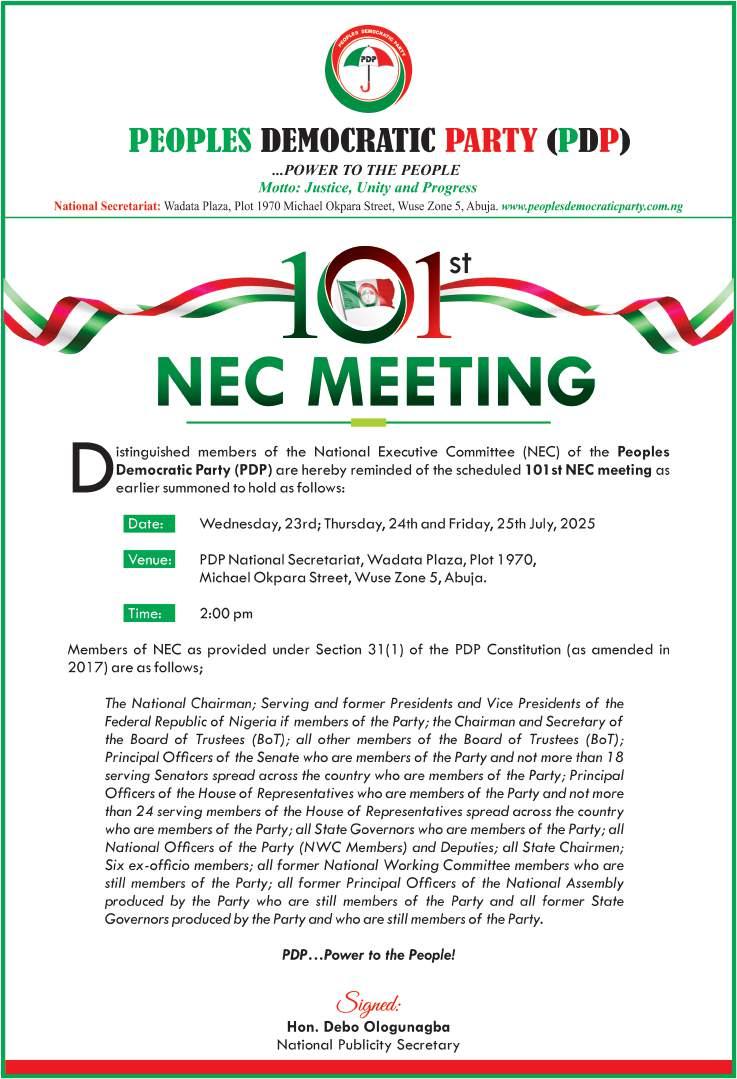
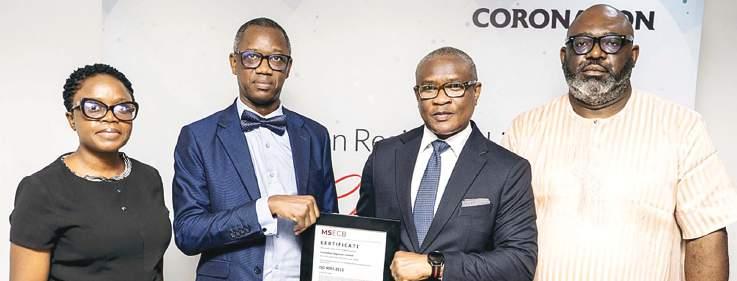
L-R: Chief Operations Officer, Digital Jewels, Mr. Kunle Sadare; Group Executive Director/CTO, Digital Jewels, Mr. Tokunbo Taiwo; Managing Director/CEO, Coronation Registrars Limited, Mr. Oluseyi Owuturo; and Senior Manager, Fintech and Innovation, SEC Lagos Zonal Office, Mr. Obinna Egbuniwe, at the official presentation of the
PSC Approves Elevation of 12 Commissioners,
Deputies, 27 Assistants to Next Ranks
The Police Service Commission has approved the promotion of twelve Commissioners of Police to the next rank of Assistant Inspectors General.
The Commission also approved the promotion of 16 Deputy Commissioners to substantive Commissioners and 27 Assistant Commissioners to Deputy Commissioners.
A statement by the Head of Press and Public Relations, Ikechukwu Ani, noted that one Assistant Commissioner was absent for the exercise and was not promoted.
He said the Commission also approved the promotion of 145 Chief Superintendents of Police to Assistant Commissioners, which included General Duty Police Officers and specialists such as officers from the Airwing, medical doctors, dentists, pharmacists, lab scientists, physiotherapists, and nurses. Others, he said, are priests and aircraft engineers.
According to him, “Twenty-nine Superintendents of Police, all specialists (Info-Tec, Works, and AFIS), were also promoted to the next rank of Chief Superintendents of Police. The Commission also approved the promotion of 38 Deputy Superintendents (Specialists) to the next rank of Superintendents.
“The twelve Commissioners of Police promoted to the rank of Assistant Inspectors General of Police are Johnson Oluwole Adenola, current Commissioner of Police, Oyo State, former Principal Staff Officer to the
Inspector General of Police, and also former Deputy Commissioner Operations, Delta State Command; and Ako Benedict Gabriel, current CP Anti-Fraud; Ahmadu Tijani Abdullahi, CP Jigawa State.”
Other are: “Emmanuel Adegbola Aina, acting AIG Intelligence, Force Intelligence; Omolara Ibidun Oloruntola; Hassan Abdu Yababet, CP, Police College Jos; Bretet Emmanuel Simon, CP Taraba; Enyinnaya Inonachi Adiogu, CP FCID, Gombe Zonal Command; Aminu Baba Raji, CP Special Unit, FCID, Alagbon; Mohammed Mu’azu Usman, CP Eastern Ports, Port Harcourt; Festus Chinedu Oko, acting AIG DLS Department, Force Headquarters; and Ronke Nurat Okunade, Special Fraud Unit FCID Annex Lagos.”
Ani said the 16 Deputy Commissioners promoted to full Commissioners are Uduak Otu Ita, Sheikh Mohammed Danko, Charles Ezekwesiri Dike, Nnana Oji Ama, DC Intelligence FCID; Gabriel Onyilo Eliagwu; Abiola Reuben Olutunde; Yakubu Useni Dankaro; Michael Adegoroye Falade; Aina Adesola; and Umar Ahmed Chuso.
“Others are Emefile Tony Osifo; Innocent Ilogbunam Anagbado; Musa Mohammed Sani; Victor Avwerosuo Erivwode, DC SEB, FCID; Omoikhudu Philip; and Sylvester Edogbanya.
“The 27 Assistant Commissioners of Police elevated to the next rank of Deputy Commissioners are Shehu Idris, David Adio Alalada, acting DCP Admin, Enugu State Com-
mand; Dalhatu Basher; Hamzat Tambai; Abdulkarim Nuhu, Area Commander Port Harcourt; Olufemi Akinwale Akinola; Sani Fudaiku Kura; Yakubu Isah; Isa Abubukar Adamu; Sunday Omonijo; and Sunday Akinlolu Okunola.
“Others are Abimbola Shafkat Abdulraheem; Adekunle Murisiku Tokosi; Ibrahim Sumaila Musa; Mohammed Jega Musa; Musa Jibril; Ali Isa Gumel; Dankal Umar Bello; Suleiman Ladi Abdullahi; Suleiman
Sade; Ahmed Ataka Tanko; and Shehu Aliyu. ACP Ndidiamaka Alifi Oguamalam, Police College Ikeja; Magawata Mode; Adedeji Adeniyi; Bello Zaurah Tukur; Mohammed Muntari Mati; and Mohammed Ajose were also promoted to Deputy Commissioners of Police.
‘Zubairu Maina, Olufikayo Abimbola Fawole, Stephen Olusola Olatise, Buhari Abdullahi, and Akaniyere Etuk were some of the Chief Superintendents promoted to the next
rank of Assistant Commissioners. Others include Lateef Jaiyeola, CSP Admin, Force Education; Agbemoroti Clement Oloruntoba, acting ACP Admin Zone 17 Akure and former DPO Bode Osi Olaoluwa, Osun State; Magaji Kabomo Mohammed, IGP Monitoring Unit; Chinedum Aniagbaso, ICT Force Headquarters; Abdullahi Mohammed Deba, Gender Unit, Force Intelligence; Mohammed Sani Idris, Commander SPU Base 7 Abuja; Barau Dalhatu Bafarawa
FCID; and Ugwuodo Chika, Homicide section, FCID Abuja. Adeoye Benjamin Oyekunle, acting ACP X Squad, Akure Ondo State Command; Sani El-Mustapha, CRU, Force Headquarters; Sani Mohammed Babainna; and Olabode Olawole of the Airwing Unit were among others.” He stated that the successful officers underwent examination and interview sessions conducted by the Commission.
Tinubu Rejoices with Ex-FHA MD, Senator Gbenga Ashafa, At 70
Deji Elumoye in Abuja
President Bola Tinubu rejoiced with former Managing Director/ Chief Executive Officer of Federal Housing Authority, Senator Gbenga Ashafa, as he clocked 70 today.
A chieftain of All Progressives Congress (APC), Ashafa represented Lagos East Senatorial District in the National Assembly from 2011 to 2019. As Chairman of Senate Committee on Land Transport, Ashafa made significant contributions to the advancement of legislative frameworks that facilitated the revitalisation of
Nigeria’s railway sector.
The president, in a release issued by his Adviser on Information and Strategy, Bayo Onanuga, acknowledged Ashafa’s dedication and contributions to the progress of APC, a party that prioritised the welfare and advancement of all Nigerians.
Tinubu also noted the senator’s commitment to community develop- ment and humanitarian initiatives that had positively impacted many lives.
Recalling his working relationship with Ashafa, Tinubu stated, “As Governor of Lagos State, I appointed Ashafa as Executive Secretary of the Land Use and Allocation Committee in 2001, entrusting him with the critical responsibility of land allocation and management in the state. I found him worthy again and appointed him
Permanent Secretary of the Lagos State Lands Bureau in February 2005.
“His wealth of experience, exemplary public service, and leadership qualities—demonstrated over the years as a seasoned civil servant, politician, and public officer—make him an invaluable asset to our country.
“I pray that Almighty God will grant him a long life filled with good health, peace, and continued service to humanity.”
Tinubu also congratulated his Senior Special Assistant on Public Engagement, Frederick Nwabufo, on his 40th birthday, today.
The president joined the Nwabufo family, friends, and associates in celebrating an incisive writer, journalist, and communications specialist.
Tinubu recalled Nwabufo’s
dedicated service during the 2022–2023 presidential campaign under the Public Affairs Directorate of the Tinubu-Shettima Presidential Campaign Council, where he distinguished himself admirably. He commended the celebrant for his leadership as Convener of Journalists for a United Nigeria (JUN), his unwavering belief in Nigeria’s unity, and his advocacy for causes that reflected his patriotic convictions. As a firm supporter of youth participation in governance, the president expressed confidence that Nwabufo will continue to serve the country and the media profession with courage, boldness, and innovation.
Tinubu extended his best wishes and prayers to Nwabufo on this significant birthday milestone.
Enumah
The Supreme Court has affirmed a judgment of a Court of Appeal, which ordered the retrial of a man, Yahaya Ibrahim, convicted and sentenced to death for culpable homicide by a Kano State High Court.
A five-member panel of justices of the apex court in a unanimous judgment, held the lower court was in order in arriving at the decision for the retrial of the appellant.
Meanwhile, the apex court in the lead judgment delivered by Justice Tijjani Abubakar JSC, dismissed Yahaya’s appeal against the Appeal Court’s decision for lacking in merit.
The apex court held the Appeal Court sitting in Kaduna was “right in so holding and ordering that the appellant be made to face a fresh trial
to offer his plea since his plea was not taken on the amended charge.”
The panel therefore dismissed Yahaya’s appeal filed by his lawyer, Emmanuel Ekpenyong, seeking his discharge of the offences charged at the Kano State High Court, upon the appellate court’s judgment that he was not properly arraigned.
At the High Court, Yahaya was charged alongside eight other coaccused persons on a three-count charge of conspiracy, culpable homicide punishable with death and causing hurt.
The state had alleged the suspects, on or about November 3, 2011, at about 2230hrs at Garin Babba Village, did commit culpable homicide punishable with death, in that they caused the death of one Alhaji Sabo Jae by attacking him while he slept,
with sticks and swords with the intention of causing his death.
The offence is said to be punishable under Section 221 of the Penal Code (Cap 105) Laws of Kano State of Nigeria, 1991. They were also alleged to have, on or about November 3, 2011, about same time, attacked and beat one Idris Muhammad Jae as a result of which he sustained serious injuries.
The offence is said to be contrary to Section 241 (g) of the Penal Code Cap 105) Laws of Kano State of Nigeria, 1991.
At the trial, the prosecution called a total number of four witnesses who testified as PW-1 to PW-4 respectively, and tendered 10 exhibits.
On the part of Yahaya, a total of 12 witnesses were called in defence of his case.
Francis Sardauna in Katsina
The Director-General of the National Pension Commission (PenCom), Ms. Omolola Owoloworaran, has vowed to expand the Micro Pension Scheme implemented by late President Muhammadu Buhari in 2019.
Owoloworaran, who disclosed this on Monday shortly after she condoled with Buhari’s family in Daura over his demise, said she owed the former Nigerian leader a duty to build and expand the
She explained that later President Buhari launched the
Scheme and ensured all Nigerians, particularly the less privileged have access to their living wage.
She said: “We owe it to him now that he is gone, to ensure that we expand the micro pension scheme to build on the vision that he helped to implement in 2019, ensuring that there is fairness in the pension system.”
The PenCom DG, however, described late President Buhari
as one of the most honest Nigerian politicians who served the country diligently, with integrity and honour.
She stressed that Buhari’s death is a national loss because he was a great leader and “a treasure to this great nation” who transformed the Nigerian pension industry and other spheres of the country. “I always say he is one of the most honest politicians this country has ever had. He was a great leader. In PenCom in particular, he did a lot to support the pension industry.

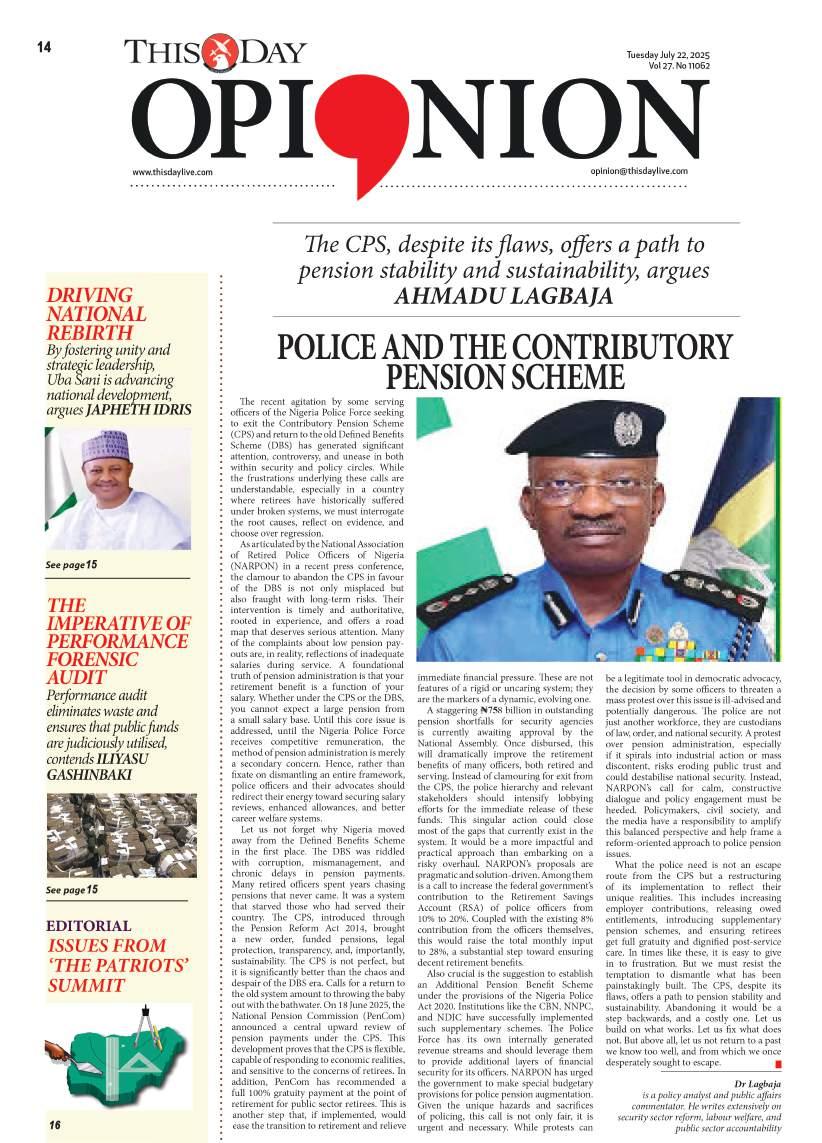
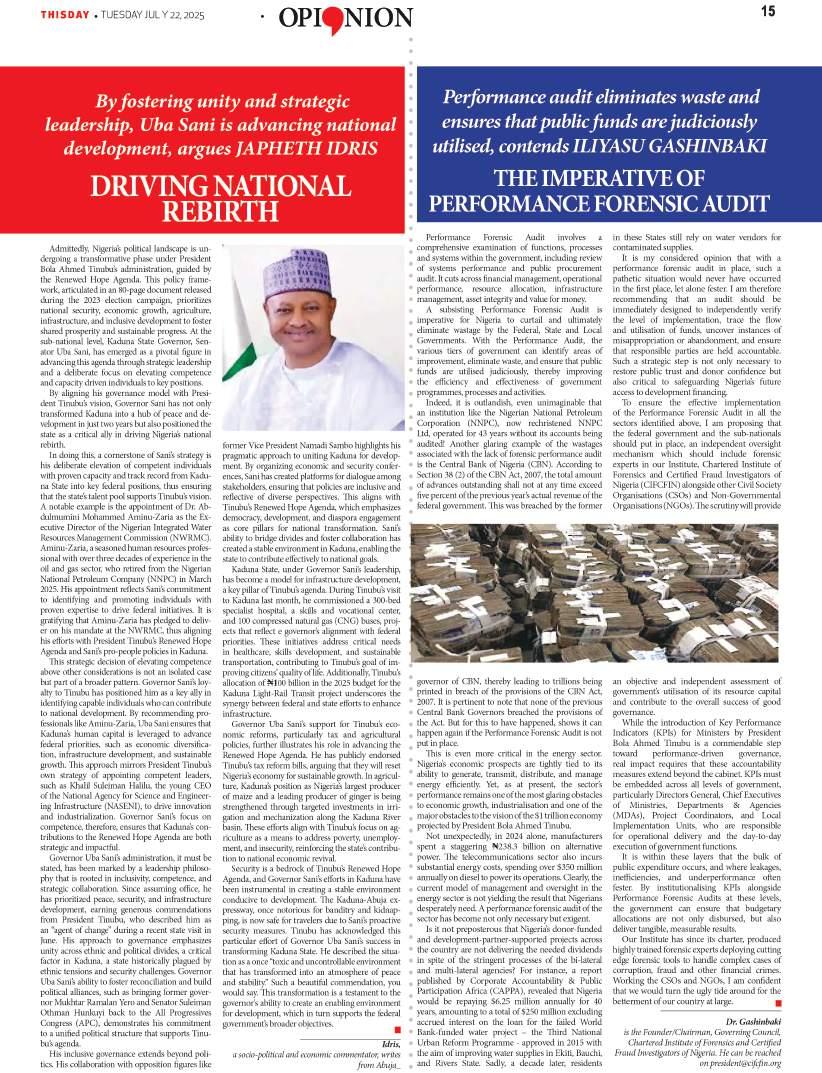
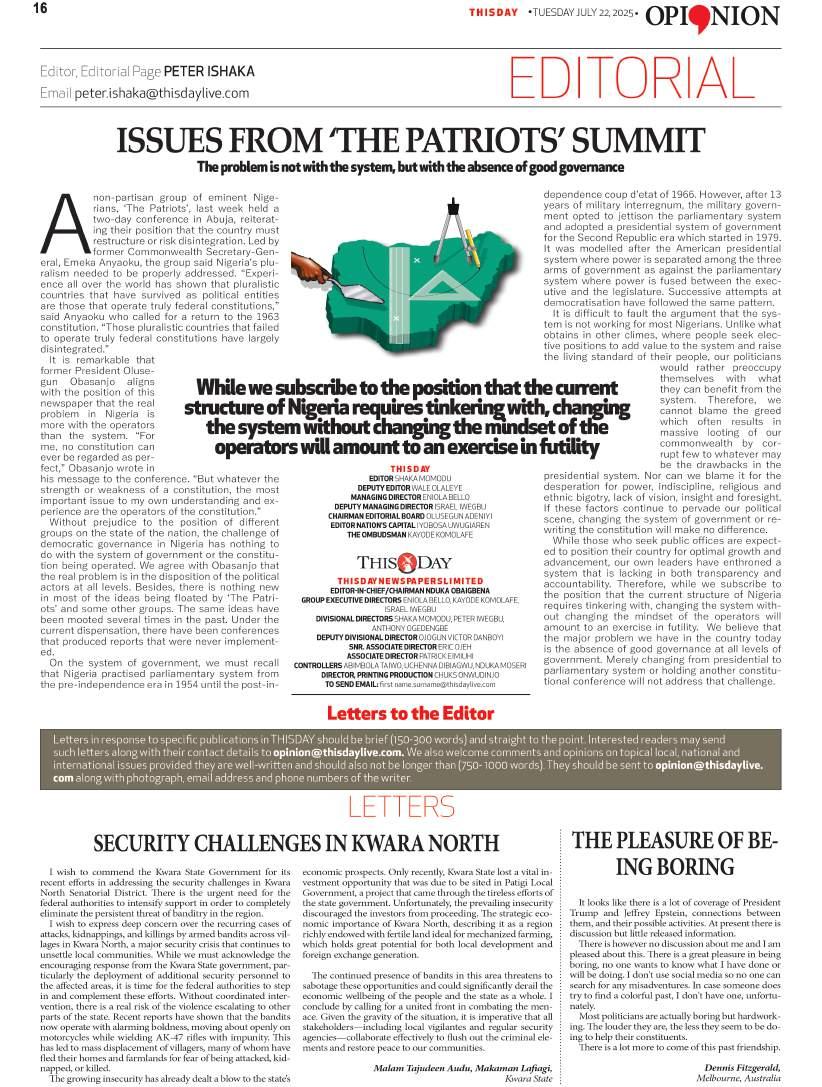
LAWYER
TUeSday, J U ly 22, 2025
Chairman, 2025 NBa annual General Conference Planning Committee, dr emeka Obegolu, SaN
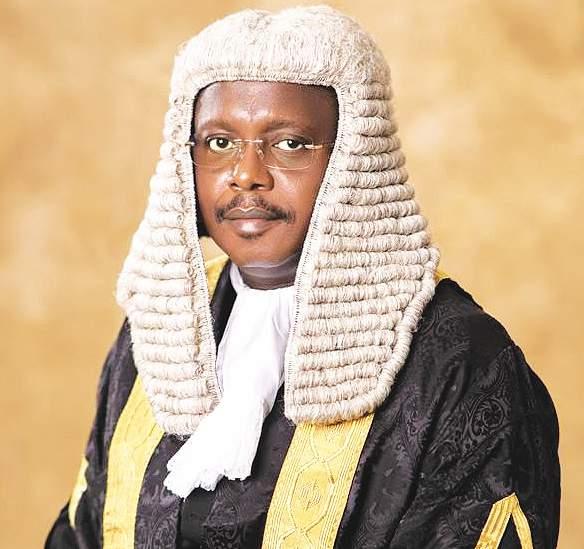







Quotable
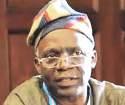
‘We cannot operate a democratic system of government, where the courts will not make pronouncements on very serious infractions of the Constitution. Otherwise, we are going to be in a crisis. Take for example, the USA, President Donald Trump would have turned that country into a complete third world nation, but for the intervention of the courts’. - Femi Falana, SAN, Human Rights Activist and Lawyer
columnist

PROF MIKE OZEKHOME, CON, SAN, FCIArb, PH.D. LLD Constitutional Democracy, means a system of government, in which political and governmental power, is defined, limited and shared by a grundnorm called the Constitution, which provides inbuilt checks and balances.
This column seeks to fiercely discuss constitutional, legal and political issues, with a view to strengthening, deepening and widening the plenitude and amplitude of democracy and good governance, without fear or favour.
The writer of this column, Prof Mike Ozekhome, SAN, is a Constitutional Lawyer, Human Rights Activist, Pro-Democracy Campaigner, Notary Public and Motivational Speaker. He co-founded the Civil Liberties Organisation (CLO), Nigeria’s pioneer human rights league, on October 15, 1987, the Universal defenders of Democracy (UDD), in 1992, and with Chief Gani Fawehinmi and others in 1998, the Joint Action Committee of Nigeria (JACON), to push out the military. In his early days, he lectured at the University of Ife. Prof Ozekhome is an author of many books. He is also a Special Counsel at the International Criminal Court (ICC), at The Hague.
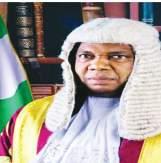
Materiality of Omission of Particulars of an Offence in a Charge
Page IV

‘Credibility
of Judiciary Now Under Severe Strain’, Uzoani, SAN
Page V
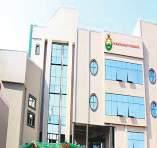

Trespassing: FG to Pay NSE N100m Damages
Page V
Court Orders Final Forfeiture of Drug Kingpin’s Victoria Island Hotel, Vehicles, and Electronics
Page V
onikepo braithwaite: editor, jude igbanoi: deputy editor, peter taiwo, steve aya: reporters
How Police Become Tools of
Section 1(a) of the Minor Offences (Miscellaneous Provisions) Act 1989 (MOA) abolished the offence of wandering, while Section 1(b) thereof prohibits the detention of a person accused of a simple offence, either by the Police or in prison custody.
Section 2 of the MOA defines a simple offence as one that is declared by law to be a simple offence, or an offence which is punishable by less than 6 months imprisonment. So, how is it possible that, to date, the Police still arrest people for wandering? They also make arrests based on spurious complaints that reveal no offence under the law, and can’t sustain a criminal charge. If the law does not permit a person to be detained on the allegation of committing an offence that carries less than 6 months imprisonment, how then, can it be acceptable to arrest or detain a person for something that doesn’t constitute a known offence under the law?
Section 36(8) of the 1999 Constitution of the Federal Republic of Nigeria (as amended)(the Constitution) prohibits this.
The sum and substance of this issue of arrest and unlawful detention by the Police and agencies such as the EFCC, is that people now use these law enforcement agencies as a substitute or replacement for settling civil matters, instead of the institution of civil legal proceedings. This means that Nigerians, especially those who may be ‘strong people’ do not have a high regard for the rule of law, or that the system has somewhat failed, or a combination of both.
In Skye Bank Plc v Njoku & Ors (2016) LPELR-40447 (CA), the Applicant had filed an application to enforce his fundamental rights, because the Bank had used the Police to detain him and sign cheques to them in a matter of debt recovery, a purely contractual matter. Also see Ogbonna v Ogbonna (2014) LPELR-22308 (CA). I am not aware that indebtedness to the Bank on a loan transaction, is an offence. The essence of arresting a person, is to take them into custody and then charge them for whatever offence they are alleged to have committed. We begin to see the flaws and abuse of power, in our administration of justice system, where people are intentionally and unlawfully taken into custody when it is well known that no charge can or will follow, since there’s no offence.
The Respondent When I was at the Police Headquarters the other day, the Complaint was that the Respondent had let out the Petitioner’s premises without his consent, allegedly making him lose rental income, and that the Respondent had shown no remorse! Where lies the criminal offence here? Assuming without conceding that the allegation was true (it was actually false), the proper thing for the Petitioner to have done, would have been to institute legal proceedings, to recover whatever rental income he claimed he had been denied. The Petitioner had forgotten to add that, he himself had unlawfully held over the Respondent’s furniture, possibly worth more than the rental income he claimed he had lost. You find that, many a time, when a Petitioner is unable to discharge the legal burden of proof to succeed in a claim, as it is trite that he who alleges must prove, he/she also takes what may seem to them to be the easier way out, and use law enforcement to bully the Respondent and get whatever they want through the back door. No civilised country, operates like this. After the Respondent’s statement had been taken, I was handed a form to sign as surety for the Respondent. Of course, I refused to sign. The Respondent was also given some form to sign, which I advised that the Respondent mustn’t sign. What offence was the Respondent being bailed from? What charge was to be brought against the Respondent, and upon what evidence? None. It is trite that, where there’s no evidence against a person, such person must necessarily be released, let alone that there isn’t even an offence.
Ms M Last week, I mentioned a story narrated to me by a colleague, about his client, Ms M, the CEO of a company that let out part of their office premises in Lagos to another company. The Tenant’s goods were stolen from the premises, and though the thieves were subsequently apprehended by the Police, in the interim Ms M was harassed, obviously at the behest of a ‘strong person’, to appear at the Police Headquarters, Abuja. Why Abuja?
onIkepo BraIThwaITe
onikepo.braithwaite@thisdaylive. com onikepob@yahoo.com
Advocate

“…. our law enforcement agencies, are not just acting ultra vires their powers, but abusing them when it comes to arrests, bail and sureties. They act as if they are courts of competent jurisdiction, and insist on bail and sureties for those they arrest or 'invite' unlawfully; that they be produced to them for further harassment (by their guarantors), or until the desires of the 'strong people' who engaged their services are fulfilled. What an abuse of power!"
Why not Lagos? What is this penchant for conducting extra-jurisdictional arrests to Abuja, for offences that are local and not cross-border, committed within the State, when there are Police Commands in all the States of Nigeria? This is wrong. It is another example of abuse of power/using the Police as a tool of oppression. Stealing is an offence in Lagos - see Section 280-287 of the Criminal Law of Lagos State on the offence of stealing. Ms M was eventually arrested despite a court order restraining the Police from doing so, and taken to Abuja. She was detained and released on bail, 4 days later.
According to Black’s Law Dictionary, Bail is “procuring the release of a person from legal custody, by undertaking that he/she will appear at the time and place designated and submit him/herself to the jurisdiction and judgement of the court” See Part 19 of the Administration of Criminal Justice Act 2015 (ACJA) on Bail generally.
This Black’s Law Dictionary definition, is instructive. Firstly, it assumes that the person to be bailed is in legal custody. This means that a person is in the custody of a law enforcement agency lawfully, by means of a proper arrest (which constitutionally is, arrest upon reasonable suspicion of committing a crime/criminal offence known to law - see Section 35(1)(c) of the Constitution) or a court order, and not by means of a dubious process. So, forcibly taking Ms M to the Police Headquarters, Abuja simply because she declined to go to Abuja to answer
a call that, going by the provisions of the law, shouldn’t have been made in the first place, makes no sense. If, for any reason, Ms M was to have been called by the Police, it should have been the Lagos State Police Command. Only the Lagos State High Court or Magistrate Court, as the case may be, have the jurisdiction to try the thieves who have already been arrested in Ms M’s matter. See Madukolu & Ors v Nkemdilim (1962) LPELR-24023(SC) on jurisdiction.
Secondly, the definition of Bail assumes that the person has been arrested for a known offence, and they will be charged to court and appear there on the trial dates set. The definition doesn’t seem to contemplate a situation where bail is granted to someone that is arrested for a non-existent offence, which they obviously cannot be charged for, since the court has no jurisdiction to entertain the case of a non-existent offence - see Section 36(8) of the Constitution. The decision in Suleman & Anor v COP Plateau State (2008) LPELR-3126(SC) per Niki Tobi, JSC appears to support the assertion of non-contemplation of bail for non-existent offences, as it was held inter alia thus: “The effect of granting bail is not to set the accused free for all times in the criminal process, but to release him from the custody of the law, and to entrust him to appear at his trial at a specific time and place…..The freedom is temporary, in the sense that it lasts only for the period of

the trial”.
A known offence is an act which has been defined as an offence by law, with its punishment also prescribed. So, in the case of the Respondent that I discussed above, not being ‘remorseful’ isn’t an offence known to law! Nor is Ms M’s failure to appear in Abuja, especially as she had secured a restraining order from a court of competent jurisdiction which was obviously binding on the Police. Just like the Respondent, Ms M was asked to bring two sureties. What for? It’s not as if Ms M committed any offence, that she can be charged for. In criminal cases, a Surety is one that guarantees that the accused person will attend court on the trial dates. If the accused person fails to appear or absconds, the surety may face some consequences, such as forfeiting what may have been deposited for the bail, but not be remanded in custody for failure to produce the accused person. See Ndume v FRN (2022) LPELR-58272(CA) per Danladi Zama Senchi, JCA; Farotimi v FRN & Ors (2023) LPELR-60607(CA) per Ebiowei Tobi, JCA. Again, as in circumstances such as the Respondent’s or Ms M’s, the law doesn’t contemplate a surety standing guarantor for someone that cannot be charged to court because they haven’t committed any offence, as a surety guarantees to produce the accused person in court for trial.
Conclusion
It is obvious that our law enforcement agencies, are not just acting ultra vires their powers, but abusing them when it comes to arrests, bail and sureties. They act as if they are courts of competent jurisdiction, and insist on bail and sureties for those they arrest or 'invite' unlawfully; that they be produced to them for further harassment (by their guarantors), or until the desires of the 'strong people' who engaged their services are fulfilled. What an abuse of power! To be fair, however, this doesn't happen in all cases, as there are also uncountable legitimate arrests made. As a matter of urgency, the Nigerian Bar Association should delve into this matter of law enforcement, particularly the Police and EFCC, arbitrarily or at the behest of ‘strong people’, being used as tools to oppress people, even arresting some on baseless petitions or for civil and contractual matters. See Ogbonna v Ogbonna (Supra).
The Third Schedule to the Constitution Part 1 Federal Executive Bodies M Police Service Commission (PSC) Paragraph 30(b), empowers the PSC to dismiss and exercise disciplinary control over every Police Officer, except the Inspector General of Police. Just as people petition the National Judicial Council (NJC) against erring judicial officers, so also should the public petition the PSC for matters relating to erring Police Officers. The EFCC Board headed by the Chairman, exercises oversight and disciplinary functions over the Commission’s personnel. The EFCC Board can also be petitioned. For the purposes of the Code of Conduct, both Police and EFCC Personnel are Public Officers, and if by their actions they have breached the Code of Conduct for Public Officers, they can also be reported to the Code of Conduct Bureau. This is not the end.....
Dear Editor
Re: Police, EFCC: Oppression as Law Enforcement
Dear Editor,
An account cannot be frozen by a Bank, for more than 48 hours without a court order. This has been tested. Mr X should fight for the release of his account. In some of the Bank MD cases, they allowed them an amount for feeding etc.
A.M.
Dear Editor,
We need to admit that, many actions are due to the failures and inadequacies of the system. Authorities are overwhelmed, and resort to primitive responses. Police roadblocks on highways, account closures, PNDs, indiscriminate mass identity checks etc, are symptoms of a larger failure.
A.O.
Materiality of Omission of Particulars of an Offence in a Charge
s
Fact
The Appellant and two others were arraigned before the High Court of Enugu State for the offences of conspiracy to commit armed robbery and armed robbery, contrary to Section 1(2) of the Armed Robbery and Firearms (Special Provisions) Act, Cap. RII, Laws of the Federation, 2004. They were alleged to have attacked one Sunday Nneji Oko and his wife in the evening of 21st October, 2012, and robbed the couple of their personal effects at gun point. The accused persons pleaded not guilty to the offences. During trial, the Respondent called two witnesses, one of whom was Sunday Nneji Oko who testified as PW1. The Appellant and the other accused persons, testified in person. After the conclusion of trial and final addresses of respective Counsel, the trial court delivered its judgement in which it found the Appellant and his co-accused guilty as charged, and sentenced them to death.
Dissatisfied, the Appellant filed an appeal at the Court of Appeal. However, the appeal was dismissed. Thereafter, the Appellant filed a further appeal at the Supreme Court. The parties through their respective Counsel, filed and exchanged their respective briefs of argument.
Issues for Determination
The Supreme Court considered the following issues formulated by the Appellant, in its determination of the appeal:
i. Whether the trial and appellate court were justified in holding that the omission in the charge upon which the Appellant was convicted, was immaterial.
ii. Whether the prosecution’s failure to call a vital witness, and the substantial contradictions in the evidence of the prosecution witnesses were fatal to their case.
iii. Whether the trial and appellate court failed to adequately evaluate and appraise the evidence before it in totality; hence, beclouding their vision from the prosecution's failure to prove their case beyond reasonable doubt.
Arguments
On issue 1, the Appellant’s Counsel contended that the Court of Appeal was wrong to have held that the omission of the Appellant’s alleged possession of a dangerous weapon during the robbery, in the particulars of the charge was immaterial. The Appellant’s Counsel relied on Sections 256 – 259, 265 and 288 of the Criminal Procedure Law (CCL), Revised Laws of Enugu State 2004 and TIMOTHY v FRN (2008) ALL FWLR (PT. 402) 1136 and submitted that, where a charge does not disclose necessary particulars to support a prima facie case, it must be quashed. Counsel urged the Court to quash the charge, and the conviction thereon.
In response, Counsel for the Respondent argued that the omission in the charge was not material, did not mislead the Appellant or cause a miscarriage of justice, because the Appellant did not raise any objection when the charge was read to him, and when the gun allegedly used by the Appellant and the other co-accused persons was tendered in evidence, Counsel maintained that the Appellant knew that he was facing a charge of armed robbery.
On the first limb of issue 2, the Appellant’s Counsel argued that the wife of PW1 and one Chi Alom who was the Appellant’s master and whom PW1 testified to have reported the robbery incident to, were vital witnesses who ought to have been called to testify. Counsel argued that the failure of Respondent to call the said persons as witnesses, was tantamount to withholding of evidence under Section 167(d) of the Evidence Act, 2011, and it was fatal to the Respondent’s case.
On the second limb of issue 2, the Appellant’s Counsel argued that there were contradictions in the evidence of PW1 and PW2 in their extra-judicial statements, on the recovery of the stolen items. Counsel submitted that the contradictions were fundamental and they touched on the elements of the offence, hence, they were fatal to the Respondent’s case. He urged the Court to quash the conviction of the Appellant, on two grounds of failure to call vital witnesses and contradictions in the evidence of PW1 and PW2.
Counsel for the Respondent argued conversely, that the Respondent called material witnesses. Counsel contended that there were no contradictions in the evidence of the Respondent’s witnesses and if any, they were not material as to affect the Respondent’s case.
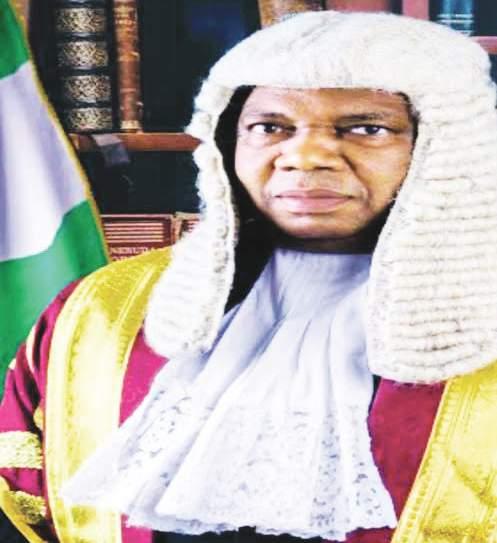
In the Supreme Court of Nigeria Holden at abuja
On Friday, the 17th day of January, 2025 Before their lordships uwani Musa abba aji adamu Jauro Chioma egondu Nwosu-Iheme Obande Festus Ogbuinya Habeeb adewale Olumuyiwa abiru Justices, Supreme Court SC/CR/747/2020
Between NONSO aGBO aPPellaNT And eNuGu STaTe ReSPONdeNT
(Lead Judgement delivered by Honourable Obande Festus Ogbuinya, JSC)
On issue 3, the Appellant‘s Counsel argued that the Respondent failed to discharge the burden to prove the case beyond reasonable doubt, relying on Section 135 of the Evidence Act, 2011 and ALABI v STATE (1993) 7 NWLR (PT. 307) 511. Counsel reiterated his arguments on failure of the prosecution to call vital witnesses, contradictions in the evidence of PW1 and PW2, and also contended that PW1 failed to mention the Appellant’s name in his first statement at Awkunanaw Police Station, Enugu State where the criminal complaint on the robbery incident was first laid; hence, the Respondent did not prove the case beyond reasonable doubt.
In response, Counsel for the Respondent argued that the evidence of PW1 who was an eyewitness, the Appellant’s confessional statement - Exhibit
“No error in stating the offence or the particulars required to be stated in the charge, and no omission to state the offence or those particulars shall be regarded at any stage of the case as material, unless the accused was in fact, misled by such error or omission….in so far as the Appellant was not misled, having a wrong or mistaken belief in the nature of the offence, the materiality of the omission of that particular vaporises into the den of irregularity”
C, and the gun recovered from him proved the ingredients of armed robbery against the Appellant beyond reasonable doubt. Counsel submitted that the two lower courts properly evaluated the evidence adduced at the trial, and rightly arrived at their concurrent findings.
Court’s Judgement and Rationale
Deciding issue 1, the Supreme Court relied on the provision of Section 288 of the CCL that “No error in stating the offence or the particulars required to be stated in the charge, and no omission to state the offence or those particulars shall be regarded at any stage of the case as material, unless the accused was in fact, misled by such error or omission”.
Applying the said provision to the issue at hand, the Supreme Court held that the purpose of a charge is to give the accused person good, sufficient and clear notice of the case against him, and it was not in doubt that the Appellant, prior to his arraignment, was duly served with the proof of evidence against him, which gave him ample opportunity to study the charge during its incubation period. The Supreme Court held further that, the charge filed against the Appellant, like every other charge, had two segments: statement of offence and particulars of offence, and at the cradle of the statement of offence, armed robbery was clearly specified as the offence that was preferred against the Appellant and his confederates under Section 1(2) of the Armed Robbery and Firearms (Special Provision) Act.
The Apex Court held that it was also evident from the record, that the Appellant took his plea of not guilty to the charge of armed robbery after the charge was read in English and duly interpreted to him in vernacular, and he was also duly represented by a Lawyer at every stage of the trial; hence, in effect, the Appellant was aware of the specie of crime for which he was charged, and he was not misled by the non-inclusion of the fact that he and his co-recidivists were armed with dangerous weapons as a particular in the charge. The Supreme Court held that in so far as the Appellant was not misled, having a wrong or mistaken belief in the nature of the offence, the materiality of the omission of that particular vaporises into the den of irregularity.
Furthermore, the Apex Court relying on the decision in MUMUNI v FRN (2018) 13 NWLR (PT. 1630) 249 and Section 289 of the Criminal Procedure Law of Enugu State, held that the appropriate time to object to any defect in a charge, is when it is being read and before a plea is taken thereto. The Apex Court reiterated the settled position of the law that, where an accused person delays or fails to register his opposition to a charge before a plea is taken, except the defect in the charge touches on the jurisdiction and competence of the court, the law presumes him as having acquiesced to the irregularity and thus, caught in the intractable web of waiver. Their Lordships held that having failed to raise an objection to the purported defect in the charge before giving his plea, the Appellant is deemed to have waived his right to challenge the purported irregularity.
On the 1st limb of issue 2, the Supreme Court held that it is not in doubt the law compels the prosecution to call a vital witness whose evidence will prove a vital point of the offence, as the failure to do so is fatal to its case; however, the law views the credible evidence of a single witness as sufficient to prove a crime, and the prosecution is not required to call a galaxy of witnesses to prove the commission of an offence. The Court held that the said Chi Alom whom the Appellant claimed was a vital witness, was not an eye witness to the crime, and notwithstanding the Respondent’s failure to call the wife of PW1 who was also said to have witnessed the crime, the testimony of PW1 himself who was the primary victim and an eyewitness was sufficient. The Supreme Court held that the said Chi Alom and PW1’s were therefore, not vital witnesses, and the failure to call them to testify was not fatal to the Respondent’s case. The Apex Court found that the credible direct evidence of PW1 and the Appellant’s confessional statement, were sufficient to prove the crime.
On the 2nd limb of issue 2, the Court held that for a contradiction to be fatal to any case, it must be so material to the extent that it casts serious doubts on the entire case presented by a party against whom it is raised, and it must relate to the ingredient of the crime. The Court held that the contradictions in the testimonies of PW1 and PW2, on the recovery of the stolen items from the Appellant were immaterial, because the recovery of stolen property is not an ingredient of the offence of armed robbery.
On issue 3, the Supreme Court considered the parol evidence of PW1 as that of an eyewitness, which qualifies as one of the three ways to prove the commission of an offence. The Court held that the unrefuted oral evidence of the PW1, which the law grants the court the unfettered liberty to rely and act on, constituted existential proof of the ingredients of armed robbery against the Appellant. The Court held further that it could not find anywhere in its record, where PW1’s extra-judicial statement at Awkunanaw Police Station was tendered in evidence before the trial court; hence, the Appellant’s complaint was misplaced, as a court of law can only rely on a document tendered as an exhibit before it. The Court also found that the Appellant’s extra-judicial statement to the SARS Office, Enugu which was tendered by PW2 and admitted as Exhibit C, without any shred of objection from the Appellant, was an undiluted admission by the Appellant of the commission of offence of armed robbery. The Court came to the conclusion that, the Respondent succeeded in proving all the ingredients of the offence of armed robbery against the Appellant.
Appeal Dismissed.
Representation
Chief O. A. U Onyema with another for the Appellant. Dr. K. T. Udeh, Attorney-General of Enugu State and others for the Respondent.
Reported by Optimum Publishers Limited, Publishers of the Nigerian Monthly Law Reports (NMLR)(An affiliate of Babalakin & Co.)

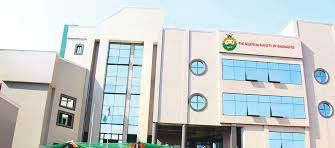

‘Credibility of Judiciary Now Under Severe Strain’, Uzoani, SAN
Adibe Emenyonu in Benin City
A Senior Advocate of Nigeria, SAN, Chief Emeka Uzoani on Tuesday, mirrored the reasons why the public viewed the Judiciary in recent times as a compromised institution.
Chief Uzoani, made the assertion in a Keynote Address he delivered at the Nigerian Bar Association (NBA), Benin Branch Law Week in Benin City, Edo State.
Speaking on the theme: "Restoring Credible Justice: Bridging the Gap Between Law and Public Trust in Nigeria’s Judiciary", the senior Lawyer blamed the perceived corruption the public has about the Judiciary as an institution, on both the Bar and the Bench.
He said: "We gather today not merely to fulfil a calendar obligation, but to confront a crisis. What lies before us is not a theoretical issue, it is a national emergency. The Judiciary, once venerated as the last hope of the common man, now finds its credibility under severe strain. The real challenge is not just perception, it is the steady
erosion of public confidence, and therefore, legitimacy".
According to him, doubts about justice are on daily basis being voiced by litigants, Lawyers and citizens alike on conflicting court orders, delay and slow processes that have led to public disillusionment because some legal practitioners have resorted to becoming enablers of the dysfunction, compromising the profession's integrity found
in the judicial system.
"Across the country, doubts about justice are voiced, by litigants, Lawyers, and citizens alike. Conflicting court orders, delay, and slow processes have fed public disillusionment. Worse still, some legal practitioners have become enablers of the dysfunction, compromising the profession’s integrity. This is no longer a matter confined to courtrooms or legal discourse, it plays out in frustrated conversations in marketplaces, in
cynical hashtags on social media, and in the growing apathy of citizens who have come to see justice as a privilege, not a right", Uzoani declared.
He lamented that a system of justice, once regarded as a sanctuary of fairness, is perceived as a gamble, adding that the issue at hand is not an exercise to blame one party alone, but the Bar and the Bench.
His words: "This reflection is not an exercise in blame, but a
collective reckoning, demanding humility and resolve from both the Bench and the Bar. It is a call to acknowledge our shared responsibility, to critically examine the systemic failures, and to embark on the deliberate, principled journey of restoring the judiciary’s integrity and public confidence."
He listed symptoms of this credibility crisis as Accessibility: When justice becomes a privilege which he described as one of the clearest manifestations of the
credibility crisis in the judiciary because of the widening gap in access to justice, a constitutional right under Section 36(1) of the 1999 Constitution that, for many Nigerians, remains more theoretical than real; when today, justice has become less a right and more of a privilege, expensive, distant, and often inaccessible; even filing, a modest civil claim is financially daunting; court fees, service costs, and procedural penalties quickly pile up.
Trespassing: FG to Pay NSE N100m Damages
Chioma Dike
The Lagos State High Court has ruled in favour of the Nigerian Society of Engineers (NSE) in a long-standing land dispute with the Federal Government, declaring NSE the rightful owner of a plot of land in Victoria Island and awarding N100 million in damages for trespass.
In the judgement delivered by Justice Ashade on June 26, 2025, the court confirmed that the NSE owns Plot PC 2A on Engineering Close, based on valid documents issued by the Lagos State Government and years of uninterrupted ownership and use
of the land. The court rejected the Federal Government’s claim that the land belonged to King’s College.
The case began after officials from the Federal Ministry of Lands and Education, backed by security agents and thugs, took over the land in 2012, claiming that it was meant for a Mosque for King’s College. They destroyed the NSE’s perimeter fence and annexed the plot, despite NSE’s protests.
Justice Ashade ruled that the Federal Government failed to prove ownership, noting that they relied on photocopies of colonial documents that were
Olu of Iju Ishaga’s Appointment, Installation Invalidated Over Contempt of Court
The Lagos State High Court sitting in Ikeja has invalidated the appointment and installation of Prince Bayo Iginla as the Olu of Iju Ishaga, citing a wilful breach of an existing court order. Justice (Dr) L.A.M. Folami, delivering a decisive ruling, condemned the installation as a direct affront to judicial authority and due process.
The Claimants, Chief Adams Akande Balogun, Mr Bashiru Alamu Balogun, and Mr Rasheed Adewole Balogun representing the Arayomi Aiyeteru Ruling Family, had gone to court asserting their right to produce the next traditional ruler of Iju Ishaga. They argued that the recent installation violated a subsisting order made on December 18, 2024, which directed all parties to maintain the status quo.
Despite the order, the Lagos State Executive Council proceeded to approve and recognise Prince Iginla’s installation, which was carried out while the suit was still pending. This prompted the Claimants to return to court
with a Motion on Notice filed on December 31, 2024, asking for the appointment to be nullified.
Justice Folami, ruling on the matter, stated unequivocally that the Defendants acted in “total disobedience” of the court’s directive. She found that the 1st Defendant, Chief Isaac Kolawole Akinbami, had “stolen a match” on the Claimants, effectively undermining the fairness of the judicial process.
In a stern application of the law, the court set aside the State Government's approval, nullified the installation ceremony, and barred Prince Iginla from parading himself as the Olu of Iju Ishaga. Additionally, the court restrained all Government officials from recognising the installation or disbursing any benefits tied to the title.
Citing key precedents, including Statoil (Nig.) Ltd v Star Deep Waters Petroleum Ltd and NDIC v Savannah Bank, Justice Folami emphasised that mandatory injunctions are warranted where litigants attempt to pre-empt court
decisions by rushing through questionable acts during trial.
The judgement, delivered with finality and clarity, not only underscores the importance of respecting the Judiciary in chieftaincy matters, but also serves as a caution to public office holders and traditional institutions that the rule of law must prevail, above executive fiat or customary pressure.
not legally admissible. He added that, all Crown Lands in Lagos were transferred to the Lagos State Government when the State was created in 1967.
The court awarded N100 million in damages to NSE, N5 million in legal costs, and granted a perpetual injunction stopping any further trespass.
Court Orders Final Forfeiture of Drug Kingpin’s Victoria Island Hotel, Vehicles, and Electronics
Stories by Steve aya
A Federal High Court in Lagos has ordered the final forfeiture of a luxury five-storey building in Victoria Island, Lagos, along with several vehicles and electronics, linked to a large-scale drug trafficking syndicate headed by a fugitive kingpin, Noble Phillip.
Justice Ibrahim Ahmad Kala gave the ruling following a request by the National Drug Law Enforcement Agency (NDLEA), which described the property and items as proceeds of crime. The forfeited building, located at No. 16 Waziri Ibrahim Street, was allegedly disguised as a hotel, and used as a base for illicit drug operations.
The court also forfeited five vehicles, including a Toyota Sienna, Land Cruiser Prado, and a Volkswagen Delivery Van; 84
televisions, 70 air conditioners, and 13 refrigerators. These were said to have been recovered during a raid on April 25, 2025, when NDLEA operatives discovered 586 parcels of Canadian Loud Cannabis weighing over 415 kilograms - with a street value estimated at N1 billion.
According to court documents, the property belongs to Noble Phillip, who escaped during the raid and is still at large. The NDLEA said the cartel operated openly from the property, which houses 80 hotel rooms nearing completion, and used it for storage, packaging, and distribution of narcotics.
A key associate of the fugitive kingpin, Ayitu Eze, was arrested during the operation. He was later convicted on July 2, 2025, and sentenced to five years in prison, with an option of a N1
million fine and six months community service for dealing in cannabis recovered from the same premises. Justice Kala held that the NDLEA had presented compelling evidence, including title documents, photographs, a published notice for third-party claims, and forensic drug analysis reports. The Judge ruled that there was no dispute over ownership or the criminal use of the property, making final forfeiture to the Federal Government appropriate. The NDLEA welcomed the judgement, as a major breakthrough in its war against drug trafficking. “This ruling sends a strong signal to organised crime syndicates, that their assets can and will be seized, regardless of how well disguised they are”, said NDLEA Counsel, Buhari Abdulahi.
Court Orders Parties in River Park Land Dispute to Maintain Status Quo
A High Court in the Federal Capital Territory (FCT) has ordered all parties involved in the ownership dispute over the popular River Park Estate to maintain the status quo, halting all processing of land documents until the case is resolved. The directive is seen as a significant step in managing growing tensions, around one of Abuja’s most contested real estate developments.
The order came during proceedings in a case filed by Jonah Capital Nigeria Limited, which is challenging what it claims is unlawful encroachment and occupation of its property by the Registered Trustees of Dunamis International Church. The Claimant
also sought to stop any further steps towards granting a Right of Occupancy (RFO) or Certificate of Occupancy (C of O) in the disputed area.
One key development in court, was the approval of an application to amend the first Defendant's name from Dunamis International Christian Centre to its legally recognised entity, the Registered Trustees of Dunamis International Church. Counsel for the Claimant, John Idoko, told journalists that the amendment was necessary, to ensure accountability and legal precision.
The court also declined to entertain D arguments from a man claiming to be a majority shareholder
in Jonah Capital, noting that he had not been joined as a party in the suit. The Judge emphasised that, only formally recognised parties could address the court in the ongoing matter. Counsel to Dunamis, Felix Tyokase, confirmed that his client had no objection to the name amendment, and denied allegations of encroachment. “We are not doing anything on their land. The order to maintain the status quo has been in place since January, and they have shown no proof of interference”, he said.
The ownership of River Park Estate, located off the Abuja Airport Road, has long been a source of legal and political friction. The court’s mention of the FCT Minister in its status quo order, suggests that the case may involve deeper layers of Government interest, raising the stakes even higher. Legal experts say the ruling is a timely reminder of the broader governance challenges, in Nigeria’s land administration system. “The FCT is particularly prone to land disputes due to overlapping claims, bureaucratic delays, and political influence”, said Amaka Ogbonna, a Lawyer and real estate law analyst. “This court order is as much about protecting justice, as it is about preventing chaos.”
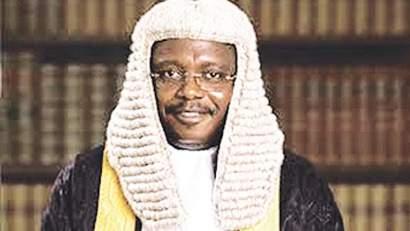
2025 NBA-AGC: ‘We’ll Deliver an Exceptional Conference’
all roads lead to enugu from august 22 – 29, 2025 when Nigerian lawyers will converge on the Coal City for the Flagship event of the Nigerian Bar association, the NBa annual General Conference (NBa-aGC). already over 15,000 lawyers have registered for the event. chairman of the conference Planning committee, Dr Emeka obegolu, SAN spoke with onikepo Braithwaite and Jude Igbanoi on his Committee’s elaborate preparations so far, their plans to ensure that this year’s Conference is extraordinary, and in tandem with its theme, “Stand out, Stand Tall”. He also spoke about, why the Conference venue was moved from Port Harcourt to enugu
Afew weeks from now, Lawyers from all over Nigeria will converge on the Coal City, Enugu from August 22 - 29, 2025 for the Annual General Conference of the Nigerian Bar Association (AGC) themed “Stand Out, Stand Tall”. Kindly, speak about this year’s theme and what informed the choice
It's a pleasure to discuss the upcoming Annual General Conference (AGC) of the Nigerian Bar Associa-
tion in Enugu. As Chairman of the Conference Planning Committee, I'm delighted to provide insights into what promises to be a memorable event.
The 2025 Annual General Conference Theme is "Stand Out, Stand Tall". It is a clarion Call to Action for the Nigerian Lawyers. This theme, "Stand Out, Stand Tall," is more than just a catchy phrase; it's a deliberate and timely call to
“We are well on track, to deliver an exceptional Conference experience”
action, for every legal practitioner in Nigeria. It was chosen to resonate deeply, with the current realities and aspirations of the legal profession.
In an increasingly complex and challenging socio-economic and political landscape, Lawyers are expected to be more than just legal technicians. We must "Stand Out", by distinguishing ourselves through ethical practice, innovative thinking, specialised expertise, and a commitment to justice. This means embracing continuous learning, adapting to technological advancements, and developing unique skill sets that set us apart. It speaks to individual excellence, and the pursuit of mastery in our various fields.
Simultaneously, we must
"Stand Tall" – collectively and individually – as advocates for the rule of law, good governance, human rights, and national development. This implies courage in the face of injustice, integrity in our dealings, and a strong, unified voice in addressing societal challenges. It's about upholding the dignity of the legal profession, and ensuring that our contributions are impactful and enduring. The theme, therefore, challenges us to achieve personal mastery, while also contributing significantly to the advancement of our society and the legal system.
As Chairman of the Conference Planning Committee, tell us precisely how far your Committee has gone with preparations to host Nigerian Lawyers for AGC. Despite reasons advanced
2025 NBA-AGC: ‘We’ll Deliver an Exceptional Conference’
by the NBA leadership, many Lawyers have expressed apprehensions over the change of this year’s AGC venue from Port Harcourt to Enugu. Why Enugu? Why not any other venue in the South-South? There are germane concerns about security in the South East, particularly because of the activities of IPOB/ ESN, their Monday sit-at-home order etc. What logistics have you put in place to allay fears, and ensure the safety of AGC Attendees?
I'm pleased to report that the Conference Planning Committee has made significant strides, in our preparations to host Nigerian Lawyers in Enugu. We are well on track, to deliver an exceptional Conference experience.
The primary Conference venues, including the International Conference Centre (ICC) Enugu and the Okpara Square, are undergoing final checks and arrangements, to ensure they meet the highest standards for a gathering of this magnitude. We're building a Conference village that can host a Conference with over 15,000 delegates, and we are confident in the capacity and facilities that we are putting in place. The Government of Enugu State is working tirelessly, in cooperation with the Planning Committee, to ensure that the State owned Conference Centre is ready to receive Nigerian Lawyers.
While we acknowledge that Enugu as a Conference city will be hosting it’s largest Conference ever, we are actively working to ensure sufficient rooms are available for all delegates. Our Committee is finalising arrangements for the seamless movement of delegates, including shuttle services from designated hotels to Conference venues, and robust plans for airport pickups. To ensure a world class Conference experience, we are in discussions to partner with an internet network provider to provide free wifi at all Conference venues, and also have put in place a comprehensive IT support team to facilitate smooth virtual participation and digital presentations.
On the issue of registration, you must have observed that our registration portal has been live for months, and we have a dedicated team managing the process efficiently, providing support to registrants.
There are concerns that Enugu may not have the requisite facilities and infrastructure to host a Conference of such magnitude,
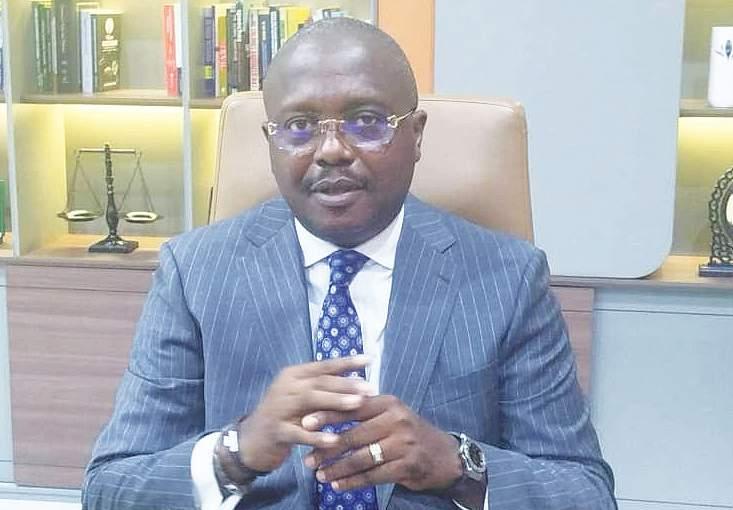
in terms of accommodation (also five-star hotels), breakout sessions, meeting rooms, transportation etc? How have you addressed this?
The decision to move the AGC from Port Harcourt to Enugu, while regrettable for some, was a principled and necessary one made by the NBA leadership. Enugu was chosen after a thorough evaluation of available options, considering several factors which include Infrastructure readiness, logistical feasibility, security assessment, accessibility, hospitality, etc. While we readily acknowledge that concerns exist, Enugu boasts of a recently commissioned International Conference Centre with significant capacity, coupled with a growing number of suitable hotels and ancillary facilities that can accommodate our numbers.
In the build up to the AGC, the Enugu ICC has hosted a few large Conferences creditably well; we have had cause to identify areas that needed attention and the facility team on ground took remedial steps, all in preparation for the largest gathering of Lawyers anywhere in Africa. This was a critical factor, after the sudden change.
“The 2025 AGC, promises an intellectually stimulating and engaging programme. The choice of Hon. Julius Malema, the dynamic leader of the Economic Freedom Fighters (EFF) in South Africa, as our Keynote Speaker is deliberate and significant…. you can expect sessions on Artificial Intelligence and the Future of Law….Economic Diversification and Legal Sector Opportunities: Unpacking Legal Roles in Emerging Sectors, Fintech, and Sustainable Development; The Intersection between Security and Economic Development; Rethinking Political Questions and Adjudication…..”
The infrastructure for transportation and general logistics, proved more adaptable within the available timeframe for the Conference. There are over 50 brand new buses dedicated by the State Government to ease movement logistics, and also taxi hailing services operate 24 hours in the city of Enugu.
The major Conference challenge we have in Nigeria, is the absence of a truly world class Conference facility that can host a Conference of the magnitude of Nigeria Bar Association Conference. Within the recent history of NBA Conferences, whether in Lagos, Port Harcourt or Abuja, the Conference Planning Committee has always resorted to building a Conference Village for over-flow viewing and break-out sessions. In Enugu, we have the same challenge and we are resorting to Marquees to complement the facilities at the International Conference Centre, in creating a Conference Village with all the needed infrastructure. This explains why the NBA Conference is capital intensive.
To put this in proper perspectives, the International Conference Centre (ICC) Enugu boasts a main hall with significant capacity, complemented by various breakout rooms and meeting spaces. We are building a Conference village that will host the Friendship Centre, Exhibition Park, Mammy Market, Break out sessions, President’s Dinner, Unbarred, etc. to ensure sufficient space for all events.
While Enugu may not boast of the number of five-star hotels as a commercial hub like Lagos, it has a good number of reputable hotels, including five-star options, and other high-quality hotels that can comfortably accommodate our delegates.
Our strategy involves a mix of these hotels, and we are working with them to ensure competitive rates and excellent service. The Local Organising Committee ably led by Ikeazor Akaraiwe, SAN, is doing a wonderful job in assisting our colleagues to get comfortable accommodation within the city of Enugu. But, I must also advise that members who seek premium accommodation should make early reservations, because we all know that hotel rooms, like everything in life, is limited.
On transportation, we are working with local transport associations and private shuttle services to complement the buses provided by the Government of Enugu State, in order to ensure efficient movement for attendees. A dedicated AGC mobile application and information desk will be available to provide real-time updates on accommodation, transportation, and session schedules, easing navigation for delegates.
We are leaving no stone unturned, to ensure that delegates experience comfort and convenience throughout their stay.
What are the highlights of the Conference? The Keynote Speaker, Hon. Julius Malema is a world-renowned human rights activist. Why Malema? Who are some of the other Speakers and the topics they will address? What are the topics of some of the breakout sessions?
The 2025 AGC, promises an intellectually stimulating and engaging programme. The choice of Hon. Julius Malema, the dynamic leader of the Economic Freedom Fighters (EFF) in South Africa, as our Keynote Speaker is deliberate and significant. Malema is a globally recognised human rights activist and a compelling voice for
2025 NBA-AGc: ‘We’ll Deliver an exceptional
economic liberation, social justice, and youth empowerment. His fiery and uncompromising stance against injustice, inequality, and pan- Africanism, resonates strongly with the "Stand Out, Stand Tall" theme. He embodies the courage to challenge the status quo, and the determination to advocate for the marginalised. His insights into socio-political activism, economic justice, and the role of legal professionals in driving change, will undoubtedly inspire and provoke robust discussions among Nigerian Lawyers. He is a disruptor, and we believe his message will challenge us to be more impactful.
The Chairman of the Opening Ceremony is the inimitable past President of Nigeria, Chief Olusegun Obasanjo, GCFR. We all know what he brings to the table, and we look forward to his opening remarks. We have an impressive lineup of local and international legal luminaries, thought leaders, and policymakers. While the full list and specific topics are being finalised, you can expect sessions on Artificial Intelligence and the Future of Law: Exploring the Impact of AI on Legal Practice, Ethics, and the Administration of Justice; Economic Diversification and Legal Sector Opportunities: Unpacking Legal Roles in Emerging Sectors, Fintech, and Sustainable Development; The Intersection between Security and Economic Development; Rethinking Political Questions and Adjudication; Disruptive AI; Values Vs Money; Breaking the Chains of Exclusion; Women in Leadership; Infrastructural Deficit, Funding, Development and Vandalism; Dirty Money; Globalisation and the Legal profession; Owning in a Changing Environment; Effective Workplace Compensation; Building the Future Firm; Citizens Rights and Securities Concern, etc.
To what extent has the imbroglio with the Rivers State Sole Administrator been sorted out, over his request that NBA returns the N300 million donation by Rivers Government under Governor Fubara?
The imbroglio with the Rivers State Sole Administrator over the N300 million donation, is an issue that the NBA leadership has addressed with clarity and firmness. There is nothing to be sorted out, as the donation was for specific items in support of the Conference, and we hope the issue has been put to rest. The NBA maintains that the N300 million was a donation of goodwill, and not a payment for hosting rights or any specific contractual obligation. It is customary for State Governments and other entities to support the AGC, as part of their corporate social responsibility and appreciation
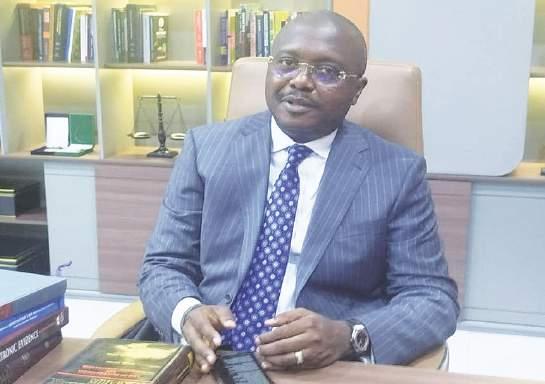
for the legal profession's role in society. This support is generally unconditional.
Some Lawyers have complained that registration fee this year is exorbitant, and beyond the reach of most young Lawyers. How did your Committee arrive at this scale of fees? Was the financial hardship given adequate consideration, when fixing this year’s Conference fees? How many registrants do you have so far? What concessions do you have for Young Lawyers?
We understand the concerns expressed by some Lawyers regarding the registration fees, particularly young Lawyers facing financial hardship. But, we need to remind our colleagues that the President of the NBA, Mazi Afam Osigwe, SAN sought and obtained the resolution of the National Executive Council, to retain the 2024 early bird Conference Registration fees for the 2025 Conference. Also worthy of note is that, at the February 2025 NBA NEC meeting, the NBA President also sought and obtained NEC approval to extend the early bird fees by one month. All these proactive steps were taken, to encourage members to register for the Conference. The Conference fees are highly subsidised, and I can tell you why I say so. We understand the need to secure top-tier speakers, provide excellent venues, high-
“The NBA maintains that the N300 million was a donation of goodwill, and not a payment for hosting rights or any specific contractual obligation”
quality materials, Conference bags, and an overall seamless experience. The prevailing economic realities in the country, have significantly increased the cost of goods and services. The substantial costs associated with ensuring robust security, transportation, and accommodation arrangements for thousands of delegates. Our commitment to ensuring that the knowledge, networking opportunities, and overall experience, deliver immense value for the delegates. While we strive for affordability, compromising on quality and safety is not an option for an event of this magnitude. In other words, NBA has to go above and beyond to subsidise the NBA Conference for her members.
We are acutely aware of the challenges, faced by our young Lawyers. To mitigate the financial burden, we implemented a significantly reduced fee structure for Lawyers within their first 1-9 years of call, with further increases for higher years of call. We encouraged early registration with substantial discounts, to make it more accessible.
We have over 15,000 number of registrants so far, reflecting the excitement and anticipation for the Conference. While I cannot disclose precise figures at this moment, I can confirm that registrations are well above projections for this stage.
What side attractions and entertainment freebies should Lawyers look forward to at Enugu?
Beyond the serious business of law, we believe in fostering camaraderie and providing avenues for relaxation and enjoyment. Lawyers attending the AGC in Enugu can look forward the Cultural Night,
which is an evening showcasing the rich cultural heritage of Enugu and Igboland, with music, dance, and traditional cuisine. The Friendship Centre, will provide daily entertainment for members. The NBA Dinner, is a ticketed formal networking event with entertainment. The Exhibition Booths will provide opportunities to explore legal tech solutions, publications, and other services. There will also be sporting activities and friendly competitions, to encourage fitness and interaction.
Did your Committee reach out to or invite Lawyers from other jurisdictions to this Conference?
Yes, our Committee has indeed, reached out to and invited Lawyers from other jurisdictions. We believe in fostering international legal collaboration, and cross-border learning. Invitations have been extended to Bar Associations, legal professionals, and eminent jurists from various countries across Africa, Europe, America, and Asia. We anticipate a significant number of international delegates, enriching the diversity of perspectives and discussions at the AGC.
There is a general complaint that the AGC usually ends up being just a Talk Shop, and in reality, no impact from the Conference is ever felt. That none of the resolutions made there, are never implemented by any of the three arms of Government. What will you do to change this narrative, and make the 2025 AGC impactful?
The perception that AGCs are merely "talk shops" without tangible impact is a longstanding concern, and it's one we are determined to change for the 2025 AGC. We recognise that resolutions often gather dust. This year, our approach is different and we planned
it intentionally as follows:
•Actionable Recommendations: Every session is structured to conclude with concrete, actionable recommendations. Our rapporteurs are specifically tasked with synthesising these into clear, implementable proposals.
•Dedicated Implementation Committee: Immediately following the Conference, a dedicated "AGC 2025 Implementation Committee" will be constituted. This Committee will be charged with actively engaging the relevant arms of Government, regulatory bodies, and stakeholders, to push for the adoption and implementation of resolutions. This will not be a passive body; it will be an active lobby and monitoring group.
•Public Advocacy and Follow-Up: We will intensify our public advocacy efforts, using various platforms to highlight key resolutions and pressure for their implementation. Regular updates on the status of implemented resolutions, will be shared with the Bar.
•Partnerships: We are forging stronger partnerships with civil society organisations, media, and other advocacy groups, to amplify our voice and create a united front for change.
•Impact Measurement: We intend to develop a framework for measuring the impact of the AGC resolutions, allowing us to track progress and hold relevant parties accountable.
You are also Chairman of NBA Remuneration Committee which many perceive as well intentioned. But, it does appear that enforcement and implementation are posing challenges to the actualisation of the initiative. Kindly, shed some light on what the Committee has done so far, in realising the mandate to ensure that Lawyers are commensurately remunerated for their work.
My work in the NBA Remuneration Committee is one that is personal to me, and which I am very passionate about. As Chairman of the NBA Remuneration Committee, I share the sentiment that while the initiative is well-intentioned, enforcement and implementation pose significant challenges. The Committee’s mandate is crucial in ensuring that Lawyers are commensurately remunerated for their work, thereby upholding the dignity of the profession and ensuring its sustainability. The Committee members take this mandate as a privilege, a rare opportunity to be part of the team that has the
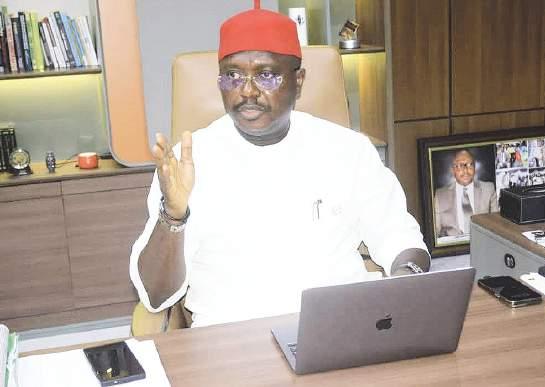
mandate to elevate the economic status of each member of the legal profession.
Upon inauguration, we embarked on an aggressive campaign to sensitise Lawyers, clients, and the general public about the provisions of the Remuneration Order. This includes online meetings, webinars, publications, and social media campaigns. To our greatest surprise, if not consternation, over 80% of Lawyers did not know about the Remuneration Order 2023, and even among those who knew about it, many did not have a copy. So, we began with sharing soft copies of the Order to every Lawyer, every Branch and every stakeholder. We wrote to Banks, Governors, Ministries, Departments and Agencies of Government, the Judiciary, Insurance Companies, Association of Local Governments of Nigeria (ALGON), Professional Associations, NGOs, etc, to call their attention to the existence of the Order and the mandatory nature of the prescriptions therein, including the unethical nature of the breach thereof.
We are actively collaborating with NBA Branches across the country, to establish monitoring units at the local level. These
“We have consistently emphasised the provisions of the Order, that charging below the minimum prescribed fees is professional misconduct that can attract disciplinary sanctions by the Legal Practitioners Disciplinary Committee (LPDC)”
units are crucial for monitoring compliance, and receiving complaints.
We have consistently emphasised the provisions of the Order that, charging below the minimum prescribed fees is professional misconduct that can attract disciplinary sanctions by the Legal Practitioners Disciplinary Committee (LPDC). We are encouraging Lawyers to report instances of undercutting, or non-compliance. We are engaging with key stakeholders, including Government agencies, corporate bodies, and private individuals, and urging them to comply in their dealings with Lawyers.
In all this, we have had good news and some challenges. The challenges include the excuse of current economic realities that sometimes pressure Lawyers to accept fees in violation of the Order; a pervasive culture of undercutting, particularly among some segments of the Bar; Despite the efforts of the Committee, some Lawyers still do not appreciate the enforcement mechanisms; Lawyers’ unwillingness to report colleagues or clients who flout the Order without fear of reprisal; and many more.
The good news is that the NBA under the leadership of Mazi Afam Osigwe, SAN, has given the Committee sufficient support to strengthen enforcement and actualisation.
The Committee is focusing on working closely with the LPDC to ensure prompt and decisive action against proven cases of non-compliance, creating a more accessible and confidential reporting mechanism for Lawyers to report violations without fear, persistent sensitisation and
education for all stakeholders on the benefits of fair remuneration, gathering data on compliance and non-compliance to refine our strategies and identify hotspots, emphasising to stakeholders that adherence to the Remuneration Order protects their interests by ensuring quality legal services. My best memory of this service to the Bar, is the day my phone was credited with N3,000 call credit. I didn’t know how it came about, until I received a call from a colleague who said his gesture of gratitude was to thank the Remuneration Committee for making it possible for him to receive his highest fees for property conveyancing since he started practice. I felt elated as it meant that, the impact of the work we are doing is beginning be felt by our colleagues. That made my day.
The next best memory was when we received communication from the court, asking for our opinion on the professional fees payable to a Lawyer. In that case, the court had determined that the Defendant engaged the Counsel for specific instructions, that the job was performed, but that parties did not agree on professional fees payable for the brief. Our Committee made our recommendation to the court. Again, this showed the Committee that the awareness and sensitisation programme is being well received. We acknowledge that more needs to be done, and we remain committed to doing more in actualising the mandate of ensuring that every Lawyer receives fair compensation for their invaluable services, contributing to a more dignified and sustainable legal profession in Nigeria.
Thank you.
Thank you, Learned Silk.
Talking ConsTiTuTional demoCraCy
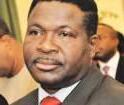
Ethical Problems in AI and Digital Legislation in Nigeria (Part 2)
Introduction
The inaugural part of this treatise, was naturally introductory. We discussed AI and human rights; Ethics by design; AI’s capacity for systematic bias; Data subjects and Data controllers; its Evolution; Conceptual Origins; Early Aspirations and Technological Milestones - from automation to autonomy. This week’s feature explores the concept of digital identity in the Nigerian context; the Universality of Rights in a Technological Age; Data Sovereignty; Legal and Policy Transformation under the NDPA, 2023. We shall conclude with an analysis of enforcement Challenges and Sovereignty Implications. Enjoy.
Understanding Digital Identity in the Nigerian Context
In a society where State legitimacy and public participation increasingly rely on digital infrastructure, the importance of a recognised, secure, and universally accepted digital identity system cannot be overstated. In Nigeria, this digitalisation drive is exemplified by the National Identity Management Commission (NIMC), and the roll-out of the National Identity Number (NIN). The NIN, a unique identifier assigned to every citizen, is now mandatory for access to numerous public and private services, from opening a bank account to acquiring a SIM card. While this system was conceived to promote security, administrative efficiency, and socio-economic inclusion, it has also raised significant legal and ethical questions around data privacy and equity.
Digital identity, by design, captures more than names and addresses. It encapsulates biometric data, demographic profiles, and behavioural patterns. Unlike analog records, digital identities are persistent, searchable, and if misused, are capable of facilitating unprecedented surveillance. The fact that digital identities are required to function within multiple systems means they are not only foundational to governance, but also vulnerable to misuse.
The rollout of the NIN system, while extensive, has not always been transparent or inclusive. In several rural and marginalised communities, infrastructural challenges have led to under-enrolment, effectively excluding vulnerable Nigerians from accessing essential services. The mandate requiring all SIM cards to be linked with NINs, resulted in millions of Nigerians being disconnected from mobile services due to non-compliance. Although framed as a security measure, critics argue that the policy veered dangerously close to coercion, raising questions about informed consent, especially among digitally illiterate populations.
A similar issue arose with the release of the NIMC Mobile ID App, which exposed sensitive personal data of individuals. As documented in the official NDPA 2023 Overview, this event served as a painful reminder of the consequences of launching national digital tools without adequate privacy assessments. The failure to conduct a proper Data Protection Impact Assessment (DPIA), a now mandatory requirement under Section 28 of the Nigeria Data Protection Act, 2023, illustrates how gaps in governance can lead to direct violations of constitutional privacy rights.
The danger in these practices is not just technical, it is ethical. When individuals cannot opt out of digital systems that control access to rights and services, identity ceases to be a tool of empowerment and becomes one of coercion. This erosion of autonomy

is antithetical to both Nigerian constitutional principles, and the broader human rights frameworks that Nigeria is party to.
The Universality of Rights in a Technological Age Human rights are universal and indivisible, meaning that they apply equally to all individuals regardless of race, gender, nationality, or context, and that no right is inherently superior to another. Yet, the application of these rights in an era of AI-driven technologies requires careful interpretation and, at times, doctrinal innovation.
AI does not exist in a legal vacuum. It interacts with existing rights such as:
* The right to privacy (Article 12 UDHR; Article 17 ICCPR);
* The right to non-discrimination (Articles 2 and 7 UDHR);
* The right to freedom of expression (Article 19 UDHR, Article 19 ICCPR); and
* The right to an effective remedy (Article 8 UDHR).
The key challenge lies not in defining new rights, but in applying these long-standing rights to new contexts in which technologies mediate relationships between individuals, States, and corporations.
Digital Rights as Human Rights
The growing discourse around digital rights, reflects an attempt to re-articulate classical human rights in response to technological disruption. While not enshrined in a single binding treaty, digital rights are increasingly recognised in international jurisprudence and soft law instruments. These include:
* The UN Guiding Principles on Business and Human Rights (UNGPs), which place a duty on private tech companies to respect human rights;
* The European Convention on Human Rights (ECHR), as interpreted by the European Court of Human Rights in landmark cases on surveillance and data retention; and
* Regional charters such as the African Charter on Human and Peoples’ Rights, which have begun to address the intersection of technology and fundamental freedoms. AI-driven violations - ranging from
"By setting stringent requirements for international data flow, the NDPA not only strengthens national data control, but also aligns Nigeria with global best practices such as the European Union’s General Data Protection Regulation (GDPR), albeit adapted for local conditions"
Regulation (NDPR) 2019, a document that represented the country’s first serious attempt to outline data protection principles. Although ambitious in intent, the NDPR lacked statutory legitimacy and binding legal authority. It was enforced through an administrative agency, the National Information Technology Development Agency (NITDA), which did not possess the institutional muscle or legal foundation to compel adherence, particularly among foreign-owned technology firms and large domestic entities. Moreover, the regulation was undermined by inconsistent compliance reporting, weak auditing mechanisms, and an overall lack of public awareness. As a result, the NDPR, despite its foundational role, functioned more like a policy placeholder than a comprehensive legislative solution.
algorithmic discrimination to opaque decision-making - undermine the enjoyment of rights in subtle but systemic ways. A rights-based approach to AI regulation, therefore, demands proactive safeguards that anticipate harm, rather than simply reacting to it after the fact.
Data Sovereignty: Who Owns Nigerian Data?
With the rapid expansion of national digital infrastructure across Nigeria, a far more pressing issue has risen to the fore: the question of who truly owns and governs the data that powers this infrastructure. As digital systems increasingly underpin the delivery of public services, financial transactions, education platforms, health records, and national security functions, data becomes not only a technical asset, but a core element of State power. Data sovereignty means that data generated within a country’s borders is governed by that nation’s laws and regulatory frameworks; this ensures local control over data access, storage, and usage. It has become a critical aspect of national policy and governance. In Nigeria, this issue has grown increasingly complex, particularly in light of the pervasive presence of foreign cloud providers, offshore data processors, and international technology firms that collect, process, and sometimes export Nigerian user data without clear or enforceable jurisdictional frameworks.
Foreign digital platforms have historically played a central role in the Nigerian data ecosystem, either as providers of essential services like email, storage, and analytics, or as developers of social media and financial applications used daily by millions of Nigerians. While these platforms often promise global connectivity and technical sophistication, they also introduce serious risks. Data generated within Nigeria is frequently routed through foreign servers, stored in jurisdictions with significantly different privacy protections, and subjected to external political and commercial interests. This dislocation of Nigerian data is what scholars term extraterritorial data flow which raises serious questions about control, privacy, and national security. The potential misuse of this data, whether for commercial exploitation, surveillance, or even geopolitical leverage, makes the issue of domestic data governance all the more urgent.
Legal and Policy Transformation
Under the NDPA 2023
Until recently, Nigeria’s response to the challenge of data governance was anchored in the Nigeria Data Protection
The Nigeria Data Protection Act (NDPA) 2023, however, marked a decisive departure from this earlier, fragmented approach. By repealing the NDPR and replacing it with a statutory regime, the NDPA elevated data protection to a matter of national sovereignty and legislative importance. At the core of the Act, is the recognition that personal data is not merely an individual right but a collective national asset, something that demands regulation in line with Nigeria’s development priorities, cultural context, and constitutional principles. The Act establishes the Nigeria Data Protection Commission (NDPC) as an independent regulatory body with clear statutory powers to issue binding decisions, investigate infractions, sanction non-compliance, and develop guidance frameworks for both private and public actors. This institutional reform, for the first time, gives Nigeria a coherent and enforceable data governance framework rooted in law, rather than agency-issued regulation.
One of the NDPA’s most transformative provisions is its regulation of cross-border data transfers, detailed in Sections 41 to 43. According to these provisions, personal data may only be transferred outside of Nigeria if the receiving country offers an adequate level of data protection, if there exists a binding agreement to uphold Nigerian standards, or if the data subject has provided explicit and informed consent. This clause responds directly to longstanding criticisms that sensitive Nigerian data has often been offshored to jurisdictions with weak regulatory frameworks, where it is vulnerable to unauthorised access and misuse. By setting stringent requirements for international data flow, the NDPA not only strengthens national data control, but also aligns Nigeria with global best practices such as the European Union’s General Data Protection Regulation (GDPR), albeit adapted for local conditions.
Enforcement Realities and Sovereignty Implications
Despite the NDPA’s progressive legal architecture, enforcement remains a critical bottleneck. Nigeria’s current digital infrastructure does not yet offer the forensic or technical capability to systematically track how and where data flows once collected, especially when it enters complex multinational systems. Many Government Ministries, departments, and agencies (MDAs) continue to rely on foreign vendors for software development, cloud hosting, and even cybersecurity services. This reliance has directly contributed to the underutilisation of Nigeria’s expanding data infrastructure, despite over $220 million in investments spread across approximately 11 data centres nationwide. These centres, which require between $10 million and $20 million to establish depending on their Tier classification, are currently operating at less than 30% capacity. While private telecom operators and ICT firms have made significant strides in hosting their data locally, the public sector expected to champion data localisation has instead intensified capital flight by outsourcing sensitive information storage to foreign countries, including Israel, Ukraine, the United Kingdom, and the United States. (To be continued).
THOUGHT FOR THE WEEK
“Technology, through automation and artificial intelligence, is definitely one of the most disruptive sources”. (Alain Dehaze)
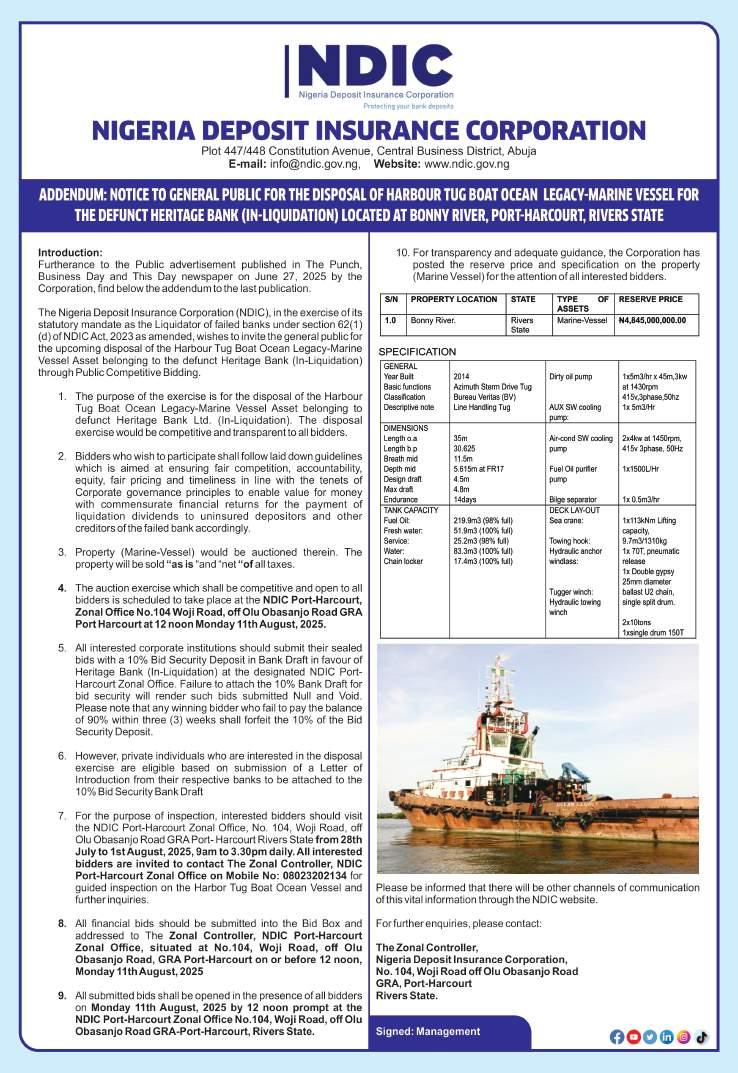
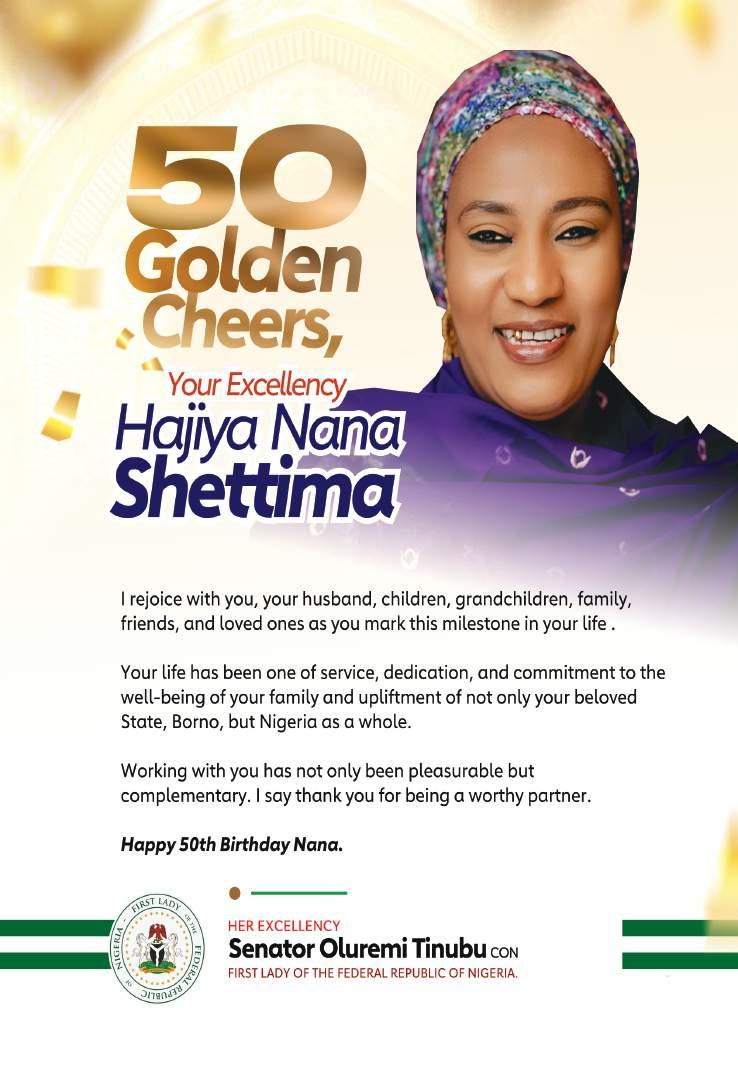
Encomium as Deputy Commander General of NDLEA, Momodu Bows Out of Service
LINUS ALEKE writes that colleagues, friends, public office holders, and well-wishers have poured encomiums on the former Deputy Commander General of NDLEA, Sule Momodu, as he bows out of service after over three decades of meritorious service to the fatherland.
The National Drug Law Enforcement Agency (NDLEA) recently bid farewell to one of its Deputy Commander General, Sule Momodu, who bowed out of service after over three decades of meritorious service to the nation, Africa, and, by extension, the globe.
During his tenure, the ex-Director of Technical Services left an indelible mark on the agency, driving efforts to curb drug abuse and trafficking. His dedication to the agency’s mission earned him respect and admiration from colleagues and stakeholders alike. His legacy will undoubtedly continue to inspire future generations of NDLEA officials as they strive to create a safer and healthier Nigeria.
It is therefore on the strength of the foregoing and the unquantifiable contributions of Momodu to the success stories of the agency and the nation that the incumbent Chairman/CEO of NDLEA, Brigadier General Buba Maruwa (Rtd), announced the agency’s decision to immortalization him.
General Maruwa stated that the jacket that personnel of the National Drug Law Enforcement Agency (NDLEA) wear during operations will henceforth be known and called the Sule Momodu jacket. This is so because it was under his command that the jacket was introduced into the agency, and it is only fitting to etch his name in history with an innovation that was his brainchild.
According to him, “Henceforth, the NDLEA jacket shall be known as the Sule Momodu jacket to honour him as the brain behind the design and introduction of the jacket to the agency. This is just one of his numerous groundbreaking achievements and contributions to the NDLEA. What you just heard about him from the abridged citation of his CV is just the tip of the iceberg. He is a goal getter.”
Eulogizing him, retired Brigadier General Buba Maruwa, who was away on pilgrimage to Saudi Arabia, said, “You have done very well and ought to be proud of your service to the nation through the agency. Fortunately, I am on pilgrimage and have included you and your family in my prayers. God bless you.”
Earlier in his eulogy, his late uncle and former Minister of Information and National Orientation, Prince Tony Momoh, also that Momodu is a dedicated man, resourceful, very focused, and highly organized. Noting that the retired Deputy Commander General is one of the few men who took their jobs seriously, the former Minister stated that he is a well-respected author. “I had the privilege of serving as chairman at the launch of one of his collections. I can summarize his character as a man of great integrity,” he said.
In his tribute, the Retired Comptroller of Customs, David Victor Dimka, described Momodu as a dedicated civil servant with a blend of team spirit and extraordinary performance.
On his part, the Director General of the Department of State Service (DSS), Oluwatosin Ajayi, said that Momodu was a top NDLEA personnel with selfconfidence, excellent leadership acumen, and a team player.
The former Governor of Anambra State, Willie Obiano, who worked with Momodu as the State Commandant of NDLEA, wrote, “Congratulations, the great Sule. Many thanks for your services to Anambra and Nigeria. God bless and prosper you.”
Also, the Chief of Staff to the Chairman/Chief Executive Officer of the National Drug Law Enforcement Agency, Col MA Aminu wrote: “You are a very resourceful, hardworking, and dedicated Director of the National Drug Law Enforcement Agency; your legacy will be remembered for years to come! Your tireless efforts in combating drug trafficking and abuse have been truly inspiring. Your leadership, guidance, and mentorship have positively impacted many lives within and outside the agency. We celebrate your remarkable career and wish you a well-deserved rest. May this new chapter bring you joy, peace, and fulfillment. Thank you for your service, and we wish you all the best. Farewell, and God bless you.”
In her farewell eulogy, Jennifer Joseph, an NDLEA personnel said: “I will surely miss having you around in the office. You are the best boss I have ever worked with, and I am so lucky to have you as my zonal commander. All the best for your next chapter; I know you will do greater things, sir.”
The Deputy Commander of Narcotics, NDLEA Katsina, Jafaar Illelah, said that Sule Momodu is a leader, a mentor, and an inspiration.
Stating that his dedication and service to Nigeria has left a lasting mark and a legacy of excellence that will forever be cherished, the Deputy Commander of Narcotics noted that with years of devotion, he guided and led, inspiring generations with his
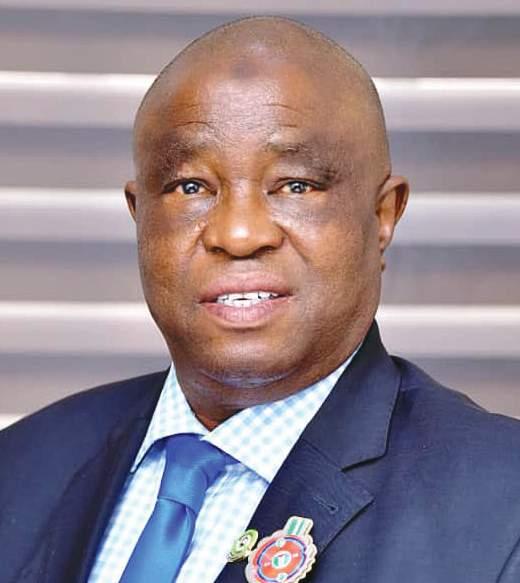
vision and steadfastness.
According to Illelah, “Your leadership and wisdom have been a shining light, illuminating the path, through day and night. As you retire from service, we celebrate your might, a career of distinction that has been a beacon in flight. We honour your commitment, your perseverance, and zeal. Momodu is a true public servant who has made a lasting impact. You will be deeply missed, but your legacy remains a testament to your persistence and bliss. We wish you a happy retirement, filled with joy and delight. Congratulations on your retirement, and may this new chapter bring happiness and fulfillment to you,” he prayed.
In his tribute, another personnel member of NDLEA Asamu Ngulde expressed his deepest gratitude and respect for his leadership, guidance, and mentorship throughout his time working with him. Ngulde averred, “Your dedication, expertise, and kindness have made a lasting impact on my career and personal growth. As you begin this new chapter in your life, I wish you a well-deserved rest, filled with joy, relaxation, and happiness. You have earned it! May your retirement be a time to pursue your passions, spend quality time with loved ones, and enjoy the fruits of your labour. Thank you for being an exceptional boss and an inspiration to me and many others. I will always cherish the memories and lessons learned under your leadership.”
Momodu’s elder sister, Late Mrs. Umani Sobotie, had this to say about him: “Sule Momodu is a child of destiny because of the circumstances surrounding his birth. I called him a fighter because his birth coincided with the civil war. There was an outbreak of smallpox that ravaged the country with no clear sign of reprieve, but he came out unscathed.”
She described him as a very hardworking, focused, and purposeful individual whose level of integrity is unrivaled. “He is conservative but with a broadened social outlook, highly rational to a fault. The bedrock of his progress is his acceptance
of correction based on facts,” she stated.
A Director of NDLEA, Mr. Ambrose Umoru, described Momodu as a goal-getter, unrelenting, frugal, hardworking, and an independent-minded person. Stating that he has known him for over 35 years, Umoru added that he is not tribalistic, he is compassionate, and most of all honest, stressing that he takes any task assigned to him seriously.
Ex-Director of NDLEA and Consultant for the United Nations, late Mrs. Chine Chizoba, said, “I have known Sule Momodu since 1991. He is a goal-getter, he has a firm belief in anything he is doing, determined, seeks knowledge, reads widely, writes, is a team player, and seeks to improve himself. He can be authoritative sometimes when he thinks he has all the facts on an issue. He is supportive of his friends and foes based on professionalism.”
Former Commandant at EFCC Academy, Ayo Peter Olowoniyi, said that Momodu is a brother, friend, and most especially a professional colleague, highly intelligent, hardworking, unbiased, and highly committed to any course he believes in.
Former Zonal Commander of NDLEA, Momodu Abdul, said he is a brother, friend, and colleague in the profession. He added that Sule Momodu is a highly complex man and is easily misunderstood, noting he is very hardworking and has a penchant for success. Abdul described him as a very focused and unrelenting person who can be a thorn in the flesh, as he is sometimes very persistent and domineering.
Retired Assistant Commander General, Dele Akingbade, described Momodu’s attitude to work as unparalleled. “I met him in the training department as an Assistant Director. He is an achiever and has high initiative, always churning out ideas, breaking new grounds, replicating his successes, and showing that they are no flukes. He achieved much in Bauchi and replicated it in Anambra. He is quick to anger, but he drives the officers to work for more than 24 hours. He is sociable, very frank, never forgets a friend, and loves his
passion for research and writing.”
His course mate at the History Department, University of Jos, Thelma Robert, said Momodu is an enigma, somebody you could not ignore.
“Either his legacy stares you in the face or he confronts you with his evergreen ideas. He has his way of interacting with people, and his vast knowledge about a variety of subjects sets him out. He hates injustice right from the beginning. He defends people’s rights, mobilizes for just causes, and innovates with his creative mind,” he recalled.
On his part, Justice Simon Aboki of Lafia High Court, said Momodu is not just very hardworking but also diplomatic, tenacious, and disciplined.
‘He has shown a high moral and ethical standard, and I envy his flair for writing, being the author of over five books,” he said.
Former Federal Road Safety Corps, Sector Commander, Anambra State, late Ajayi Sunday, described him as a highly intelligent officer who is passionate about service delivery and a coordinator par excellence.
“He is a team player and an honest person. A great achiever whose untiring posture is always towards humanity. A lover of the environment with a knack for high standards,” Ajayi said.
The former First Lady of Bauchi State, Hajiya Abiodun Isa-Yuguda, said Momodu is a role model who is highly passionate about his job. She averred that he sacrifices both his time and money for other people. “He helped Bauchi State in rehabilitating the youth; he helped me in establishing my NGO, gave me creative insights in the working and running of an NGO. He is a good adviser and a trusted man,” the former First Lady recalled.
Major General Isa Abdullahi, former Commander 302 Artillery Regiment Onitsha described Momodu as a thoroughbred professional, very articulate, sound-minded, and a great thinker. Major General Abdullahi, said, “he is a trustworthy friend, highly esteemed, and a fashion monger who exudes a high level of confidence and charisma.”
Former Commander, NDLEA Apapa Ports, Ameh Inalegwu, regretted that Momodu is a grossly misunderstood person who goes to any length to prove his point. “He has a high level of resilience, positiveness, and an articulate posture in service and duties. He is a good team player; he finds it difficult to pretend, and sometimes he is diplomatic. His love for the job is excellent. He loves a clean and classic environment,” he described.
Former Head of Service, Anambra State, Barr. Harry Ndu, said Momodu is a gentleman who attends to his job with every sense of responsibility. His approach to issues, he said, is fact-based, stressing that he was able to transform NDLEA in Anambra within a short time.
“The results are there for all to see, including the reduction of drug and substance abuse, reduction in crime, and the awareness in the State is like never before,” he stated.
Former State Director of DSS, Anambra State,Rtd Assistant Director General Yusuf Isiaku, said Momodu is a modest person who seeks to relate well with people and is a little aggressive. “He is a good team player, a great mobilizer, trustworthy, an achiever, and sometimes his success is beyond expectation. His organization is solid, and he can be individualistic in achieving his goal or that of the organization,” he averred.
Comptroller of Immigration, Lawal Melfashi (Rtd) said Momodu is highly cerebral, highly productive, a team player, and a workaholic. He stated that Momodu is an authority on drug enforcement and operation, adding, “he is somebody you can rely on, and he is also morally sound.”
Retired Assistant Inspector General of Police, Hosea Karma, stated that he is one of the highly intelligent officers “I know.” According to him, “His passion for work is extreme. His knack for knowledge is overwhelming, and he is a big team player. Sule Momodu is a great man, an asset to be proud of by Nigerians, not only NDLEA.” This outpouring of eulogies is a testament to Momodu’s commitment to the nation and his selfless dedication to the aspiration of a better, drug-free world. There is no doubt that retired Sule Momodu is part of those Shakespeare described in his famous play, Twelfth Night (Act 2, Scene 5), who “achieved greatness,” as he aptly fits the phrase: “Some are born great, some achieve greatness, and some have greatness thrust upon them.” In conclusion, the University of Jos-trained historian and drug abuse crusader, Sule Momodu, has indeed achieved greatness, and the testimonies of colleagues, stakeholders, friends, and relations about him are a loud, standing ovation for a champion.
Nigeria Projected to Generate 4mTonnes of Green Ammonia Annually by 2060
Arthur Eriye
The West African Science Service Centre on Climate Change and Adapted Land Use (WASCAL), has stated that given the right investments and frameworks, Nigeria has the capacity to generate four million tonnes of green ammonia annually by 2060.
The disclosure was made by WASCAL’s Executive Director, Prof. Emmanuel Ramde, at the Nigeria4H2 Project Results Workshop and End of Project Stakeholders’ Interaction, in Abuja.
The Nigeria4H2 project is being implemented in collaboration with the WASCAL, the Federal University of Technology, Akure, Afe Babalola University and Federal University of Technology, Minna, among others.
It seeks to assess the technical, infrastructural,
regulatory and investment landscape to harness Nigeria’s green hydrogen potential to power transportation, produce electricity and manufacture fertilisers based on green ammonia in Nigeria.
Ramde said this would enhance support for farmers, reduce dependence on imported fertilisers, strengthen national food security, and create thousands of green jobs across the value chain.
“Renewable energy plays a critical role in the energy transition for Africa, and Nigera has green hydrogen and renewable energy potential such as solar, wind and hydro power. In producing green hydrogen, it can play two roles – in the energy sector to power transportation and produce electricity, and in the agricultural sector, to produce fertiliser to boost food security in the region,” he said.
He underscored the need
to integrate green hydrogen into agricultural policy by positioning green ammonia as a core component of nigeria’s fertiliser strategy to boost productivity and sustainability.
“We are proud to report that, under three forward looking production scenarios developed within the framework of this project, Nigeria has the potential to unlock its potentials. Nigeria has the potential not only to meet a significant share of its domestic fertiliser demand through green ammonia but also to establish itself as a global player in the emerging green economy.
“The scenarios indicate that with the right investments, clear regulatory frameworks, and adequate infrastructure, Nigeria could generate over four million tonnes of green ammonia annually by 2060 to produce fertiliser.
Nestlé Nigeria Trains 100 Plastics Waste Workers for Sustainable Future
As part of its ongoing commitment to environmental sustainability and social inclusion, Nestlé Nigeria has launched a comprehensive Safety, Health, and Environment (SHE) Training Program, empowering 100 plastic waste workers across Lagos and Abuja. This initiative aims to enhance the safety and wellbeing of these invaluable workers while empowering them and promoting their dignity within the plastics recycling value chain.
Supported by the National Environmental Standards and Regulations Enforcement Agency (NESREA), the Recyclers Association of Nigeria (RAN), and the Food Beverage Recycling Alliance (FBRA), the training encompassed essential
topics such as best practices in occupational health and safety, responsible handling of recyclable materials, fire prevention and rescue techniques, and the proper use of Personal Protective Equipment (PPE).
Corporate Communications, Public Affairs, and Sustainability Lead for Nestlé Nigeria, Victoria Uwadoka, articulated the company’s motivation for this initiative, highlighting Nestlé’s commitment to building a waste-free future and the recognition of the role that the waste workers play in bringing this vision to life.
She said, “At Nestlé, we are committed to building a waste-free future
and recognize the crucial role plastic waste workers play in reducing pollution and facilitating a circular economy. This training is a vital component of our support for this key stakeholder group, enhancing Nigeria’s waste management infrastructure.”
During the opening ceremony in Abuja, Director General of NESREA, Prof. Innocent Barikor, praised Nestlé’s commitment to environmental sustainability, stating, “I commend Nestlé Nigeria Plc. for its commitment towards environmental sustainability and for prioritizing the health and safety of those at the frontline of waste management. Waste workers are often unrecognized yet play a crucial role in our national effort to combat plastic pollution in our environment.
Book Launch: Global Fundraiser to Empower 1,000 Women Nano Entrepreneurs
In a high-energy virtual event on 12 July, author and socialimpact LeaderOlasubomi
“Subomi” Sofowora premiered her debut Merged Chapters, a fusion of narratives drawn from personal and professional experiences with leadership insights and practical exercises that pushes the reader to be a better version of themselves while understanding the concept of time and seasons, and how to navigate through them.
Hosted by broadcaster Oluwaseun Olusegun, the launch opened with remarks from His Highness Muhammad Sanusi II, Emir of Kano and UN SDG Advocate Emeritus, who described the
book as “a guide to growth and resilience—one that can empower countless others on their own journeys,” and reminded guests that “when you empower a woman, you transform a generation.”
Executive coach Dr Laila St Matthew-Daniel praised the work as “a rare blend of sincerity and substance… it invites, offers presence, offers truth.”
Executive Director at Oando, Ayotola Jagun, called it “a roadmap and companion for anyone navigating growth, change or self-discovery,” crediting the chapters with guiding her through a pivotal career transition.
Arts and reflection framed
the ceremony, as literary enthusiast Bolu Sofowora delivered an emotive rendition of The Journey Within; a poem written by the author that opens the book.
Government and Corporate leaders—including Ogun State Commissioner for Women Affairs and Social Development Hon. Adijat Motunrayo Adeleye-Oladapo; Managing Director, Agro-Allied, Flour Mills of Nigeria, Mr. Sadiq Usman joined to endorse the initiative.
Dignitaries such as Amb. Nimi Akinkugbe, Olootu Dipo Sofowora, and Brenda Nwagwu were also recognised for championing womenfocused development.
Sabreworks’ Half-Year Retreat Celebrates Hard Work, Dedication
Mary Nnah
Sabreworks’ Half-Year Retreat was a grand celebration of the company’s core values: hard work and dedication. The event brought together top-performing realtors and staff members who had demonstrated exceptional commitment to excellence.
The atmosphere was electric as winners received life-changing prizes, acknowledging their tireless efforts and unwavering dedication. Through heartfelt speeches and
testimonials, attendees shared their journeys, highlighting the support and opportunities provided by Sabreworks.
The company’s leadership emphasised the importance of recognising and rewarding outstanding performance, fostering a culture of excellence and teamwork. As the retreat concluded, participants left inspired, motivated, and more united than ever, ready to drive Sabreworks’ continued success.
The event, held at the
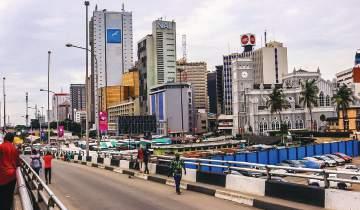
prestigious Shoregate Hotel Conference Hall in Ikeja GRA, brought together the company’s best talent for a day of celebration, networking, and recognition. MD/CEO of Sabreworks, Mr. Olusegun Phillips, expressed his heartfelt appreciation for the team’s unwavering commitment, stating, “Our success at Sabreworks is built on the resilience, dedication, and excellence of our realtors. You are the driving force behind every milestone we achieve.”
Stock Market Up N153bn on H1 Earnings Report Optimism
Kayode Tokede
The Nigerian stock market yesterday commenced the week on a positive note with a gain of N153 billion, reflecting sustained investor optimism over half year ended June 2025 corporate earnings of listed companies.
The Nigerian Exchange Limited All-Share Index (NGX ASI) gained 241.11 basis points or 0.18 per cent to close at 131,826.77 basis points with the Month-to-Date and Year-
to-Date returns settled higher at +9.9per cent and +28.1per cent, respectively.
Also, market capitalisation rose by N153 billion to close at N83.394 trillion. On sectors, performance was mixed as the NGX Industrial Goods Index (+1.5per cent) and NGX Consumer Goods Index (+0.1per cent) closed higher, while the NGX Insurance Index (-1.4per cent), NGX Banking Index (-0.4per ceent), and NGX Oil & Gas Index (-0.1per cent ) declined.
Despite the upbeat performance, market breadth tilted negative, as 31 stocks advanced, while 44 declined. Cutix, International Energy Insurance and NCR Nigeria emerged the highest price gainer of 10 per cent each to close at N4.07, N2.20 and N7.26 respectively, per share.
The Initiates Plc (TIP) followed with a gain of 9.97 per cent to close at N11.03, while Caverton Offshore Support Group up by 9.75 per cent to close at N7.09, per share.
On the other side, Meyer led
others on the losers’ chart with 10 per cent to close at N18.90, per share. McNichols followed with a decline of 9.95 per cent to close at N3.44, while Thomas Wyatt Nigeria declined by 9.84 per cent to close at N3.39, per share.
DEAP Capital Management & Trust lost 9.77 per cent to close at N1.20, while Sovereign Trust Insurance depreciated by 9.63 per cent to close at N1.22, per share. The total volume traded decreased by 78.91 per cent to 706.039 million
units, valued at N21.559 billion, and exchanged in 30,750 deals. Transactions in the shares of Access Holdings led the activity with 61.732 million shares worth N1.636 billion.
Consolidated Hallmark Holdings followed with an account of 43.984 million shares valued at N133.777 million, while Chams Holding Company traded 38.662 million shares valued at N118.426 million.
United Bank for Africa (UBA) traded 32.888 million shares worth N1.504 billion, while Zenith Bank traded
24.604 million shares worth N1.728 billion. Analysts at Futureview Group said that “the equities market is expected to trade slightly positive, supported by investor interest in undervalued stocks and anticipated strong earnings releases.
“However, gains may be tempered by cautious positioning ahead of the MPC meeting and a scheduled T-bills auction, which could redirect liquidity from equities. Overall, the NGX-ASI is likely to post a modest uptick.”
PRICES FOR SECURITIES TRADED ASOF JULY/21/25
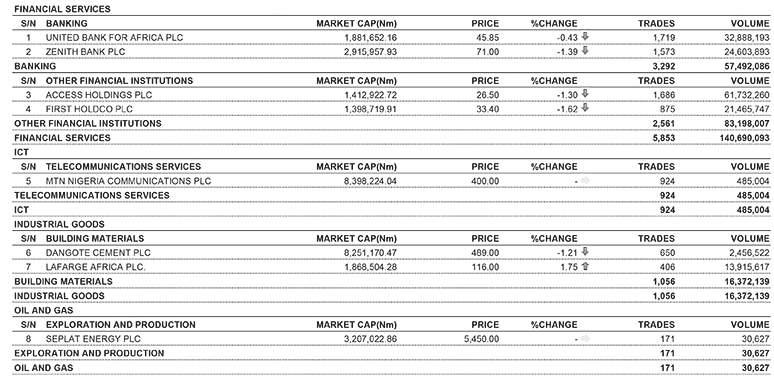
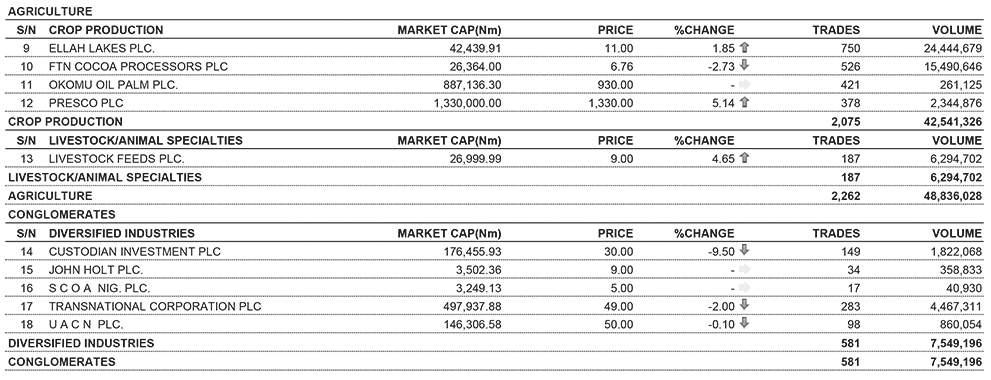

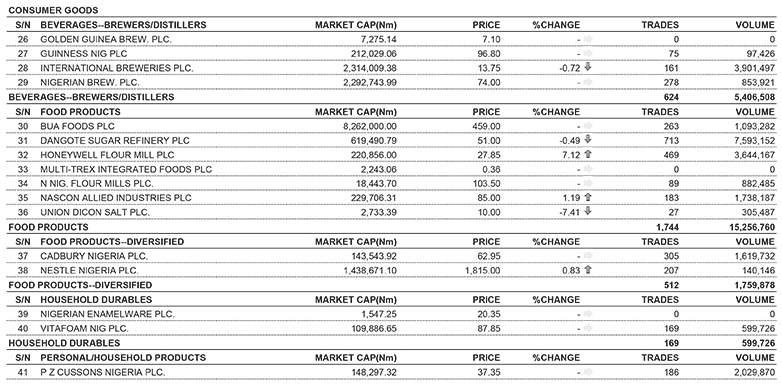

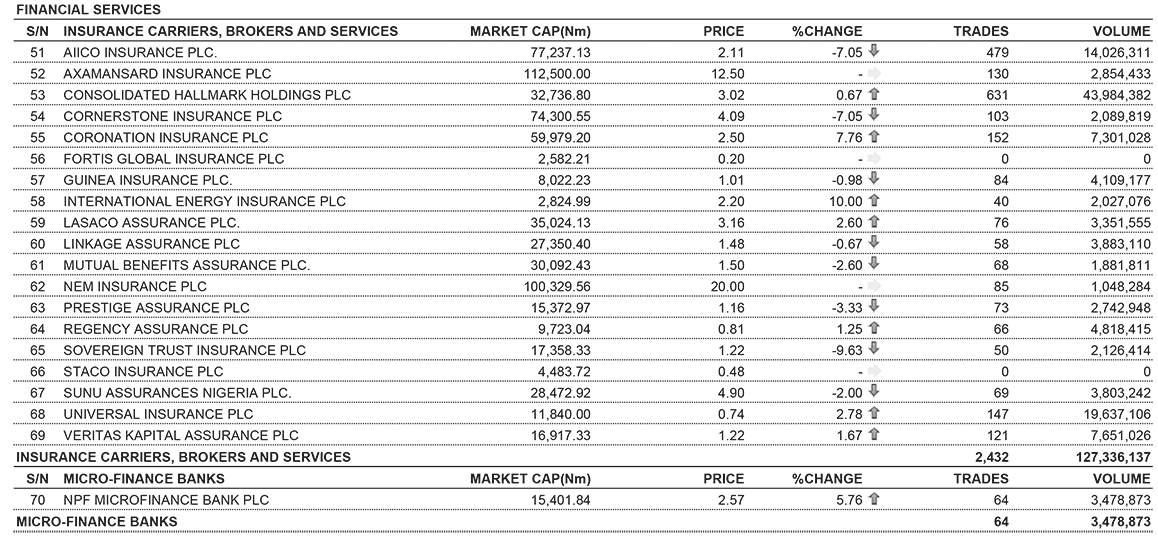

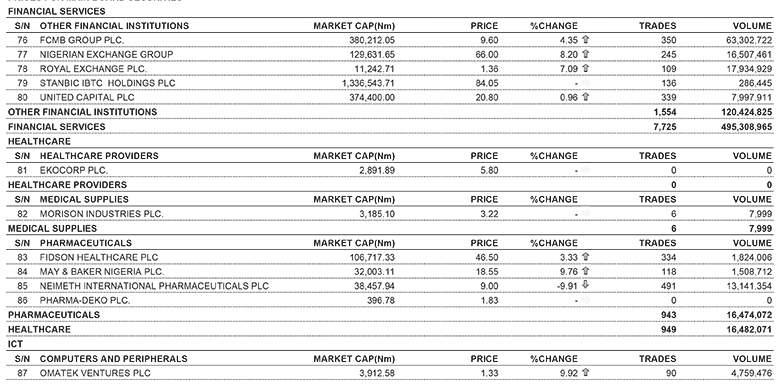
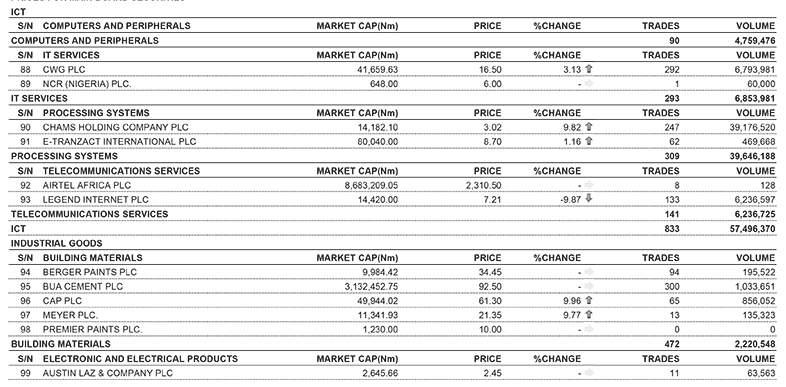

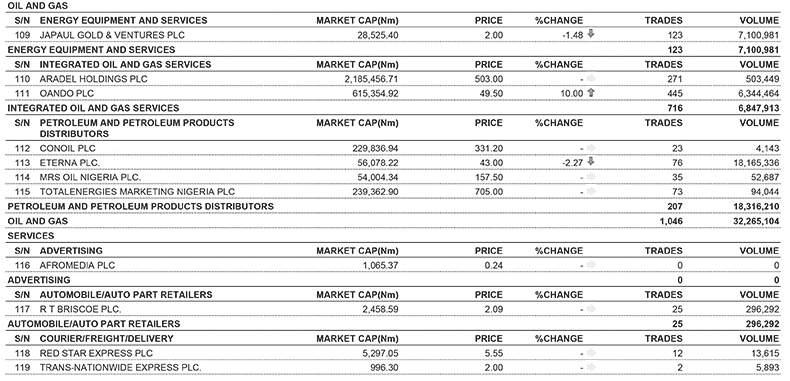

A Mutual fund (Unit Trust) is an investment vehicle managed by a SEC (Securities and Exchange Commission) registered Fund Manager. Investors with similar objectives buy units of the Fund so that the Fund Manager can buy securities that willl generate their desired return.
An ETF (Exchange Traded Fund) is a type of fund which owns the assets (shares of stock, bonds, oil futures, gold bars, foreign currency, etc.) and divides ownership of those assets into shares. Investors can buy these ‘shares’ on the
floor of the Nigerian Stock Exchange.
A REIT (Real Estate Investment Trust) is an investment vehicle that allows both small and large investors to part-own real estate ventures (eg. Offices, Houses, Hospitals) in proportion to their investments. The assets are divided into shares that are traded on the Nigerian Stock Exchange.
GUIDE TO DATA:
Date: All fund prices are quoted in Naira as at 17 Jujy-2025, unless otherwise stated.
DAILY PRICE LIST FOR MUTUAL FUNDS, REITS and ETFS
Nigeria Misses Budget Oil Output Target by Over 70m Barrels in H1

Nigeria underperformed its 2025 budget crude oil production target in the first half of 2025 by over 70 million barrels or about 19 per cent, a shortfall that may compound the federal government’s fiscal challenges and undermine key economic projections for the year.
Data obtained from the Nigerian Upstream Petroleum Regulatory Commission (NUPRC) showed that the country pumped a total of 303,194,677 barrels of crude and condensates from January to June 2025.
THISDAY’s checks indicated that this figure fell significantly below the government’s projected benchmark of 2.06 million barrels per day, which would have yielded approximately 373.86 million barrels over the same period.
The actual shortfall of about 70.67 million barrels, based solely on crude and condensate production, does not take into account possible additional losses from shut-ins, theft, sabotage, or deferred output due to operational setbacks.
A detailed breakdown from the NUPRC data showed that Nigeria produced 53,861,877 barrels in January; 46,824,697 barrels in February; 49,717,065 barrels in March; 50,499,206 barrels in April; 51,380,475 barrels in May; and 50,911,357 barrels in June.
On the average, the country produced about 1.67 million barrels per day during the six-month period, well below the budget assumption of 2.06 million barrels per day budget benchmark for the period.
Although the federal government has said that there’s no cause for concern, the underperformance has
recently sparked concerns across economic and policy circles, as crude oil earnings remain the bedrock of Nigeria’s foreign exchange inflow and government revenues, even in an era of expanding focus on non-oil sources.
Using a conservative average Brent crude price of $72 per barrel for the period, Nigeria’s estimated revenue loss from the H1 2025 production shortfall of about 70.67 million barrels, that is, covering January to June was approximately $5.09 billion, based on the volume gap alone.
The actual impact could be even larger when fiscal oil terms, crude differentials, and production sharing contracts are factored in. While the federal government had banked on increased output to drive key infrastructure spending and fund critical budgetary items, the shortfall risks putting pressure on external
borrowing, the value of the naira, and debt servicing capabilities.
The International Monetary Fund (IMF) earlier in the month raised concerns over the issue, saying that it expects the gulf between this year’s budgetary spending and revenue of Africa’s biggest oil producer to widen further in the face of geopolitical threats to the prices of crude, which contributes around two-thirds of government income.
“Downside risks have increased with heightened global uncertainty,” the Fund stated in its periodic review of economic developments in the country. “A further decline in oil prices or increase in financing costs would adversely affect growth, fiscal and external positions, undermine financial stability and exacerbate exchange rate pressures,” the IMF added in the document titled “Nigeria: 2025 Article IV
Consultation.”
It alerted authorities to the danger that Nigeria’s financing needs and fiscal position may vary from forecasts, should the government fail to revise the budget and announce new targets for its spending plan.
In the same vein, Nigeria only struggled to meet its Organisation of Petroleum Exporting Countries (OPEC) quota this June, having consistently failed to do so for a long time, specifically since January when it temporarily achieved the feat.
In January it produced 1.53 million bpd; 1.46 million bpd in February; 1.4 million bpd in March; 1.48 million bpd in April; 1.45 million bpd in May before it finally touched the 1.5 million bpd this June. While OPEC does not calculate condensate, Nigeria adds it to its targeted oil output yearly.
Adding to these worries, the World
Bank recently warned that Nigeria faces a growing risk of a widening budget deficit if oil production continues to underperform.
In May, the World Bank described Nigeria’s 2025 federal budget as overly ambitious, warning that the federal government may be forced to turn to the Central Bank of Nigeria’s Ways and Means facility to finance likely revenue shortfalls. Giving the warning during the public presentation of its Nigeria Development Update report titled ‘Building Momentum for Inclusive Growth’ in Abuja, the Bank said that despite strong revenue gains recorded in 2024, Nigeria’s 2025 budget assumptions remain optimistic and may prove difficult to meet.
Dike Onwuamaeze
The KPMG has declared that the ongoing government reforms, stability in foreign exchange (FX) market, current banking recapitalisation and growing investors’ confidence on government’s policies are expected to drive the anticipated growth momentum in the Nigerian manufacturing sector.
This is as Andersen Nigeria has said that the unfolding tax regime would provide significant advantages for manufacturing companies as zerorating of essential manufacturing

inputs would reduce production costs while supporting import substitution objectives.
The KPMG made this declaration last week in a presentation by Senior Partner KPMG Nigeria and CEO KPMG West Africa, Mr. Tola Adeyemi, titled, “Nigeria’s Economic Scorecard: Agriculture, Manufacturing, and Services” at the Lagos Chamber of Commerce and Industry (LCCI) 2025 Mid-Year Economic Review and Outlook Conference.
Adeyemi was represented at the event by a Partner, KPMG
Professional Services Nigeria, Mr. Mohammed Adama.
Adeyemi said: “The manufacturing sector is expected to experience moderate growth on the back of growing investors’ confidence arising from ongoing reforms, and also access to regional markets due to the takeoff of the African Continental Free Trade Area (AfCFTA) and government policy support.”
According to him, factors that would drive the growth in the manufacturing sector include the recapitalisation of the commercial banks and development financial

institutions (DFIs), energy reform and infrastructure development, and enhancement of ease of doing business in the country.
He said that there would be improved access to long term capital from full implementation of the Central Bank of Nigeria’s directive regarding the banking sector’s recapitalisation and ongoing reforms.
According to him, “DFIs like BOI are expected to deepen targeted interventions in priority subsectors (e.g. agro processing, light manufacturing),” adding that
ongoing power sector reforms and mini-grid projects could reduce manufacturers’ reliance on diesel, which would improve their margins.
He also said that “higher infrastructure spending and the rollout of new and upgraded special economic zones (SEZs), industrial parks, and transport logistics corridors (rail, inland ports, dry ports) to ease logistics bottlenecks” would bolster Nigeria’s industrial output.
According to him, the ongoing fiscal and monetary reforms have resulted to stability in the FX market.
“The new tax and fiscal policy

reforms/the new tax law brought about by the presidential Committee on Fiscal Policy and Tax Reforms has streamlined taxation and is expected to ease compliance burden on businesses.”
He, therefore, tasked the government to unlock access to long-term finance needed for critical long-term projects by strengthening and recapitalising DFIs like Bank of Industry (BOI), Nigeria Export and Import Bank (NEXIM) and others.




Customs Intercepts Six Truck Loads of Rice, Others Worth N1.78bn
Eromosele Abiodun
The Nigeria Customs Service (NCS), Federal Operations Unit (FOU), Zone ‘A’ Ikeja over the weekend announced the interception of contraband worth over N1.78 billion in the South-West within 45 days.
The seized items, it stated, are six truck loads of 50kg rice, 304kg of Cannabis Sativa (Indian Hemp), 7,900 litres of Premium Motor Spirit (PMS), one 40ft container load of used tyres, among others between 3rd June and 18th July 2025.
Speaking to Journalists, the Comptroller-General of Customs, Bashir Adewale Adeniyi, explained
that a total of nine suspects were arrested in connection with these seizures.
Represented by the Assistant Comptroller General of Customs and Coordinator for Operations Whirlwind, Hussein Ejibunu, he said the seizures were intelligence-driven.
According to him, “In the past four weeks, from 3rd June to 18th July 2025, the Unit has sustained a high operational tempo across the South-Western states. Our intelligence-led operations have enabled us to proactively intercept smuggled goods, disrupt illicit supply chains, and strengthen border enforcement.
SON Vows to Protect Local Manufacturers for Nation’s Industrial Growth
Hammed Shittu in Ilorin
Director General, Standards Organisation of Nigeria (SON), Dr. Ifeanyi Chukwunonso Okeke has reiterated his commitment to continue to protect and the growth of local manufacturing companies in the country in the bid to enhancing the industrialisation of the nation. Such development, Okeke said, would also reduce the production of sub standards products and thereby accelerating the economic growth of the country.
Speaking in Ilorin, Kwara state capital while declaring open a one-day Stakeholders Forum for Manufacturers, MSMEs, Importers and Exporters, Okeke said the protection of local manufacturing companies remains a main agenda of the present administration in its tasks to discourage importation of goods and services.
The theme of the workshop is Standard- “The Pillar for Innovation, Safety and Sustainable Development.”
Represented by the SON Director, Corporate Affairs, Mrs. Talatu Ethan,
Group Business Editor
eromosele abiodun
Deputy Business Editor
Chinedu eze
Comms/e-Business Editor
emma Okonji
Asst. Editor, Energy
emmanuel addeh
Asst. Editor, Money Market
Nume ekeghe
Correspondents
KayodeTokede(CapitalMarkets)
James emejo (Finance)
ebere Nwoji (Insurance)
Reporter Peter uzoho (Energy)
he said: “One of the cornerstones of this administration’s industrial policy is the “Nigeria First Policy. This is not just a directive from above, it is a challenge to every Nigerian to look inward, support homegrown solutions, and raise the quality of local production. For this vision to be meaningful, we must anchor it on credible quality infrastructure.
“At SON, we are responding by scaling up our certification, training, and monitoring systems to give Nigerian-made products the credibility they deserve Let me make this clear promoting the Nigeria First Policy is not about excluding others: it is about preparing ourselves. It is about positioning Nigerian entrepreneurs, artisans, and manufacturers to compete favourably not just within our borders, but across West Attica and beyond Standards are how we translate patriotic intention into economic success.”
He added, “Today’s workshop is a platform for knowledge sharing, yes, but more than that it is a space for reorientation. We must move from seeing standards as regulatory burdens to understanding them as business enablers. Compliance with standards is not a favour to SON, it is an investment in your own credibility. competitiveness, and long-term relevance.”
Okeke said stakeholders were invited to reflect on how innovation can thrive in an environment of order and predictability.
Also speaking at the event, the Regional Director, North Central, SON, Dr. Marline Wasiri stressed the need for the stakeholders to continue to ensure the production of quality of their products.
This, she said, would go a long way of giving them integrity and also allowing their products to compete with other products in the international markets.
She said: “As the Regional Director for the North Central of SON, I want to emphasise that our mandate is not just to regulate but also to support, guide and empower businesses particularly our small and medium-scale enterprises and local manufacturers to grow, compete and thrive both locally and internationally.”
“During this period, a total of 102 enforcement interventions were recorded, leading to the interception of a wide range of prohibited and smuggled goods. Breakdown of major seizures during this period includes: 3,500 bags of foreign parboiled rice (50kg each) – equivalent to six trailer loads; 304kg of Cannabis Sativa (Indian Hemp); 7,900 litres of Premium Motor Spirit (PMS) – in 316 jerry cans of 25 litres each; 54 bags and 20 bales of used clothing; 41 sacks and bags of used footwear; 14 units of used (“Tokunbo”) vehicles; 148 pieces of used tyres; 42 used gas cylinders;
31 units of air conditioning systems; and 95 cartons of frozen poultry products.
“Other notable seizures include one 40ft container with container number TRHU 83907321 fully loaded with used tyres; one 20ft container with number ONEU241369 containing medicaments; two 40ft containers with numbers MSKU 4796036 and MAEU 9205708; and one truck with container body conveying used fridges, foreign supermarket items, and used clothes. All the containers were wrongly declared to evade duties.”
On arrests and prosecution, he
said, “A total of nine suspects were arrested in connection with these seizures. While some were granted administrative bail, others have been, or will be, handed over to relevant security agencies for further investigation and possible prosecution.”
Adeniyi explained that the Duty Paid Value (DPV) of all intercepted items stand at an impressive N1.78 billion.
Adeniyi also added that the unit recovered a total of N95.6million in underpaid duties within the period under review.
He stated: “The Unit also ensures compliance with import and export
regulations. We have continued to scrutinise questionable declarations, correct under-valuations, and issue Demand Notices (DNs) where appropriate. Between 3rd June and 18th July 2025, the Unit recovered a total of N95.6million in underpaid duties.
“While we maintain vigilance against smuggling and fraud, the FOU remains a strong partner in trade facilitation. We continue to support legitimate trade through intelligence-driven operations that strike a balance between security enforcement and economic growth, ensuring that lawful traders are not unduly hindered in the process.”
Stories by Emmanuel Addeh in abuja
Seplat Energy Plc, has reinforced its commitment to responsible leadership and sector transformation, noting that with its indigenous capacity and deployment of innovative strategies, it was set to markedly impact the oil sector in the country positively.
Participating in the 13th Annual BusinessDay CEO Forum Nigeria, with the theme, “Nigeria: From Reform to Recovery,” Seplat Energy’s Chief Executive Officer, Mr. Roger Brown, represented by
the company’s Chief Operating Officer, Mr. Samson Ezugworie, underscored the increasing role of indigenous companies, and how Seplat has been leveraging technology to enhance operations and build in-country capacity.
The 2025 edition of the CEO Forum brought together senior government officials, investors, corporate leaders and experts to discuss Nigeria’s ongoing reforms, and share strategic insights for national renewal and sustainable economic growth.
Brown was a panelist on one of the high-level sessions with the sub-theme: “Oil and Gas in Transition – Reforms, Recovery
and Deals That Matter”.
He shared perspectives on Nigeria’s oil and gas transformation, the increasing role of indigenous companies, and how Seplat has been leveraging technology to enhance operations and build in-country capacity.
“If you look at the trajectory, I would personally say that the outlook is very excellent, and we are well-positioned for a transformative oil and gas industry,” Brown stated, according to a statement from the organisation.
“Nigeria is rich in both oil and gas resources — with over 200
trillion cubic feet of gas — we are in the right place. We are also seeing international oil companies exiting the onshore and shallow water areas and transferring them to indigenous players,” he added Earlier, Publisher and CEO of BusinessDay Media Limited, Frank Aigbogun, welcomed guests with a compelling address that framed the tone of the forum. He noted the theme of this year’s CEO Forum — “Nigeria: From Reform to Recovery”, as BusinessDay has a duty not only to report, but also to point the way to the future.
The Nigerian Midstream and Downstream Petroleum Regulatory Authority (NMDPRA), in partnership with S&P Global Commodity Insights, has announced the inaugural West African Refined Fuel Conference.
The two-day event scheduled to hold in Abuja, it said, is designed to provide a foundational platform for exploring the potential development of the West African reference market for
refined fuels .
A statement by the Director, Public Affairs Department, George Ene-Ita, stated that the meeting will focus on regional standardisation, pricing mechanisms, data transparency, stakeholder collaboration, market fundamentals and participation, expansion of in-country refining capacity and infrastructure development.
Besides, a major focus will be placed on developing
frameworks for data transparency, standardisation, and cross-border collaboration for building a robust and reliable pricing reference mechanism in West Africa.
“In addition to these goals, the conference will foster conversations around the regulatory, operational, and infrastructural requirements necessary for developing an integrated market.
It is expected to bring together key stakeholders from
across the energy value chain including regulators, ministries of petroleum/energy across Africa, regional organisations, national and international oil companies and private refiners.
“Other stakeholders are depot and terminal operators, African oil and gas associations, financial institutions, multilateral organisations, Oil & Gas traders, marketing companies, ship owners and marine service providers,” the statement added.
Umahi Inspects Damaged Flyover at Keffi, Directs Urgent Intervention
The Minister of Works, David Umahi, at the weekend inspected the damaged flyover at Keffi, Nasarawa state, caused by an overburdened truck carrying an excavator, and directed urgent intervention to ameliorate the hardship encountered by users of the infrastructure.
A statement by the Director, Press and Public Relations, Mohammed Ahmed, stated
that the impact of the collision completely dislodged one of the beams and damaged two others, with the on-the-spot assessment undertaken on Sunday. The minister, who was accompanied by the Deputy Director, Design and Bridges, Musa Seidu; Federal Controller of Works, FCT, Yakubu Usman and other officials disclosed that he had directed the
Permanent Secretary, Olufunso Adebiyi, along with a team of engineers, to visit the damaged infrastructure on the day of the incident.
Following their preliminary inspection, which revealed visible cracks on the structure caused by the force of the impact, Umahi ordered the immediate closure of the affected carriageway of the flyover to traffic to prevent
further damage, as well as mitigate risk.
While one beam has fallen entirely and damaged the walkway and parapet, the other two beams, though damaged, he said, have retained their structural integrity, according to the engineers. The underpass has been cleared, but the overpass remains closed as a precaution, the statement said.
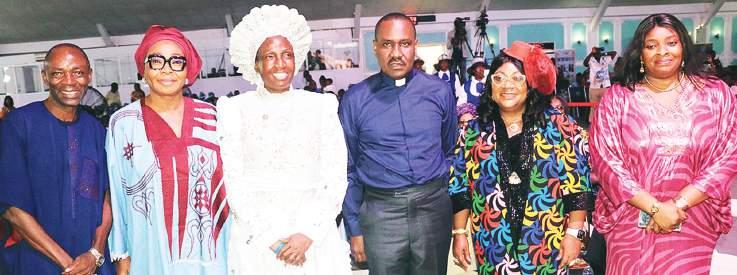
20TH ANNIVERSARY OF CELEBRA8 MUSIC FESTIVAL...
L-R: National President, Gospel Musicians’ Association of Nigeria, Dr. Philip Olufemi Olayiwola; representative of Holy Trinity Anglican Church, Ms. Oduyale Abisola; Founder, Love of Christ Generation Church, Reverend Mother Esther Ajayi; Senior Pastor, Trinity House, Pastor Ituah Ighodalo; Gospel Artiste, Ms. Elizabeth ‘Ehiliz’ Ehigiamusoe; and Board Member, Celebra8 Gospel Music Festival, Pastor Olamide Ajayi, during the 20th anniversary of the Celebra8 Music Festival held in Lagos…recently
Global Anti-money Laundering Watchdog, FATF Invites Nigeria to Join Fight Against Terror Financing
The global Anti-money laundering watchdog, Financial Action Task Force (FATF) has invited Nigeria to participate in its consultative processes, a remarkable recognition of the the nation”s rising influence in the fight against money
laundering and terrorism financing.
This was according to an invitation letter addressed to the Director/ CEO of the Nigerian Financial Intelligence Unit (NFIU), Hafsat Abubakar Bakari, by the FATF President, Elisa de Anda Madrazo. FATF is the global body established in 1995 to lead international
action to combat money laundering, terrorism, and proliferation financing.
Nigeria was on February 24, 2023 placed on the FATF Grey List due to increased capital inflows and deficiencies in combating money laundering, terrorism, and arms financing.
Since then, the country which has made significant strides to exit the grey list is on the final lap of being delisted.
The FATF invitation disclosed that Nigeria will be engaged under the FATF Style Regional Bodies (FSRB) jurisdictions guest initiative for a period of one year.
Although the FATF’s operational rules do not permit guest participants or observers to be involved in decision-making processes, Nigeria’s participation will allow it to contribute its national and regional perspectives to discussions, under its own flag, rather than as part of a regional bloc.
Court Declines Yahaya Bello’s Travel Request over Unsigned Medical Report
Justice Emeka Nwite of a Federal High Court, Abuja, on Monday, refused to grant the request by the immediate past governor of Kogi State, Yahaya Bello, for permission to travel abroad for medical attention.
Justice Nwite turned down the request on the grounds the medical report attached to the application for the release of his international passport, for the proposed foreign medical trip was not signed by its maker.
The former governor who is being prosecuted by the Economic and Financial Crimes Commission (EFCC), had in June filed an application, seeking the release of his travel document to enable him travel to the United Kingdom for medical attention.
After taking arguments from EFCC’s and Bello’s lawyers, the judge had fixed July 21, to rule whether the said documents should
be released to enable the former governor travel abroad for his health needs.
Recall that the EFCC had urged the court to deny the grant of the application for being an abuse of court process amongst others.
But the court disagreed that the application was an abuse of court, faulting however, the attached medical report for the release of the travel documents.
The judge observed that counsel to the defendant argued the applicant was a known hypertensive patient for about 15 years.
The lawyer, Joseph Daudu, SAN, was also said to have presented Exhibits A and B, which constituted expert report on the health status of the applicant, saying that sufficient materials had been placed before the court to exercise its discretion in favour of the applicant.
Besides claim of alleged abuse, the prosecution had submitted that the reliefs sought were similar and that the motion was technically
incompetent because the sureties to the defendant were not informed.
Justice Nwite in the ruling however, held that the matter before the court was Yahaya Bello v. FRN, and not vs the sureties, adding that the sureties ought not to be included in the application.
“The counsel to the complainant did not cite any section of the law that says sureties should be given notice or made a party in the motion on notice.
“The counsel did not cite any law, whether locally or internationally, to back his argument.
“On the abuse of process of court, it is the argument of the complainant that the instant application is incompetent and amounts to abuse of court process.
“It is not in dispute that the applicant is standing trial before this court and FCT court and it is not in dispute that the applicant was granted bail in this court on December 13, 2024 and at FCT High Court on December 19, 2024.
Edo By-election: Okojie, Igbinedion, Ikpea, Others Emerge Candidates of APC, PDP and LP
Adibe Emenyonu in Benin City
Joseph Ikpea, Gabriella Omosede Igbinedion, Joe Okojie and Jonny Aikpitanyi have emerged as candidates of the All Progressives Congress (APC) and the Peoples Democratic Party (PDP) for the Edo Central Senatorial and Ovia Federal Constituency in the August 16 by-election scheduled by the Independent Electoral Commission (INEC)
Also elected is John Okojie of
the Labour Party (LP) for the Edo Central Senatorial District.
The Edo Central seat, and the Ovia Federal Constituency seats became vacant following election the of Senator Monday Okpebholo as governor; and Dennis Idahosa as deputy governor, respectively.
Prince Joe Okojie emerged as the winner of the PDP primary election which held in Ubiaja, Esan South East Local Government Area of the state on Monday,
July 21, 2025 after defeating John Yakubu and Friday Itulah.
Meanwhile, Joseph Ikpea emerged as the sole candidate of APC for the Edo Central senatorial seat; Gabriella Omosede Igbinedion also emerged as the sole candidate for the Ovia Federal Constituency seats.
Aikpitanyi emerged as PDP candidate for House of Reps by-election in Ovia, Paul Okojie became the candidate of LP for Edo Central senatorial seat.
“The FCT High Court, in its ruling, said that the applicant must seek the leave of the court. Hence, this instant application does not amount to abuse of court process.
“It is also the fact that this court and the FCT High Court are courts of coordinate jurisdiction,” Justice Nwite stated.
The court, however, held that Exhibit B, which was the medical report provided by a doctor, was not signed by its maker, and as such, lacked any legal efficacy.
The Court emphasized that an unsigned document carries no
weight in law and is considered worthless.
“In other words, Exhibit B is devoid of probative value and cannot be relied upon by the Court,” the judge held.
“The defendant has failed to place sufficient material before this court for his passport to be released for him to travel. Consequently, this application is hereby refused,” Justice Nwite said.
The case was thereafter adjourned to October 7 and 10 and November 10 and 11, 2025, for continuation of trial.
Before now, Nigeria had only participated in FATF meetings through the Inter-Governmental Action Group Against Money Laundering in West Africa (GIABA) delegation.
The FSRB guest initiative is a major component of the FATF’s ongoing efforts to diversify perspectives that shape the global Anti-Money Laundering/Counter Financing of Terrorism (AML/CFT) standards. The initiative, launched by the current Mexican presidency of the FATF, also seeks to deepen understanding of FATF processes among participating countries and empower them to advocate for global financial integrity.
In her remarks on the FATF invitation, the NFIU Director/ CEO, Hafsat Abubakar Bakari, described it as a validation of Nigeria’s ongoing reforms in the AML/CFT space.
She said, “The positive reforms of Nigeria’s AML/CFT framework are a vital part of the administration’s efforts to boost economic growth and development. This invitation by the FATF is a signal that we are on the right track and will reinforce our commitment to ensuring these standards are fully entrenched not just in Nigeria but across the wider region.”
At AAAN Gala Night, X3M Ideas, SO&U, Noah’s Ark, Others Shine
The 52nd Annual General Meeting and Congress of the Association of Advertising Agencies of Nigeria (AAAN) came to a close in Ibadan on Saturday with a Gala Night that spotlighted emerging talent and honoured key contributions within the industry. The event marked the culmination of a three-day gathering that combined business deliberations, knowledge exchange, and community building.
One of the highlights of the evening was the presentation of the Rising Star Award to five young professionals nominated from leading agencies.
Among those recognised were Ayoade Omolola of X3M Ideas, Chidera Okpala of SO&U, and Faruq Alimi of Noah’s Ark.
They were joined by Deborah Folaranmi of Wunderman Thompson and Leah Afolabi of Leo Burnett, all acknowledged for their creativity, dedication, and potential to shape
the industry’s future.
The mood turned solemn during a posthumous tribute to the late Suleman Omone-Ogie Momoh, who was honoured for his outstanding service and leadership.
A moment of silence was observed by members of the association as they reflected on his legacy and contributions to the sector.
Earlier in the day, AAAN held its business session, of which a key development was the induction of eight new agencies as associate members.
The new entrants, spanning traditional, experiential, and digital marketing, were welcomed as part of the association’s continued expansion.
The AGM began on Thursday with a fireside chat with the Director-General of the Advertising Regulatory Council of Nigeria
(ARCON), Dr. Lekan Fadolapo. On Friday, there were keynote addresses by Idowu Akinde, Managing Director of Impact Hub Lagos, and Bolanle Osotule, General Manager and Head of Brand Marketing and Advertising at Airtel Nigeria. The day also included panel discussions that explored trends in innovation, governance and the evolving landscape of marketing communications.
In his closing remarks, AAAN President Lanre Adisa described the Congress as “a time of reflection, renewal, and resolve.”
He noted that the sessions had reinforced the association’s commitment to fostering a forward-looking, inclusive, and self-aware industry. He also praised the participation of young professionals and stressed the importance of continuing conversations around creativity, regulation and agency growth.
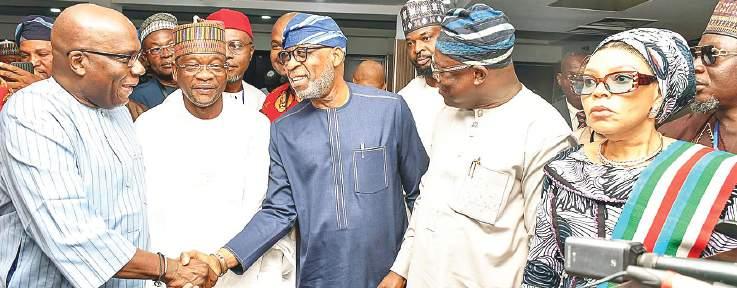
CAPACITY BUILDING SEMINAR FOR APC PUBLICITY SECRETARIES...
Shettima Raises the Alarm Over Depletion of Nigeria’s Forest
Says over 90% of original forest affected Netzence contributing tech to unlock $2bn of nation’s forest, says Sani
Deji Elumoye in Abuja
Vice President Kashim Shettima has raised alarm over the depletion of nation’s forest and warned about the critical state of Nigeria’s woodland and its dire economic implications.
This is just as the CEO of Netzence Sustainability Limited (Netzence), Dr. Sadiq Sani, assured Nigerians that it is using technology to unlock the over two billion dollars of potentials in the forest sector.
Declaring open the Nigeria Forest Economy Summit 2025 themed: “Sustainability of Nigeria’s Forests: Unlocking the $2 billion Potentials for Economic and Financial Inclusion” at the State House, Abuja, on Monday, Shettima declared that “more than 90 percent of Nigeria’s original forest cover has been depleted, and over 400,000 hectares lost annually. This is not just an environmental crisis; it is an economic emergency.”
Represented by the Deputy Chief of Staff to the President, Senator Ibrahim Hadejia at the summit organised by the Presidential Committee on Economic and Financial Inclusion (PreCEFI) Secretariat, the vice president stressed the country is at a crossroads and that neglecting forest resources directly impoverishes the nation and its people.
According to him: “We cannot underestimate the importance of our forests. They are a treasure trove of biodiversity, timber, medicinal plants, and other valuable products that
underpin agriculture, trade, health, climate resilience, and finance. Yet this vast potential remains largely untapped.”
Stressing the global opportunities Nigeria risks missing if it fails to act decisively, Shettima said: “Look at Vietnam, earning over $15 billion yearly from forest exports. Brazil’s Amazon contributes 15 percent of their GDP from forests alone. Ethiopia has generated 350,000 jobs through reforestation and value chains. Nigeria should not only replicate these successes but lead Africa’s forest industrialization.
“Ignoring this challenge is not an option. Our forests’ depletion threatens economic stability, livelihoods, and our global trading position. The European Union’s upcoming regulations forbid imports from products sourced on lands deforested within five years.
“Nigeria risks losing access if we do not embrace sustainable forest management now.”
The vice president therefore called for innovation and inclusion, saying: “Embedding financial services in forest-based livelihoods will improve credit access, savings, insurance, and digital tools - crucial for the 30 million Nigerians who remain financially excluded, especially women and girls.”
He envisioned a future where “eco-industrial parks dedicated to bamboo, shea butter, medicinal plants, and carbon verification emerge as economic pillars,” further urging, “Let us turn trees into trillions and forests
into futures. This summit must be remembered not as just another policy dialogue, but as a turning point where we invest, innovate, and industrialize our forest economy for sustainable national progress.”
On his part, the CEO of Netzence, Dr. Sani, said his company is contributing to provide technology to unlock over two billion dollars from the nation’s forestry. His words: “Netzence is contributing to providing the technology needed to unlock the potential of our $2 billion for Nigerian forestry. Our goal is to provide technology that allows us to measure emissions - the greenhouse gases (GHG) in our environment - and see how we can realize carbon credits for the environment as well. That is our fundamental aim through our proprietary technology CloseCarbon.”
On how to achieve it, Sani said:
“We are using our technology built for the forestry environment. We’re currently building models regarding forest composition and decomposition.
“This lets us understand emissions and greenhouse gas levels in the forestry environment, and also the amount of carbon credit it can realize. We are combining our technologies to build models that give us a true picture of emissions and their value in that environment.”
Fielding questions from newsmen whether there is any form of partnership between Netzence sustainability limited and the federal government, the CEO, who is also one of the panelists at the summit said:
“Absolutely, we are currently working with the federal government across the presidency and several ministries, like Federal Ministry of
Livestock Development and Ministry of Environment, plus agencies under Ministry of Environment etc. Together, we analyse the composition of greenhouse gases and monetize carbon credits in these environments.
“It’s not just about the environment - the impact is economic, societal, for the people and in knowledge. We can’t do this without the support of government and stakeholders across economic sectors.”
Also speaking, Technical Advisor to the President on Economic and Financial Inclusion and Secretary of the Presidential Committee on Economic and Financial Inclusion (PRICIFI), Nurudeen Zauro, gave an insight on the broader government vision.
He said: “One part of Mr. President’s agenda is inclusivity. PRICIFI’s duty is to identify untapped
opportunities - areas that have been silent - and unlock them so we can achieve this goal.
“The essence of this meeting is to unlock economic potentials that exist in our borders. That’s why we brought together the ecosystem, the Border Community Development Agency, WEN Synergy, and local and international stakeholders - to expose the potential of our forests for sustainable economic and financial inclusion, in line with Mr. President’s renewed economic agenda.”
Also, Executive Secretary of the Border Communities Development Agency, George Kelly, spoke on the wealth of Nigeria’s Forests, saying, “Nigeria has over 10.6 million hectares of forest - natural, planted, and reserves. We’re looking to convert that to wealth rather than let it go to waste, through carbon financing.
PDP: Lagos LG Polls Vote of No Confidence in APC,Tinubu is Bad Market for
in Lagos State was a vote of no confidence on the administration of President Bola
The Peoples Democratic Party (PDP), yesterday, said the outcome of the recent
The party insisted that President Tinubu was a one term president and
Party Chieftain: 6% Voters’ Turnout in Lagos LG Elections Grave Threat to APC’s 2027 Chance
Chuks Okocha in Abuja
A chieftain of the All Progressives Congress (APC), Fouad Alade Oki, has raised serious concerns over the alarmingly low voter turnout recorded during the July 12, 2025 Lagos State Local Government elections, warning that the development poses a grave threat to the party’s chances in the 2027 general elections. In a detailed preliminary report addressed to the leadership of the Lagos APC and copied to the national secretariat of the party, Oki described the turnout as “catastrophic,” revealing that internal party figures and field intelligence indicate that no more than
6% of the over 6.8 million Permanent Voter Card (PVC) holders participated in the polls.
He said that this figure marks a sharp decline from the 11% turnout recorded in the 2021 local government elections and falls far below national averages for general elections.
Although the APC clinched all 20 chairmanship seats and 375 out of 376 councillorship positions, Oki stressed that the results merely paper over a deepening crisis within the party’s ranks.
He described the victory as “hollow,” arguing that it was not backed by a legitimate democratic mandate but instead reflected widespread
voter apathy, disenchantment, and a troubling disconnect between the ruling party and the electorate.
“The people didn’t vote against us - they simply didn’t vote at all,” he said. “This is a silent vote of no confidence not just in the APC but in the political establishment as a whole.”
Oki’s report also pointed to critical failings in the party’s outreach efforts, particularly among key demographic blocs such as the Arewa and Igbo communities in Lagos, as well as the youth and economically vulnerable populations.
According to him, the Arewa community - concentrated in areas
like Agege, Mushin, Ojo, and Kosofe - has long been a reliable support base for the APC due in large part to the influence of former President Muhammadu Buhari.
However, following Buhari’s death, the party has failed to maintain meaningful engagement with this bloc, resulting in feelings of neglect and marginalization.
Similarly, the Igbo community, despite repeated overtures, reportedly remains deeply skeptical of the APC.
Oki attributed this mistrust to historical grievances, perceived political exclusion, and a lack of empathetic, culturally nuanced outreach.
therefore could not have a second term in office.
Also, the party has announced that it would hold its NationalExecutive Committee (NEC) meeting expected to commence Thursday to Friday this week.
Addressing reporters ahead of the NEC meeting, the National Publicity Secretary, Debo Ologunagba, said the outcome of the July council elections was a vote of no confidence in the APC.
Quoting a report from a chieftain of APC, Ologunagba wondered how the election would record only six per cent of the large voting population of Lagos State.
He explained that the outcome of the council election was an indication of the rejection of the APC by Nigerians and what would happen in 2027.
‘’So, what they simply did was to write whatever they are used to writing again. As they should know that 2027 is not about writing. It’s about the people saying no. The people of Lagos said no by silence.
“In 2027, they will say it loud by voting, and they will vote it out.
President Tinubu would be a one term president. APC government is a clueless government,” Ologunagba said.
He added that under the Tinubuled government, the economy had shrieked from a N550 billion economy to N180
On the level of insecurity in Nigeria, Ologunagba said lives no longer mattered as people were daily being killed and the government was not doing anything about it.
He, therefore, said the party would hold a historic three days NEC for the purposes of recalibration of the party. According to him, “The NEC meeting will take place from Wednesday, Thursday and Friday,” adding that the meeting would discuss the zoning of critical offices of the party ahead of the coming NEC meeting. He also said the relevant meetings like the Board of Trustees, the National Caucus and Ex officio members meeting would commence from Tuesday. Ologunagba disclosed that those expected were those listed on section 31 section one of the PDP constitution.
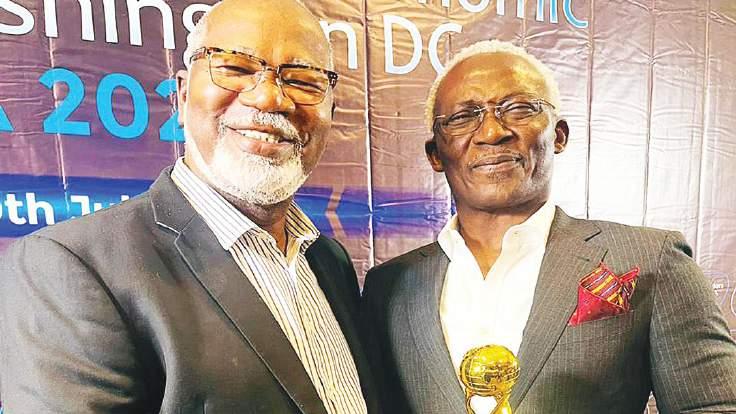
AFRICAN AMBASSADOR ECONOMIC FORUM IN WASHINGTON...
The President of the Territorial Council of Saint Martin, His Excellency Louis Mussington, congratulating the Managing Director/Editor-in-Chief of News Central TV, Mr. Kayode Akintemi, on the award at the Africa Ambassador Economic Forum in Washington DC, USA…recently
About 3.7m People Face Food Insecurity in Nigeria’s North East, ICRC Laments
The International Committee of the Red Cross (ICRC) has lamented that across conflict-affected areas of northeast Nigeria, more than 3.7 million people face food insecurity.
It stated that many of them were farmers, who once nourished their communities, but years of conflict have displaced families, restricted
their access to farmland and disrupted local food production.
According to a statement by ICRC, a community leader in Dikwa, Modu Umar said, “Right now, we face severe food shortages,” adding that some families were forced to walk long distances every day to collect firewood to sell, just to afford food.
“Farming is the only solution to hunger,” it stated.
In some communities, insecurity severely limited farmers’ movements.
“Some people trek three hours to reach their farms,” a 70-year-old farmer, Churi Ibrahim, from Gajibo, said.
He added that: “By the time you reach your farm, you’re already exhausted, and when you return home, it’s late.”
Despite these challenges, farmers persisted. “Even when you’re afraid, you have to go,” said Bintu Konto, a mother of five, insisting that, “If you don’t farm during the rainy season, you’ll have nothing to eat.”
As the lean season begins and food stocks dwindle, the pressure has begun to mount.
“This is when households must start purchasing food, but many
Police Retirees Protest Poor Post-service Entitlements, Demand Improved Welfare
IGP meets protesters, vows to address issues Bauchi govt inaugurates contributory pension commission, charges members on efficiency
of law and order.
Retired Police Officers in many parts of the country, yesterday, took to the streets to protest alleged abysmal pension entitlements paid to members after over three decades of law enforcement duties to the nation.
In Abuja, the retired officers, who took their protest to the Louis Edet House, Force Headquarters, and National Assembly Gate in the nation’s capital, ventilated their grievances to the Police authorities and leadership of federal lawmakers.
The protesting officers also demanded the removal of Police Pension from the contributory pension scheme.
The pensioners, who chanted solidarity songs, also carried placards with different inscriptions, including “Scrap Police Contributory Pension Scheme” and “We Need Our Full Gratuity”.
The elderly pensioners, who defied the early morning drizzle in Abuja, stood under it lamenting that their welfare and dignity had been neglected for too long.
Speaking during the protest, a retired Chief Superintendent of Police, CSP Manir Lawal, called on the government to exit police retirees from the pension scheme, describing the contributory pension scheme as exploitative and unjust.
“We are here to ask the government to remove us from the CPS. The pension scheme is exploitative and unjust. I am 67 years old. Many of us here are in our 60s and 70s.
“We have served this country faithfully and deserve to retire in dignity. This scheme has impoverished us. It is our right to demand better welfare after retirement,” he stated.
Human rights activist and convener of the #RevolutionNow Movement, Omoyele Sowore, joined the retirees in calling for urgent intervention from the federal government.
Addressing the crowd of protesters, Sowore called on the government to immediately recognise the sacrifices of Nigerian police officers and ensure their rights and entitlements are upheld.
Police operatives monitored the protest to prevent any breakdown
Earlier, the Police Service Commission (PSC), in a statement, said the reason for the protest was already receiving the attention of relevant government agencies.
The statement, signed by the Head of Press and Public Relations, Ikechukwu Ani, said, “The Commission says the intended protest, at a time when there is almost a consensus that the state/condition of some retired Police Officers deserves immediate consideration and improvement, is diversionary and in bad taste.”
Ani said the Chairman of the Commission, DIG Hashimu Argungu (rtd), had at several fora condemned the poor and discriminatory pension scheme for some categories of retired Officers and had called for a streamlined Police pension scheme.
In Cross River State, the aggrieved protesting retired policemen who defied the heavy rains, which started earlier in the day marched to the headquarters of the state police command at Diamond Hill in Calabar where they laid their complaints peacefully.
The protesting retired policemen,
who carried placards bearing different messages against the CPS, and the welfare scheme of retired, and serving policemen were led by Elder Ofem Mbang (DSP Rtd), presented a letter to the leadership of the police in the country, and the federal government containing their nine-point demand.
The letter addressed endorsed by Elder Mbang (DSP Rtd); CSO Obeten Uket (Rtd); SP Jarlath Abang (Rtd); DSP Daniel Ochang (Rtd); ASP Paul Udo-Inyang (Rtd), and four others and addressed to President BolaTinubu asked the federal government, and the police leadership to remove them from the CPS , describing it as obnoxious, and dehumanising.
From Ilorin, Kwara State, the protesters also alleged that the scheme has been fraught with challenges since its inception, and that retired officers who fell in the category of the pension platform should be exempted like those who rose to the position of Generals in the force.
The protesters, however, sought establishment of a Police Pension Board with sole responsibility of overseeing the pension matters of the police as applicable in other security agencies.
conflict-affected families can’t afford much,” Diana Japaridze, Head of the International Committee of the Red Cross (ICRC) office in Maiduguri, said. She added that: “They’re forced
to drastically limit their intake.”
The ICRC lamented that food insecurity was also fueling malnutrition, especially among children under five and pregnant or breastfeeding women.
Abure’s LP Faction Dismisses Adoption of Usman, Nwochocha for National Leadership
Chuks Okocha in Abuja
The faction of the Julius abure-led National Executive Committee (NEC) of the Labour Party (LP) has dismissed the “purported” ratification of Senators Nenadi Usman and Darlington Nwochocha, as Chairman and Secretary of an interim National Committee of the party as illegal.
Abure announced this after a NEC meeting of his faction held at the party’s National headquarters, Abuja, yesterday.
In the adoption of Usman last week, nine statutory members of the party’s NEC which had Abia State Governor, Alex Otti, his deputy, Ikechukwu Emetu, among others had on Friday met at the Transcorp Hilton Hotel, and ratified the Interim National Committee.
But Abure who chaired Monday’s NEC meeting, urged members of the public to discountenance the factional NEC and the resolutions there from.
While reading the communique after the meeting, Abure said, “The NEC Meeting was attended by members of the National Working Committee, National officers of the party, Sen. Datti Baba-Ahmed, Vice Presidential candidate of the 2023 General Election, State Chairmen, and Stakeholders of the party and other co-opted members of the National Executive Council as provided by Article 13 (A) of the Party Constitution.
“At the end of the meeting, the following resolutions were approved and adopted.
“The NEC in session after reviewing the purported NEC meeting held in Transcorp on Friday, the 18th of July 2025, condemned the conveners of the meetings and thereafter disassociate itself from the outcome of the so-called NEC meeting where they renamed their illegal Caretaker Committee set up in Umuahia last year as Interim National Working Committee.
“NEC notes that no matter how illegality is decorated it cannot be legal. Renaming the Caretaker Committee, Interim NWC does not remove its illegality.
“This sitting contravenes the Party’s Constitution. Article 14 (4) (B) gives powers to call meetings only to the National Secretary with the approval of National Chairman.
“The meeting also contravenes the provisions of Section 82 (1) (2) (a) of the Electoral Act 2022 which provides as follows: 82 (1) Every registered political party shall give the Commission at least 21 days’ notice of any Convention, Congress, Conference or meeting convened for the purpose of ‘’merger’’ and electing members of its executive committees, other governing bodies, or nominating candidates for any of the elective offices specified under this Act. Such notice must be given by the National Chairman and Secretary of the Party.
Acting Group Politics Editor DEJI ELUMOYE
Email: deji.elumoye@thisdaylive.com
08033025611 sms only
Awujale: Knowing When to Speak Truth to Power
James sowole, who reviews tributes on the life and times of the Paramount Ruler and awujale of Ijebuland, Oba Sikiru Kayode adetona, writes that he lived a life of courage and was ever ready to speak truth to power.
If only the dead could wake and react to tributes after breathing his last, late Awujale and Paramount Ruler of Ijebuland, Oba Sikiru Kayode Adetona, would have risen, beat his chest and score himself high for his deed while on earth.
Adetona, who ascended the throne of his forefathers at age 26 reigned for 65 years and answered the call of his creator on Sunday, July 13, 2023 at the of 91.
Tributes after his demise made many people, particularly those who never had encounters with him and young ones to want to know more about him.
Late Awujale was described as a monarch of uncommon candour, kindness, conviction and different from typical traditional ruler. He was bold in speech, democratic in orientation, and fiercely committed to the upliftment of his people.
A courageous and fearless traditional ruler, who always tell the truth to those concerned and ready to ruffle feathers no matter whose ox is gored and the likely consequences.
The late Awujale, demonstrated his good qualities at different times and these pitched him against the constituted authorities including the one that almost cost him his Obaship position 41 years ago before he finally joined his ancestors in 2025.
Like the traditional “gangan” drum in Yorubaland which faces two different directions at the same time, the late Awujale by providence, survived deposition due to the military takeover of Second Republic Government on 31st December, 1982.
On November 23, 1981, Governor Victor Olabisi Onabanjo of Ogun State signed a formal order suspending Adetona from office as the Awujale of Ijebuland until further notice.
The suspension, however, soon turned to a deposition, and the removal was scheduled to take effect on January 2, 1984.
But the Muhammadu Buhari coup of December 31, 1983, which toppled President Shehu Shagari’s civilian government, halted the plan. Buhari’s intervention inadvertently preserved the Awujale’s reign for another 41 years.
The late Awujale, who had survived many battles while alive, triumphed even in death as his remains were interred in the full glare of members of the public according to Islamic rites within his private residence located at Igbeba, Ijebu-Ode contrary to the age-long traditional practices.
As a devout Muslim, who did not believe that being a traditional ruler must affect one’s faith, Adetona was instrumental to the initiation and passage of laws concerning traditional rulers in Ogun State by the House of Assembly. A major aspect of the law, was the provision, which allowed monarchs in the state to be burried according to their religious beliefs and the wish of their family members.
The law also forbids certain traditional practices when a late monarch is being buried.
Though the provisions of the law had been generating controversies in the entire Yorubaland, the enforcement of the law started with Adetona, the initiator of the law before the Ogun State Government took over the process.
The tight security provided by men of the Nigerian Army, Nigeria Police, Department of State Services (DSS), the Nigerian Security and Civil Defence Corps (NSCDC) and the Ogun State Security Network (Amotekun), saved what could have caused confusion during the burial ceremony.
In actual fact, armed soldiers, were invited to evict traditionalists (osugbo), who came into the compound with their insignia of office, midway into the funeral programme.
In an e-signed tribute, President Bola Tinubu, extolled the virtue of the revered monarch.
He said, “The demise of Oba Adetona has left an enormous void within the traditional institutions in Yorubaland and Nigeria in general.
“Oba Adetona was a towering natural ruler who served his people with dignity, panache, class, and an unmistakable sense of duty.
“During his remarkable reign that witnessed tremendous progress and development in
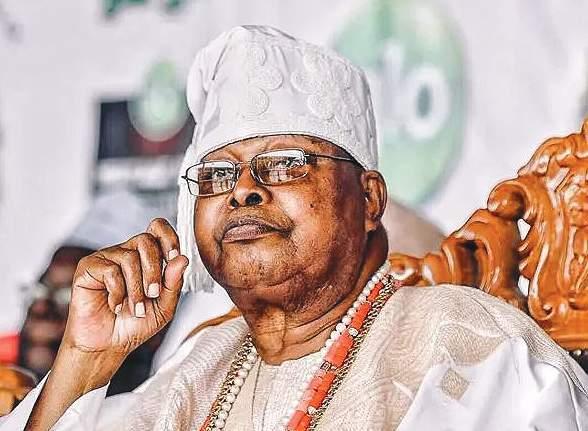
Ijebu-Ode and the entire Ijebuland, Oba Adetona provided uncompromising leadership to his people.
“In his over six decades on the throne, ascending at 26, Oba Adetona used his role as a foremost ruler to advance the cause of progress and national unity. In a time of national crisis and uncertainty, he stood firmly as a voice of reason.
“I enjoyed an excellent personal relationship with Kabiyesi. I will forever cherish our time together.
“He was an honest arbiter, confidante, and reliable leader without any guile. I found his company comforting, wisdom enriching, and candour empowering.
“Oba Adetona’s sterling qualities of service, philanthropy, investment in education, and research through the School of Postgraduate and Research Studies in Governance at the Olabisi Onabanjo University, Ago-Iwoye, will be enduring monuments in his memory”.
Speaking with newsmen during the burial, the former Governor of Ogun State, Senator Gbenga Daniel, described the late monarch, as a fearless person, who say it as it is irrespective of whose
ox is gored.
He said, “Without any doubt, the situation in Ijebuland cannot be the same again because the people had been used to paternal support of the great grand father, who had navigated the land successfully and the people of this community has no choice than to come together to continue from where Kabiyesi has left off. We pray that God should grant repose for his soul.
“It is common knowledge that in Kabiyesi Awujale, you have a forthright personality, who can speak truth to all at a time, who can be described as fearless who abhors people telling lies and who is very straight forward to a fault. Kabiyesi is not used to anybody who is diplomatic. He says it as it is. At the end of the day, in the course of that, he garnered his own detractors. People have said that he successfully won all the battles. He was strong from the beginning to the end. I guess that the testimony as to the kind of life he lived was that he was indeed a forthright personality.”
Also in a heartfelt tribute, Chairman of Odogbolu Local Government and son of the late Lieutenant General Oladipo Diya, Hon. Babatunde Diya, said the family, would ever remain grateful to the late monarch for the role he played during the travail of his father under the regime of the late General Sani Abacha.
late Awujale was described as a monarch of uncommon candour, kindness, conviction and different from typical traditional ruler. He was bold in speech, democratic in orientation, and fiercely committed to the upliftment of his people. A courageous and fearless traditional ruler, who always tell the truth to those concerned and ready to ruffle feathers no matter whose ox is gored and the likely consequences.
The Council Chairman like others, praised late Oba Adetona’s courage and integrity, describing his passing not just as the end of a royal reign, but the silencing of a fearless voice that stood for justice when it was most dangerous to do so.
“Kabiyesi, the news of your passing struck not just a chord of sorrow, it awakened deep memories of honour, courage, and gratitude. Your transition is not merely the end of a royal reign; it is the silencing of a courageous voice that once stood up for my family.
“When my father, Lt. General Oladipo Diya, faced persecution during one of Nigeria’s darkest hours, many chose silence. Many walked away. But your Majesty, you stood firm. You raised your royal voice not for favour or fame, but for justice and truth.
You brought comfort in a time of betrayal, light in an hour of national gloom, and protection when danger circled close. You reminded the world that the Ijebu people do not turn their backs on their own.”
Diya asserted that the family would never forget the late monarch’s unwavering support.
“Today, as I serve as Chairman of Odogbolu Local Government, I do so bearing not only the name of my father but also the legacy of a king who stood by us in our greatest trial. Your courage paved the way for our restoration. Your honour preserved our dignity. Your love made room for our future.
“Kabiyesi, you were more than a monarch; you were a moral compass in a time of turbulence. A shield when the winds howled. A pillar when the roof shook. Your reign defined nobility in its highest form not just through regalia, but through righteousness.
“I mourn you not only as a subject of Ijebuland, but as a son whose destiny you helped preserve. I carry that gratitude in my heart, and in my service, I pledge to uphold the values you embodied: justice, truth, and loyalty.
“Your voice may be still, but your legacy thunders on. Your body may rest, but your spirit stands watch. The Iroko has fallen, but its shade shall cover us for generations. Rest well, Kabiyesi. You stood for us, now we rise in your honour.”

MAIN TRUST MFB’S ACQUISITION…
L-R (standing): Main Trust MfB Legal Adviser, Mr. Kamoru Lawal; Mr. Emmanuel Akinosun; Chief Operating Officer, WealthBridge Group, Mr. Babatope Davies; Directors, Main Trust MfB, Mr. Olufemi Okanlawon, Mr. Bamidele Alabi, Mr. Adesoye Olatunji; (Sitting) Director, Main Trust MfB, Mr. Abel Ajala; Group Chief Executive Director, WealthBridge Financial Services (Holdings) Limited, Mr. Ahmed Lawal; Ms. Moyosoreoluwa Olajuyigbe of Detail Solicitors, and Director, Main Trust MfB, Mr. Ayobami Oluwarinu, during the official acquisition of Main Trust Microfinance Bank Limited by WealthBridge Financial Services (Holdings) Limited in Lagos...recently country.
Again, UBEC Laments as N250bn Matching Grant Remains Unutilised by States
Kuni Tyessi in abuja and Wole Ayodele in jalingo
Again, the Universal Basic Education Commission (UBEC) has lamented N250 billion intervention funds disbursed to state governments which are still being retained as unutilised in the coffers of the 36 States Universal Basic Education Boards (SUBEBS) & Federal Capital Territory (FCTUBEB).
It said the basic challenge is still not only accessing the UBE matching grant, but failure of some of the state governments to properly utilise the fund for the purpose of development of infrastructure and improvement on the teaching and learning conditions in schools across the
Court Orders Arrest of Woman over False Rape Claim against Husband
Wale Igbintade
A Lagos High Court has ordered the arrest and production of Rahmat Omolara Animashaun over allegations of making false accusations of sexual assault against her estranged husband, involving their two minor children.
The order followed an investigation report by the Nigeria Police and legal advice from the Directorate of Public Prosecutions (DPP), Lagos State Ministry of Justice, both recommending her prosecution for multiple criminal offences.
Justice I.O. Harrison of the Lagos
State High Court issued a bench warrant for Ms. Animashaun’s arrest after she failed to appear in court on July 9, 2025, in a pending criminal case marked LD/25997C/25, filed by the State of Lagos.
According to the DPP’s legal advice, Ms. Animashaun faces charges of perjury, false accusation, making false statements to a public officer with intent, and attempting to pervert the course of justice. These offences are punishable under Sections 86, 95, 96, and 97(3) of the Lagos State Criminal Law, Chapter C17, Volume 3, Laws of Lagos State, 2015.
Afenifere Chieftain Decries
Lack of Political Will in Tackling Security Challenges
Sylvester Idowu in Warri
A chieftain of Afenifere, the Yoruba socio-political group, Olu Pessu, has decried the lack of political will by the federal government to tackle the growing insecurity in the country.
He questioned the All Progressives Congress (APC) of its promise to secure Nigeria during the last political campaign.
Pessu, a political activist and chairman of Olu Pessu Foundation based in Delta State, in a statement issued in Warri yesterday, expressed sadness that
Nigerians were dying daily, not because of poverty or high cost of living but that of insecurity that pervades the country.
He noted that though the federal government is boasting of infrastructural development across the country but wondered who will benefit such gesture in an atmosphere of insecurity.
Pessu declared: “Dangerous men moved into the country for over a decade now with light weapons running over communities killing people, mostly women and children, renaming communities.
Female Student Arrested for Faking Own Kidnap
David-Chyddy Eleke in awka
A female student of Enugu State University of Science and Technology (ESUT), Ms. Chinecherem Nwaokoye, has been arrested by operatives of Anambra State Police Command for allegedly staging her own kidnap.
Nwaokoye was arrested alongside her boyfriend, Chinecherm Aronu, with whom she staged the fake kidnap.
She told the police operatives that she staged the kidnap after watching a movie, and that her plan was to extort money from her family for her boyfriend to start a business.
A statement issued by the state Police Command’s spokesperson, SP Tochukwu Ikenga, which revealed this, added that they first demanded N10million ransom from the family but later reduced it to N3million.
The Executive Secretary of the Commission, Aisha Garba, disclosed this yesterday while declaring open a three-day Financial Management Training organised for fund managers of State Universal Basic Education Boards (SUBEBs) in the 36 states and FCT, including SUBEBs
Directors of Finance and Accounts, Heads of Internal Audit and Matching Grant Desk Officers on efficient and effective management of the UBE intervention funds.
The theme of the training programme is “Efficient and Effective Management of UBE Intervention Fund, a key to Successful Basic Education Service Delivery.”
Garba, who was represented by the Deputy Executive Secretary (Technical), UBEC, Razaq Olajuwon Akinyemi, highlighted the importance of the training programme, saying the theme resonates with the commission’s commitment to continuous improvement in the management of basic education funds in respective states and ensuring that all financial resources allocated for UBE delivery is properly managed and effectively utilised for intended purposes. The UBEC boss revealed that between January and June, 2025, the sum of N92.4 billion being UBE matching grant has been accessed by 25 states and FCT.
Itsekiri Leaders Demand Ward Review, Vow to Halt Oil Operations
Wale Igbintade
Leaders of the Itsekiri Ethnic Nationality have strongly rejected the Independent National Electoral Commission’s (INEC) proposed ward delineation in the Warri Federal Constituency, describing it as fraudulent, discriminatory, and a grave threat to their political and economic survival.
NRC Debunks
Sunday Okobi
The Nigerian Railway Corporation (NRC) has debunked a video currently circulating on social media, particularly Facebook, purporting to show a train coach on fire.
In a statement issued and made available to journalists yesterday by the corporation Chief Public Relations Officer,
In a statement signed by six prominent Itsekiri leaders, Messrs Emiko Oghomienor, Ofoyeju Izuagie, Appearance Afejuku, Samuel Meyiwa Khalil, Wilson Gave, and David Mamah, the group accused INEC of conspiring to erase the political presence of the Itsekiri people in their ancestral homeland.
They have vowed to resist the
proposal by every legal means and threatened to shut down the operations of international oil companies (IOCs) and local oil firms operating in their domain if the injustice is not immediately addressed.
“The entire Itsekiri areas in Warri South-West and Warri North, which originally had six wards each, have now been unconscionably reduced to five
and eight wards respectively, while other ethnic groups saw disproportionate increases,” the statement read. The group specifically condemned the actions of three INEC officials, Dr. Baba Bila, Commissioner Ken, and Professor Rhoda Gumus, accusing them of bias and calling for their immediate removal from the process.
Video of Train Fire, Says Incident Occurred 3 Yrs Ago
Callistus Unyimadu, the NRC management clarified that the incident in the video occurred over three years ago along the Warri–Itakpe rail corridor.
The statement said: “The attention of the NRC has been drawn to a video currently circulating on social media, particularly Facebook, purporting to show one of our train coach on fire. The video is not recent
and does not reflect the current state of operations or safety on any of our train services.
“We wish to categorically clarify that the incident in question occurred over three years ago along the Warri–Itakpe rail corridor.
“We urge the public to desist from sharing outdated or misleading content, as such actions only serve to incite unnecessary fear, panic, and misinformation. The circulation of false or outdated information undermines public trust and national development and should be strongly discouraged.”
The NRC, therefore, reiterated commitment to safety, comfort, and improved service delivery for all Nigerians, adding: “We continue to enhance our operations in line with international best practices and global safety standards.
WealthBridge Group Acquires Main Trust MFB to Deepen Financial Inclusion
Kayode Tokede
Nigeria’s financial services emerging powerhouse, WealthBridge Financial Services (Holdings) Limited (www.wealthbridge.com.ng), has announced the successful completion of the acquisition of Main Trust Microfinance Bank Limited, subject to
Central Bank of Nigeria (CBN) regulatory approval.
The goal is not merely to expand WealthBridge’s market presence, but to fundamentally enhance the quality of service to the bank’s existing and potential customers.
Speaking on the acquisition, Group Chief Executive Officer of WealthBridge Financial Services, Ahmed Adekunle
With this acquisition, WealthBridge is set to redefine the microfinance banking experience by transforming Main Trust MfB, a microfinance bank established in 2012 into a modern, technology-driven institution tailored to the realities of underserved and emerging customer segments.
Lawal said: “We are excited to welcome Main Trust Microfinance Bank into the WealthBridge family. This acquisition strengthens our ability to serve the grassroots economy and accelerates our mission to deliver inclusive, technology-driven financial services to millions of Nigerians.
Adeleke Flags Off Osogbo-Ikirun - Ila Odo, Ila Orangun Road Dualisation
Yinka Kolawole in Osogbo
Governor Ademola Adeleke has affirmed that his pact of service with Osun people is unbreakable and sustainable, repeating his vow to deepen the service relationship with the people of the state.
The governor who spoke
yesterday at Ila Orangun at the flag-off of Ila Orangun township road dualisation and that of Osogbo- Ikirun - Ila Odo, Kwara state boundary.
Also, the Chairman and Chief Executive Officer of Sammya Nigeria Limited, Adigun Sammy Oreoluwa ,stressed that “I want to express my readiness to
provide high quality and the best Road infrastructure for the government and the people of Osun State in record time.”
Adeleke declared that he is committed to delivering on his five point agenda and other electoral promises, stressing that Ila Orangun and other cities are being positively
touched by his administration. The governor narrated that his administration has so far completed the reconstruction, rehabilitation and renovation of over 200 kilometers of roads, while several dualisation and flyover projects are at various stages of completion.
Interswitch Advances Propertytech Discourse at Lagos Real Estate Fest
Chinedu Eze
Interswitch, leading African technology company focused on creating solutions that enable individuals and communities prosper across Africa, has reaffirmed its commitment to
cross-sector innovation as an Associate Partner at the sixth edition of the Lagos State Real Estate Fest in Lagos. Through strategic participation and thought leadership, Interswitch played a significant role in shaping conversations
around the future of Propertytech (also referred to as ‘Proptech’) and the role of financial infrastructure in transforming Nigeria’s real estate ecosystem.
Themed, “The Business of Real Estate: Staying Innovative in a Changing Landscape,” the event brought together a range of stakeholders, including property developers, investors, government representatives, urban planners, project financiers, architects, and technology providers for highlevel discussions on the future of Nigeria’s real estate industry.

nDphC CoURTESY ViSiT To niSo hEADQUARTERS...
L-R: Executive Director, Legal Services/Company Secretary, Niger Delta Power Holding Company (NDPHC), Dr. Steven Andzenge; Managing Director, Nigerian Independent System Operator, (NISO), Engr. Abdu Mohammed Bello; Managing Director/Chief Executive Officer, NDPHC, Engr.. Jennifer Adighije; and Executive Director, Finance & Account, NDPHC, Mr. Omololu Agoro, during a courtesy visit by NDPHC to NISO headquarters in Abuja ...recently.
TUESDAY
ABATI

Olukoyede And The New EFCC
Last Friday, July 18, the incumbent Chairman of the Economic and Financial Crimes Commission (EFCC), Ola Olukoyede was in Lagos to hold a sensitization programme on Naira Abuse, at the Colonades Hotel, Ikoyi, Lagos. What was reported in most newspapers and other platforms, was the EFCC czar’s disclosure that 18 currently serving Governors are under investigation by the EFCC, and that as soon as these Governors are out of office, the EFCC will pounce on them. He hid the juicy part of the story by not disclosing names. Nigerians would have loved to know who these suspected thieving Governors are, at a time the people are groaning under the effect of petrol subsidy removal, high cost of living and the state governors are getting more money than they ever did.
The EFCC has the powers to investigate sitting Governors, Deputy Governors, the President and the Vice President, but they are covered by Section 308 of the 1999 Constitution which grants them immunity from prosecution while in office. The intendment of Section 308, is to prevent this category of public officials from being distracted by a plethora of petitions that they may need to respond to. This is however not the case in every part of the world. In countries like South Africa, Israel, the United States, Brazil and France, not even the President is protected from prosecution. In March 2021, for example, former President of France, Nicolas Sarkozy was sentenced to a year in prison for corruption and influence peddling. In 1974, US President Gerald Ford lost his position because of clear, irrefutable evidence of wrong-doing in the Watergate scandal. In South Korea, sitting and former Presidents have been sent to jail, the latest being President Yoon Suk-Yeol, and before him, President Lee Myung-bak (MB). In Brazil, the inimitable President Luiz Lula da Silva spent time behind bars (2017- 2019). The principle is that nobody is above the law, and that misdeeds at any level must not go unpunished. Nigerians would want a review/ amendment of Section 308 of the 1999 Constitution to hold public office holders, all of them, regardless of position, accountable. It is most unfortunate that this is not a major issue in the ongoing discussions about constitutional amendment. It is unthinkable that any President, former or incumbent would be convicted in Nigeria. The immunity at that level is for life. Olukoyede had disclosed that the typical pattern for serving Governors is to run away before the expiration of their right to immunity. We are all witnesses to the fact that it is standard practice indeed for Governors to “japa” and not even wait to hand over to their successors. By simply serving notice, it is not impossible that the guilty among the Governors would be afraid and try to cover their tracks. The media is wont to choose what will sell the news, and perhaps it is juicier to focus on the fact that 18 serving Governors are being watched closely. The main substance of Olukoyede’s sensitization programme however, was Naira Abuse, an event organised in “close concert with the Central Bank of Nigeria”. Before then, Olukoyede’s EFCC had set up a Task Force on Dollarization and Naira Abuse to address “some of the practices that threaten the value of the currency” . Within the purview of Section 21 of the CBN Act, 2007, all acts that constitute Naira abuse are punishable for a term of not less than six months or a fine of not less than N50, 000 or both. These include the spraying of the Naira, dancing on it,
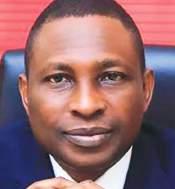
marching and stepping on it, mutilation or defacement, and the selling or trading of Naira notes. This latter is a very common practice in Nigeria - the banks never give out new notes but every weekend at parties, naira merchants sell crisp national currency for profit, making us wonder whether there is a parallel Mint in the country where the Naira is printed.
Ola Olukoyede, has made the protection of the Naira, a major point of campaign. It is on record that with him as EFCC Chairman, many celebrities have been called to question for abusing the Naira. There is the case of Idris Okuneye, aka Bobrisky, who purportedly spent six months at the Ikoyi Correctional Centre for spraying the Naira at a public gathering. Bobrisky pleaded guilty. Pascal Okechukwu, popularly known as Cubana Chief Priest was also arraigned in April 2024, but he pleaded not guilty. His own lawyers even went as far as questioning the jurisdiction of the court and the prosecutorial powers of the EFCC. Bobrisky was convicted, Cubana Chief Priest escaped with a fine of N10 million. Both men have not abused the Naira since then. Bobrisky is in fact so beaten and sober that he/she in fact took the safe option of lying low, disappearing from the social scene. Who would have thought that the famed “Mummy of Lagos” having gone to the college of imprisonment would calm down? As recently as May 2025, one Okoli Frank Emeka was sentenced to six months imprisonment for marching on the Naira at Al Moruf Garden, Isheri Olofin, Lagos. The same month, one Kelly Okungbowa, aka Ebo Stone was arraigned before a Federal High Court sitting in Benin on a two-count charge of Naira abuse. In Kaduna, a TikToker and content creator, Muhammad Kabir Sa’ad was arrested and charged to court for mutilating the Naira. Kabir dared the EFCC in a video online to come and arrest him. They did. But the arrests were not limited to the average, struggling Nigeria. Earlier in January 2025, two sons of billionaire businessman, Razaq Okoya – Wahab and Raheem Okoya were invited for questioning for spraying bundles of N1, 000 Naira notes in a promotional clip for Raheem’s new song, “Credit Alert”. In May 2025, the EFCC also
summoned the celebrated actress, Iyabo Ojo, self-styled Queen Mother, for the abuse of the Naira during her daughter, Priscilla’s wedding to the Tanzanian artiste, Juma Jux in Lagos. Iyabo Ojo was lucky, and she has not been seen anywhere spraying Naira notes again. Another actress, Oluwadarasimi Omoseyin was not so lucky. She was sentenced to six months imprisonment for spraying and tampering with the Naira at an event at Monarch Event Centre, Lekki, Lagos on January 28, 2023. In May 2025, the popular comedian and actor, Ayo Makun was also invited for questioning. He was so happy that the EFCC pardoned him, he issued a statement in which he said he had learnt his lessons. Despite all these cases, Nigerians continue to abuse the Naira contrary to Section 21(1) of the CBN Act, 2007. What the EFCC seems to have achieved is a drastic reduction in the obscene spraying and mutilation of the Naira that was the norm, and the effrontery of the partying crowd. The abuse started with the fun-loving people of the South West, the Yoruba who enjoy spraying the Naira lavishly as a show of class and wealth but the behaviour soon spread to other parts of the country, particularly the East where the Igbo nouveaux riche have added spectacular colour to the spraying of the Naira and other currencies with the aid of a hand-held spraying gun, and accustomed sass. I once deplored this practice in a controversial article titled “Obi Cubana and the Oba Funeral”, (ThisDay, July 20, 2021). But neither this nor any other intervention has encouraged Nigerians to obey the law. Their standard excuse as articulated by Deyemi Okanlawon, an actor, is that the EFCC should focus more on other issues rather than the spraying of the Naira which is “a cultural problem”. It is perhaps for cultural reasons that many Nigerians have continued to spray the Naira, but they have found a way of taming the law. It is common these days to find celebrants carrying cartons or boxes into which money is deposited. Quite a number of thick-headed persons still spray and abuse the Naira at parties though, stubbornly insisting that they have the right to do what they wish with their money.
Ola Olukoyede responded to this cultural argument as follows: “there is nothing cultural about spraying and stamping on the Naira or throwing wads of the currency in the air at social events. Nowhere in the world is such despicable practice tolerated. Nobody who works hard to earn money will go to social events and stamp on the currency.As a salary earner myself, it is unimaginable for me to go out andstartthrowingmyhard-earnedsalaryintheair!”
The EFCC chair added that the Naira is a symbol “of our sovereignty and economic might” whose integrity must be protected. Its abuse is a punishable offence. He further cited the example of a former Governor, who after his tenure in office, celebrated his birthday in a hotel in London. The said Governor sprayed 50 and 10 bills in pounds sterling. The hotel manager having never seen such a thing in his life, called 911 and summoned the Metropolitan Police. The former Nigerian Governor was arrested and the police wanted to put him in an ambulance. According to the EFCC Chair: “Thepeople–hisfriends,colleagues,andtwo governors–whowenttoLondontocelebratewithhim hadtointervene.Theysaidtheex-Governorwasnota madmanbecausethehotelmanagerthoughthewas mad.” It should be considered quite interesting that what is considered normal in Nigeria is interpreted
as pure madness in other countries. Olukoyede has brought an evangelical fervour to the fight against economic and financial crimes. He is, by the way, a Pastor in a Pentecostal church. What he has achieved is to remind his audience and the larger Nigerian community that ignorance of the law is not an excuse, and that no one is above the law. He also drew attention to what the law says. He is a lawyer. In attendance at the Colonades Hotel event were musicians, actors, event organizers, influencers, content creators, hospitality stakeholders, financial sector representatives and the general public. Some of the celebrities in attendance included King Alabi Pasuma, the Fuji artiste, MI, Ill Bliss Goretti, Osas Ighodaro, Pretty Mike, Terry Apala, Mercy Aigbe, Kazim Adeoti, Funke Bucknor-Obruthe, Anto Lecky and others. Musicians and event organizers depend on the spraying of Naira for extra patronage and encouragement. What is new is the EFCC’s attempt to invest heavily in public sensitization. The agency also has an anti-corruption radio station, EFCC 97.3 FM in Abuja, whose broadcast is live streamed through the EFCC website, www.efcc.gov.ng. Ola Olukoyede rose through the ranks within the EFCC to get to the apex position, but other Chairmen before him did not bother as much about public sensitization. Section 6(p) of the EFCC Establishment Act, 2004 as amended, states among the functions of the agency: “carrying out and sustaining rigorous public and enlightenment campaign against economic and financial crimes within and outside Nigeria.” Olukoyede is giving effect to this to a higher degree like no one else before him. Past Chairmen have been accused of allowing the EFCC to be used as a tool of political intimidation, and witch-hunt as has been robustly evidenced in two books by Muhammed Bello Adoke viz: Burden of Service: ReminiscencesofNigeria’sFormerAttorneyGeneral (2019) and OPL245: The Inside Story of the $1.3 bn Nigerian Oil Block (2025). This is not the case with Ola Olukoyede. But he has also had his own share of criticisms as in for example, Steve Osuji’s “EFCC’s alarming impunity” (July 10, 2025) which has attracted a rejoinder in a piece titled “Campaign of calumny against EFCC” (Punch, July 21, 2025) by Dele Oyewale, the EFCC spokesperson. Last Friday, the EFCC Chair painted a picture of the achievements of the EFCC under his watch, denying any charge of impunity. To be fair, there has been relatively less hysteria in his campaign against corruption. He regards the battle as a collective responsibility. He wants an all-of society-approach. It will be recalled that he was the first EFCC Chairman to admit publicly that there is corruption even within the EFCC. In 2024, Olukoyede sacked 27 of his own men for misconduct and fraudulent activities. He also ordered a probe into an alleged fraud of $400, 000 linked to a sectional Head of the EFCC. But perhaps what is more remarkable about the EFCC these days, is that there have been no serious allegations that the agency is being used for political vendetta. The credit for this belongs to Olukoyede, and President Bola Ahmed Tinubu who has given him the free hand to do his job, the best way he understands it. But will he win the battle against Naira abuse? The best that he can hope for is limited success. The madness of Naira plunking seems to be a genetic affliction among Nigerians. He would be better off finding a cure for it. He is doing well.
